

£NIL
ADVANCE PAYMENT

Ford C- MAX Zetec with rear parking sensors and SYNC 3 DAB Navigation System from only £Nil* Advance Payment. To find out more, visit ford.co.uk/motability o r call 0345 60 40 019.
TOGETHER WE GO FURTHER
Official fuel consumption figures in mpg (l/100km) for the Ford C-MAX Zetec 1.0T EcoBoost 100PS: urban 43.5 (6.5), extra urban 56.5 (5.0), combined 50.4 (5.6). Official CO2 emissions 127g/km.
The mpg figures quoted are sourced from official EU-regulated test results (EU Regulations (EC) 715/2007 and (EC) 692/2008 as last amended), are provided for comparability purposes and may not reflect your actual driving experience. For more information and most up-to-date data, please see the price list at www.ford.co.uk/motability. Data correct as of 1st April 2018.
*£Nil Advance Payment available only on Ford C-MAX Zetec 1.0T EcoBoost 100PS Petrol Manual. SYNC 3 DAB Navigation System is subject to availability. No cash alternatives are available. This programme is subject to the standard conditions of the Motability Scheme hire agreement. Full written details and quotations available on request from a Ford Authorised participating Dealer of Motability Operations Limited. Motability Scheme vehicles are leased to customers by Motability Operations Limited. Motability Operations Limited is authorised and regulated by the Financial Conduct Authority under reference number 735390. To qualify you must be in receipt of the Higher Rate Mobility Component of Disability Living Allowance (DLA), the Enhanced Rate Mobility Component of Personal Independence Payment (PIP), the War Pensioners’ Mobility Supplement (WPMS) or the Armed Forces Independence Payment (AFIP) and applications must be made with participating dealers between 1st April and 30th June 2018. Prices are correct at time of print, are subject to availability and may change.


From William and Kate to Marilyn Monroe, these are the most famous balcony moments TRAVEL
Tamara Hinson visits Rwanda and discovers a country determined to rebuild in the face of devastation

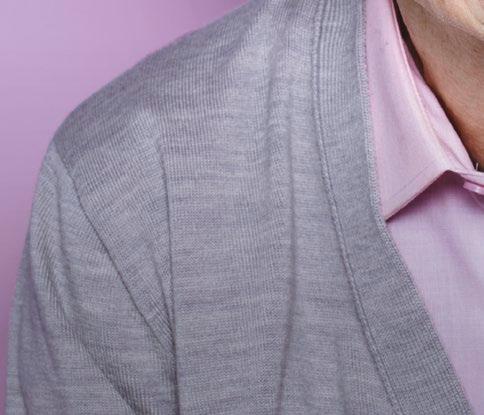

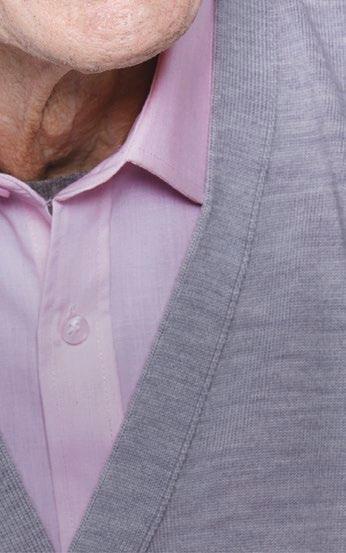
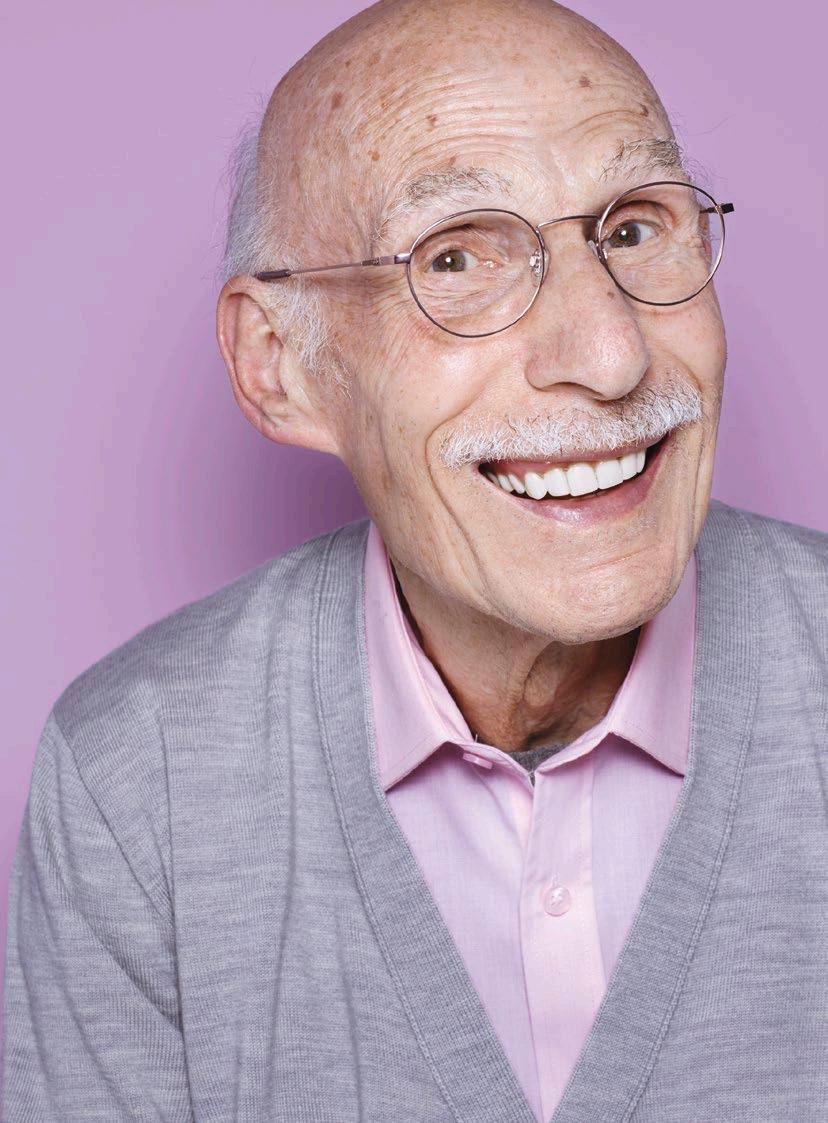

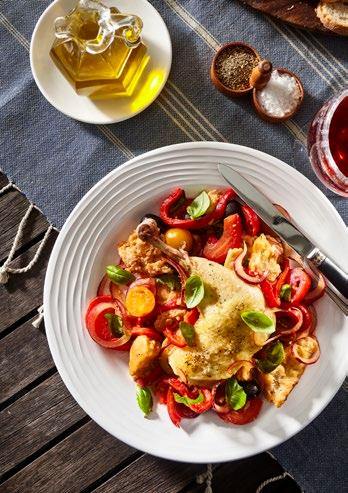















By the time you reach 60 your eyes need 3 TIMES as much light to see clearly as they did when you were 20. 30 days risk free home trial


As you age, less light reaches the retina and it’s this that transmits the visual image to the brain. So whether you wear glasses or not, reading for any length of time can become a struggle without the right amount and type of light. Our top of the range High De nition Light has been specially designed to closely mirror the same spectrum of light waves as daylight. It’s this that gives it its superb clarity and colour rendition transforming your ability to read in comfort once more.


Special Offer Purchase a Serious Light and get a FREE Serious Compact Light worth £150. Quote Promotion Code 5269 when ordering by phone or online.


SENIOR EDITORS Anna Walker, Eva Mackevic
EDITORIAL ASSISTANT Jessica Summers
ART DIRECTOR Richard Cooke
ADVERTISING Jigs Pankhania
MARKETING Sarah Hughes
FINANCE MANAGER Irving Efren
TRUSTED MEDIA BRANDS INC (USA)
President and Chief Executive Officer
Bonnie Kintzer
Vice President, Chief Operating Officer
International
Brian Kennedy
Editor-in-Chief, International Magazines Raimo Moysa
WE PAY...
£50 for the star letter and £30 for regular letters.
Email readersletters@readers digest.co.uk or go to readers digest.co.uk/contact-us
WE ALSO PAY...
£30 for the true stories, anecdotes, jokes in Laugh! and You Couldn’t Make It Up…, and contributions to end-of-article fillers and My Great Escape.
Email excerpts@readersdigest.co.uk or go to readersdigest.co.uk/contact-us
SORRY!
We cannot acknowledge or return unpublished items or unsolicited article-length manuscripts. Do not send SAEs. Article-length stories, poetry and cartoons are not requested.
CUSTOMER SERVICES
Contact Customer Services for renewals, gifts, address changes, payments, account information and all other enquiries. Call 0330 333 2220* or email customer_service@readersdigest.co.uk
TALKING MAGAZINES
Reader’s Digest is also available in audio and accessible etext editions from RNIB Newsagent, for blind and partially sighted readers. Call the RNIB Helpline on 0303 123 9999 or visit rnib.org. uk/newsagent
SUBSCRIPTIONS
Visit readersdigest.co.uk/subscribe or write to: Reader’s Digest, FREEPOST: WARNERS GROUP (READ). UK: £39.99 a year. Republic of Ireland: €59.99 a year. Prices include delivery. For gift subscriptions, contact Customer Services.




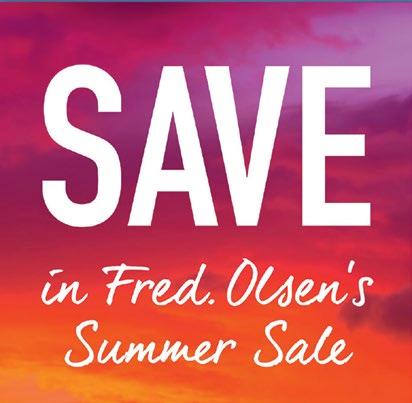


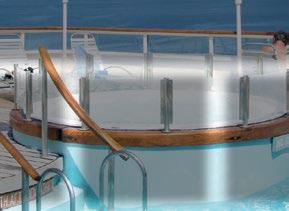


In This Issue…

Reader’s Digest has a long honoured tradition of telling great stories, and our annual 100-word-story competition sees our readers take up that mantle themselves. This month brings another of our competitions to a close—and what a year it’s been. Entries have poured in in their thousands, and we’ve thoroughly enjoyed reading each and every one. So many of you were influenced by the current political landscape—we weren’t short of stories on Trump or Brexit—while others focused on the delights or tragedies of the every day. Turn to p84 to read the work of our finalists, and discover which tiny tales you’ve voted your winners.
Anna
Music fans, you’re in for a treat this month! On p28 you’ll find an interview with the iconic Greek singer, Nana Mouskouri, who talks in vivid detail about her childhood in war-torn Greece, as well as her fascinating career that includes encounters with the likes of Quincy Jones and Maria Callas. Then, waltz your way over to p20, where the violin superstar André Rieu shares some incredible stories from his extravagant tours, the eccentricities of his day-today life and his magical marriage to the love of his life. And once your music cravings are nourished, you can tend to your poetry ones on p74 where we take you through the corners of Britain that inspired some of the most beautiful verses this country’s ever produced.
Follow us
facebook.com/readersdigestuk
twitter.com/readersdigestuk
You can also sign up to our newsletter at readersdigest.co.uk
Reader’s Digest is published in 27 editions in 11 languages

Over to You
LETTERS ON THE APRIL ISSUE
We pay £50 for Letter of the Month and £30 for all others
LETTER OF THE MONTH...
I haven’t read Reader’s Digest since I was a teenager, thumbing through my dad’s copy with concealed interest, as it wasn’t considered a “cool” read by my peers.
Fast forward to the present day. I was looking through the multitude of magazines at my local supermarket and I noticed Bryan Cranston’s face on the cover of your April issue. I decided to give it another try.

I am hooked. The article on Bryan was an eye-opener, I had no idea he had such a tough upbringing. There were so many excellent articles; I especially enjoyed Olly Mann’s humorous take on classical music, Max Pemberton’s “In a Silent Way” highlighting the impact of mental illness and loved “Think like a Toddler.” I agree that we should never forget our inner child. I still think I’m 12 sometimes, despite the mirror telling a different story. Well done, Reader’s Digest, you have another fan!
Deborah Tatum, West SussexMEMORY TRICKS
The article “Secrets to a Smarter You” made for interesting reading. Tips on improving the memory can help so many people. Why is it that as years roll by, and this faculty fades, names can be the first to give trouble? This may cause embarrassment. It’s easy to remember that a carrot is a carrot or a book is a book, so why should it be
difficult to recall Jim as Jim or Ruth as Ruth? A ploy that sometimes helps is to mentally scan through the alphabet until the letter “J” possibly jolts the old brain to produce the wanted name as “Jim.”
But take great care never to get into the situation where one has to introduce two friends, whose names are held in doubt. Rather, have a sudden coughing fit!
 Sheila Chisnall, Devon
Sheila Chisnall, Devon
FIGHTING LONELINESS
I was saddened to read Max Pemberton’s article, “In a Silent Way”. Not only was it a poignant reminder of the impact mental health has on people’s lives, but it also illustrated the crippling loneliness and isolation so many suffer from on a daily basis.
I wonder how many of the people we pass on the street day to day are suffering in silence, longing for someone to reach out to them but unable to reach out themselves?
Many of us could make a difference if we began to respond to strangers with kindness instead of fear and judgement; if only with a simple smile or exchange of words. The article has certainly encouraged me to interact more with strangers.
Juliet Sims, HampshireLIFE IS LIKE A MUSICAL
It was like a musical in itself reading about Sir Andrew Lloyd Webber’s story of his phenomenal rise to fame in “I Remember.” His contribution to the world of music is second to none and, after being reduced to tears himself during one of his musicals, it also reveals his own sensitivity and the ability to make others similarly weep.
Life is nothing without music, especially when a crescendo of notes and chords blend harmoniously with the voices of those talented singers in a theatrical setting, which never fails to reach deep into the hearts of so many of us.
Peter Fitzpatrick , Lancashire



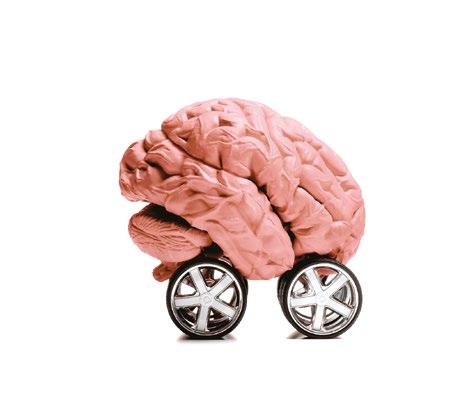
DOCTOR’S ORDERS
AISLE REMEMBER
I very much enjoyed the article on memory training and found much of the advice helpful.
When it comes to shopping lists, though, instead of imagining balancing a package of cheese on my head, an egg on my nose and a bottle of milk on my shoulder, I just write, “CHEESE, EGGS, MILK” into my phone with the rest of my requirements. It works fine (unless, of course, I forget to take my phone with me to the shops).
Maggie Cobbett, North YorkshireI have really enjoyed reading the article on “36 Things Doctors Do to Protect Their Hearts” in the April edition of Reader’s Digest. It was easy to read and understand—and the name of each doctor below their paragraph added solid validation to the suggestions.
I will keep these pages to look at in the future. A medically approved article that begins with a recommendation to eat eggs and get eight hours of sleep a night, and ends with advice to have lots of sex and eat dark chocolate has to be welcome advice on how to live! Brilliant.
Lucy Pesaro, Middlesex
Send letters to readersletters@readersdigest.co.uk
Please include your full name, address, email and daytime phone number. We may edit letters and use them in all print and electronic media.







DEFINED BENEFIT PENSIONS





















Transferring away from a defined benefit pension might seem wise, especially with cash incentives on the table, but independent financial advice is the only way to know if it’s right for you









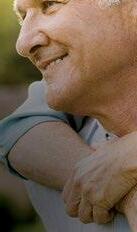

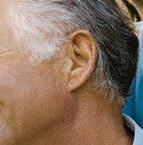









Once the most common type of pension, defined benefit pensions are rare outside the public sector. Usually based on how long you’ve been with your employer and your salary on retirement, these schemes are becoming less common because of high running costs, and the reality that people change jobs far more frequently nowadays. *






Transfer station





this could end up costing you both money and the security of the defined scheme. For a start, there’s a tax burden: 75% of the lump sum is liable to income tax. What’s more, DIY investment with your lump sum is extremely risky. Finally, the defined benefit scheme might actually have paid you more in the long run.


Always think twice





For these reasons, people with pension savings of over £30,000 are legally required to seek financial advice before transferring, but it’s just as important for those with smaller pots. Transferring could be the right decision, but there’s no way to know until you’ve explored all the consequences with your advisor. ■
For those who do still have a defined benefit pension, there’s now the option to transfer to a more common defined contribution scheme. Employers o er (and sometime incentivise) transfers to reduce their aforementioned running costs. Transferring can give you more control, including the option of taking a lump sum to spend or invest as you please. You’ll also be free from any uncertainty over whether or not your employer’s defined benefit scheme will be scrapped in the near future, as happened recently with Royal Mail.


FOR MORE INFORMATION
Reader’s Digest have partnered with pension and investment experts Flying Colours to help provide you with the most appropriate advice for your circumstances. Flying Colours is committed to making advice more accessible and understandable for UK investors, and CEO Guy Myles answers your general advice questions in his reader newsletter - the Advice Guy @ FlyingColours.
Have a question for Guy? Email: AdviceGuy@flyingcolourswealth.com; or Call 0333 241 9919. To learn more about our pensions experts, please visit Flyingcolourswealth.com.
However, in spite of the instant gratification, *



...differently
Between 600 and 1000 A.D., the Ellora Caves were created, a 1.2 milelong collection of unique architectural masterpieces. The most impressive of these 34 spectacular structures is known as the The Kailash (pictured). It’s not only impressive because it’s India’s largest stone temple; an amazing 200,000 tons had to be removed from a single piece of bedrock—with mere hammers and chissels.

Wholesale Wonderland
This month Olly Mann waxes lyrical about the nostalgic, all-American charm of Costco…
Our new fitted kitchen is full of gadgets and gizmos. Every plug socket has a USB connection. Every drawer closes with a sexy stealth Alan Partridge might hail as “nice action.” There’s also a voice-controlled speaker, a “nutrient extractor,” and even a wine cooler (which, in an outrageous affront to the bourgeoisie, cost three times more than a beer fridge of the same size).
In the corner of the room there’s a floor-to-ceiling cupboard. It contains no cantilevered shelving. No springloaded spice rack. It’s just a cupboard. An un-pimped cupboard. It’s my favourite thing in our new kitchen. It’s my Costco cupboard.

Olly Mann presents Four Thought for BBC Radio 4, and the award-winning podcasts The Modern Mann and Answer Me This!
You see, I’m lucky enough to live a mere 20 minutes from a branch of Costco. There are only 28 in the UK, so you may have never stepped foot in one; in which case, just imagine a really big warehouse where members can buy stuff in bulk. Except that doesn’t do it justice— that’s a bit like saying, “IKEA? Just imagine a flatpack distribution centre, beneath a meatball restaurant,” or “Hollister? A homoerotic nightclub in a library, where everyone smells of sandalwood.” Such statements only paint half the picture. When a retail environment is so distinct from its competitors, it’s actually quite hard to describe.
One thing is clear, however: once you step over Costco’s unprepossessing concrete threshold, you never look back. My Dad was a fervent fan, often turning up very early to grab the complimentary muffins and coffee they supply to the
 NEIL
NEIL
first shoppers of the day. From 1993 until his death in 2016, he never relinquished his membership. The cemetery in which he’s buried happens to overlook the Watford branch. I can sincerely say he was laid to rest somewhere that made him very happy.
Dad first took me to Costco when I was 14. Lilliputian disbelief overwhelmed me. The sheer size of the merchandise! Catering-sized ketchup bottles as tall as traffic cones; sacks of coffee so substantial they could protect a house from flooding; inflatable swimming pools that could feasibly be used for diving. The next thing I noticed was the insane range of products on the shelves: everything from car tyres to SodaStreams to birthday cakes. Merchandise was displayed in wooden crates, all the way up to the ceiling. There were epic walk-in fridges, full of fruit and dairy. Stacked cardboard boxes were offered at the till, in place of plastic bags. It was unlike any shop I’d ever visited.
But the real reason it resonated with me was because it felt so American. Growing up in the 1980s (and 90s, before Britpop), everything that seemed cool and clever came from the US: Levi’s, Letterman, rap music, The Simpsons. My favourite movies were all American, and featured children of my own age as protagonists: E.T., The Goonies, Back
to the Future, Jurassic Park. I envied the lifestyles depicted on screen, where all the homes seemed massive and all the kids projected confidence and everybody wore baseball caps and ate Reese’s Pieces. I basically wanted to be American. And Costco felt American.
Plastic umbrellas, signifying foodstations where you could help yourself to free samples, were dotted around the store (Crispy tofu? Don’t mind if I do!). In a concession to British tastes, the in-house café served jacket potatoes—but with a decidedly American “Baconnaise” filling. Behind the cash registers, the productivity ranking of each individual worker was unabashedly documented on plastic “Employee of the Month” noticeboards, just like I’d seen in the movies. Even the toilet cubicles were American-style, fashioned out of stainless steel with those weird little gaps between the

“The knowledge that I won’t have to leave the house to get table salt for a decade is a delight”
door and the frame. And, of course, plenty of imported treats were on sale, such as tubs of Skippy peanut butter, and “family size” Tropicana cartons—both, at the time, unavailable in UK supermarkets, and both exactly like props from a family kitchen in a Spielberg film.
In the era of President Trump, I’m no longer as enamoured with the stars-and-stripes subtext of shopping at Costco, but still find the experience exhilarating. There’s just something wonderful about purloining 500 nappies in one hit, or a year’s supply of dishwasher tablets. The knowledge that I won’t have to
leave the house to get table salt or bin bags for perhaps a decade is a giddying delight. But, of course, buying in bulk only works when you have space to store your purchases.
Until recently, we’d kept our huge boxes of Costco swag in the garage. This was an ideal storage solution for, say, multipacks of de-icing fluid. It was, I admit, a less-than-perfect place to store the ten packs of Ferrero Rocher I once bought as Christmas gifts for colleagues: all had been munched by mice by the time winter came. But, in any case, we don’t have a garage any more. It was demolished, and upon it sits our new kitchen, featuring my Costco cupboard.
If I removed the shelves, and formed a bed from the giant basmati rice boxes, I could, just about, live in there. My own little nuclear bunker, with a lifetime’s supply of antibacterial wipes. Heaven.
A CRAVING FOR CATS
In case your two favourite things in life happen to be cats and food


(via sadanduseless.com)


“I
Know How To Melt People’s Hearts” André Rieu:

The violin phenomenon on love, touring the world and the healing power of music
BY EVA MACKEVIC

Listen, my father was a conductor and I went to all his concerts up until I was 16 or 17, so I think I heard all the classical music there is. But I only play the music that touches my heart. Perhaps you don’t believe me, or you think it’s a cliché but it’s really true. The music I play, I play it because I like it—that’s the only reason. And I know that if I like it, it’s most likely that the
audience will like it too.”
I’ve clearly touched a nerve. Many classical music critics have accused the King of Waltz of pandering to the masses with his high-spectacle concerts that include life-size ballroom stage sets, millions
of balloons and confetti, and musicians in bright, puffy gowns performing such pieces as The Blue Danube or the theme to Titanic . It’s a topic that’s frequently brought up during interviews with André, so it’s no wonder that the man gets
“ What happens very often is that people come to our concerts in a wheelchair and they walk home ”whole (Above) André at Schönbrunn Palace; (right) at one of his famous Maastricht concerts; (top right) with Australian icon, Dame Edna Everage



a bit defensive when I ask what he makes of some of the “heavier” music in the classical repertoire, such as Wagner or Beethoven.
Nevertheless, the superstar violinist is a real musical marvel; during his 30-plus-year career, he’s sold over 40 million albums, won more than 500 Platinum Awards and plays roughly 100 sold-out shows every year, so much so that he was named world’s most successful male touring artist in 2009 by Billboard. People just can’t get enough of him.
“I have the experience of 40 years and I know exactly how to melt people’s hearts. People propose to each other all the time at our concerts. I see it every night, all

over the world, when we come on stage. In the beginning they just sit nicely next to each other, then, after the break, the husband will put his arm around his wife, and during the encore there’s nothing but kissing!” he laughs.
It’s true. Just watch a YouTube video of one of their live shows, and you’ll witness an audience caught up in a state of mass hysteria: unrestrained crying, hugging and kissing wherever you look. “It’s honestly not staged for the videos, it’s the truth,” claims André. In fact, that’s just the tip of the iceberg: “What happens very often is that people come to our concerts in a wheelchair and they walk home. So,
the music is not only romantic, it’s healing! People dance in the aisles and they’re so happy that they throw away their [walking] sticks—it’s true. It gives them so much energy to be happy that this sort of things happen.”
REFRAINING FROM PRODDING for further details of these miraculous instances, I ask the maestro about his own fairy-tale-like love story: his 40year marriage to Marjorie Rieu—the mother of his two sons and longtime business partner. “We make all the decisions together. When I was young, I always wanted to marry a woman I could work with. I don’t know why, but it was like that. And I’m very glad I did. I can’t imagine Marjorie doing something else and saying, ‘Hello, there you are again, how was the concert?’ each time I come back home. No, we are very much involved in this thing together.”
Marjorie was a German and Italian teacher before she got involved with the company some 30 years ago. Now, she looks after the creative aspects of the business and programming. But the secret to their rock-solid marriage might surprise you. “I must tell you, she never goes on tour with us, so I think the secret is that I’m always on tour. I mean, come on, sitting together on the couch your whole life—that’s impossible!” André asserts in his booming, avuncular tone.
Marjie, as he affectionately refers
to her, was a major force that steered him in the right direction when he was just starting his professional career. “My father was very severe, and he always kept his head in his scores—I don’t remember him as a light, lovely father. I was one of six children and we all played an instrument. In my opinion, it was impossible to be something else, so we just did it. And when I started my professional life, I met Marjie and her influence on me meant that— together with my character and her influence—I play the music I play today. Before my father died, he saw what I did with my orchestra and he didn’t agree at all. He just said, ‘Ah, I didn’t educate you to do waltzes!’ But I simply like it, that’s what I want. It was hard on me.
“On the other hand, it made me who I am because I felt that this was my heart speaking and I had to follow my heart.”
The family ties within the company don’t end with Marjorie: their son
“
Before my father died, he saw what I did with my orchestra and he didn’t agree at all ”


Pierre is the vice-president of André Rieu Productions, and the orchestra itself is a whole other story: there are more than 13 couples within it! However, as André himself humorously notes in his strong Dutch accent, it’s not just “a bit of hankypanky”—most of the musicians have been with him for over 25 years and so, many of them met at the orchestra, fell in love, got married and had kids.
“On tour, I’m like the father with my children. It’s like there are two families: there’s my private family and my big family, which is my orchestra. We have a rule that we never go away

from home for longer than two weeks, and then we come back so the families can stay intact. That’s very important for me, you know? I’m a family guy. It would be easy to go away on tour for three months, but then everything would go kaput.”
On tour, André is extremely diligent about making sure that both of his families are as comfortable as possible. “We make sure that it’s well organised and we are all well fed, we have our own cooks, and everything is OK,” he says. You may find that his definition of “OK” is a bit on the extravagant side, though. André has 110 people on payroll and he always travels with his own technical crew, a
“
I love going on tour because that’s my holiday—at home there’s much more work to do”
personal trainer, a doctor and three cooks. He also brings his red sofa wherever he goes—he had four of them made and always takes a nap on it before a concert.
HOW DOES THIS MAN RELAX when he’s at home, not busy bringing joy to people around the world with his music? Well, he doesn’t: “I don’t wind down. Really! People often say, ‘Oh, it must be so tiring, the touring schedules and so on.’ And I’ll tell you, I love going on tour because that’s my holiday. Everything is organised. The only thing I have to do is jump on the plane and then jump on stage and that’s it. At home, on the other hand, I have to take care that we have tours the next year and the year after, and organise interviews and all those sorts of things. At home, there’s much more work than there is on tour.
I don’t have a manager, we do everything ourselves.”
The only thing that keeps the maestro away from work is a burning passion for architecture. It seems appropriate that the King of Waltz
lives in a massive castle built in 1452 in his hometown of Maastricht. The castle has 27 rooms and it is said that musketeer d’Artagnan had his last breakfast in André’s kitchen before he was killed on the ramparts of Maastricht in 1667. “I renovated it completely after I bought it and I’m still renovating it now because it’s an old castle, an old lady. When I finish renovating the front side, I’ll have to start again on the back side. But it’s nice, you know? I’m constantly building things and I love that. I think as long as you build, you live.”
It’s quite an inspiring motto coming from a man pushing 70—it’s no wonder he has no plans for retirement. “Marjorie always says, ‘André, you like to give.’ And giving takes a lot of energy. More than taking. But without the emotions, I couldn’t do it. I’m still extremely nervous when I go on stage and that’s because I want to build this interaction with the audience every night. I think classical music is so beautiful that it should be shared with everyone.” With his boundless energy and infectious vitality, there’s no doubt André will have people waltzing in the aisles for many years to come.
André Rieu’s 2018 Maastricht Concert
“Amore—My Tribute To Love” is in over 500 cinemas on July 28 and 29. For details of your local cinema visit andreincinemas.com
BATHING CARE
Enjoy safer bathing with easy-access showers and baths


For many people, one of the most challenging aspects of ageing is the reduced independence that a decrease in mobility can cause. That’s why it’s important for bathing solutions to be tailored around the lifestyle and specific needs of the individual.

Reader’s Digest work with Bathing Solutions, the UK’s No.1 walk-in bath and shower specialists, to supply and install bathrooms specifically designed to make bathing an easily accessible, safe and pleasurable experience for people with mobility and disability issues. ■
AN EXCLUSIVE READER OFFER FOR YOU
If you would like to make your bathroom a safer and more comfortable place, now really is the perfect time. Reader’s Digest Bathing Care are pleased to o er you a voucher of £250 towards your purchase PLUS £250 cashback once your bathroom is installed.*
TO BENEFIT FROM THIS EXCLUSIVE OFFER AND TO CLAIM YOUR £250 VOUCHER PLUS £250 CASHBACK
CALL FREEPHONE 0808 273 3655 AND QUOTE PARA026
Nana Mouskouri I REMEMBER…
In a career spanning 50 years, Greek singer Nana Mouskouri has released over 200 albums in ten different languages. She looks back on growing up in war-torn Athens and finding international fame…
…MY FATHER WAS A PROJECTIONIST WORKING IN ATHENS in an open-air cinema so my early days were very nice. When I was three years old, we were living behind the screen, because there was a small house with a garden there—my father was also working as the guardian of the cinema at that time.
…WE HAD A SPACE WITH CHICKENS —there was a lot of poultry—and also pigeons, and a little dog. But, of course, at four or five years old, war came so everything changed. I didn’t automatically understand what the war was at that age, but slowly, you saw people going away [and] you saw soldiers arrive…
What I mostly remember from the
war is the sound of sirens and planes flying over, and running to find somewhere safe to seek refuge. It was quite wild all the time. There were lots of frightening things then.
When the Allied forces came, we were given chocolates by the soldiers as they passed by us children.
…THE FIRST THING I ASKED MY FATHER WAS, “WHAT IS WAR?” It was sad but I asked that because I always heard it—I’d heard him saying to my mum that there was a war on but I didn’t know what the word meant.
He didn’t answer me at the time; he went out to the front to fight with the soldiers. When he came back from the army, he explained, “War is when people don’t love each other.”

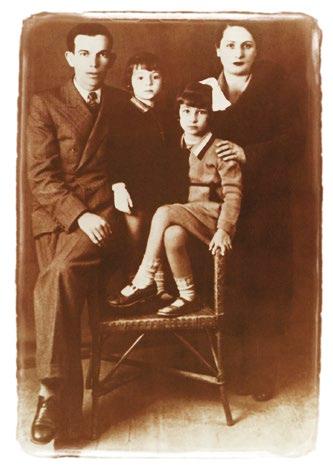

…BECOMING AN INCURABLE OPTIMIST BECAUSE WE MUST HOPE FOR THE BEST AND REALISE THAT LIFE CAN BE HAPPY. There’s always some way it ends though, and then the sorrow comes. I found love in life but this is a little bit more difficult because your happiness doesn’t always depend on you.

You can try to make [your life] happy but you are not allowed to do that—it needs everybody [involved]. Happiness is something that is worth fighting for.
…AFTER THE WAR, I STARTED TO SEARCH FOR LOVE AND PEACE.
I thought, If there will be love somewhere, then there will be peace as well. You know

“I used to sing under the moon and the sky… there was something in the air”
why? It’s because peace and love are not something material or something very easy to handle. They’re not something that you can put in your pocket and say, “Now I have it” and then they [will] be there forever. You have to work very hard.
I work hard all my life thinking
about that and, of course, you find love, then you find peace and then, again, it goes somehow. So, you have to learn to water it, to treat it in a way that, you know, [helps it to] live longer. This is the dream of the little girl from all those days ago.
…WHEN I WAS A CHILD, WE WERE TOGETHER AS MUCH AS POSSIBLE AS A FAMILY. They were different times—the Forties and the Fifties— they were happy times, of course, after the war, but there was also a civil war. There was a lot of movement in the country, but I had a very happy childhood. My parents were working, they were looking after us, and they gave us everything.

…I STARTED SINGING AT THE SAME TIME THAT THE WAR STARTED because it was this really, really frightening thing that everyone was talking about. I learned songs from the films my father used to play. At the beginning it was movies with no speaking—silent movies.
I was also learning Greek songs from my mother, who used to sing too, and I’d go up in front of the big screen in the empty house and sing under the moon and the sky… There was something in the air. I was dreaming of what little girls dream of—of being a bird or to travel—or to just sing with another bird as you do when you are a little one…
…WHEN I WAS SMALL, IF I WAS TIRED I WOULD ALWAYS CRY AND TRY TO SING A FEW WORDS and if I was happy, I would cry again. I discovered that both crying and laughing had something to do with music—it was the music moving me and the emotion that made me more sad or more happy.
…MY SISTER AND I WENT TO THE ATHENS CONSERVATOIRE
BECAUSE WE BOTH LOVED MUSIC AND SINGING, so we had a chance to finish school and do what we wanted to do, to be what we wanted to be. I stayed at the Conservatory for eight years. I think my classical
music studies helped me—it was a wonderful experience and a wonderful discipline that I followed all my life and this gave me a lot of possibilities as a singer.
…IN ABOUT 1956, THEY THOUGHT IT WAS TOO MUCH FOR ME, singing popular music and doing the sort of contests where the young singers go and sing. My professor refused to send me to take my diploma because they thought I was doing the wrong thing, singing in clubs.
…ONE NIGHT AT THE CLUB I WAS SINGING IN, the year was 1957 or something like that, Maria Callas was there and she asked me if I was at the Conservatory because she had the feeling that my voice was wellworked and she liked me very much.
I told her my story and she said to me, “You know, in life you must think of one thing: it doesn’t matter what you do with your voice, the most important is why you do it and how you do it”. When I meet young people today I tell them it doesn’t matter what you sing—it’s how and why. You must do it with love—there is no other reason.
…HARRY BELAFONTE WAS IN LONDON IN THE EARLY SIXTIES AND HE SAW ME ON TELEVISION. He went back to the US, phoned Quincy Jones and said, “You know French singers very well, can you tell
“It doesn’t matter what you sing—it’s how and why. You must do it with love—there is no other reason”
me who this girl with glasses is? She sings very nicely”.
Quincy said, “No, she’s not French, she’s Greek.” Quincy and I worked together on a few albums—it was really wonderful.
…THE 1963 EUROVISION SONG CONTEST WAS A WONDERFUL THING, although I was badly placed—I was number eight. Yvonne Littlewood was the producer that year and England was producing the Eurovision show.
After a few months, Yvonne called me in Paris and she said, “I would like to see you,” so we talked and she told me that she wanted to do a musical series with me.
Nana Mouskouri was a TV series in the Seventies with guests where I was presenting, and I’m sure that programme helped me to become better known internationally.
…MY INVOLVEMENT WITH UNICEF.
I think that being involved in fundraising for UNICEF was one of the best accomplishments that I
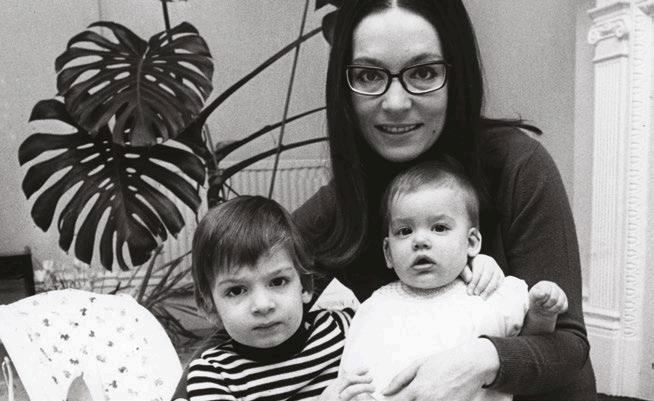
could have in my life, because working for children around the world—what UNICEF do—is wonderful work.
It’s very, very satisfying. I still do whatever I can. I’m not based in one country—we work from New York or Geneva, or wherever I am, and they give me different connections.
…IN THE NINETIES, I WAS AN MEP AND I STAYED IN PARLIAMENT FOR FIVE YEARS. At the time they told me, “You are going to help your country”, but I was not good for it. I would say it was a great experience, though. I still really respect the European Parliament.
I know, like anything in life, that there are days when there are things
we do badly and then we try and help to make everything better. It was interesting but I couldn’t stay in it because I didn’t have the right knowledge.
…WHEN MY CHILDREN WERE LITTLE, I WAS TRAVELLING A LOT back-and-forth. The nanny looked after them, but they always had a family life. Now I have three grandchildren through my son and I believe I am a good mother and a good grandmother. I’m very proud of my children.
…WHEN I WAS IN LONDON, I MET MANY, MANY SINGERS AND ACTORS SO IT WAS LIKE A BIG SCHOOL FOR ME. I was into The
Beatles at the time. I wasn’t rock ‘n’ roll of course, but I loved rock ‘n’ roll anyway. The Beatles and The Stones really were my favourite groups and I met them many times. It was fantastic.
That’s the thing about British actors and singers, they’re not snobs with the others; they accept you and they’re really interested in all music and arts. So I was among young singers and was accepted there for what I was doing.
…IN MY LIFE I HAVE OFTEN BEEN VERY
CRITICAL
OF
MYSELF. Someone told me “to try and learn more about yourself and correct
what you do wrong”, and for this you have to learn to right what you do.
I think everybody has their own way in life. We are responsible for our own lives and we have to try and do the best we can. I was always a good student when it came to listening. During my life I have learned a lot of things and I still do learn, in fact.
As told to Joy Persaud
Nana Mouskouri will perform at the Royal Festival Hall, London, on October 17.
Book via ticketline.co.uk or venue box office.
NOT YOUR EVERYDAY VILLAIN
The mundane, behind-the-scenes life of Darth Vader and his Stormtroopers



(via sadanduseless.com)


Cancer, stroke, hepatitis—all words we once feared. But thanks to great medical advances, there are now…
BY ANITA BARTHOLOMEW6New Treatments That SaveCan Your Life
IN THE PAST, SOME DISEASE DIAGNOSES USED TO STRIKE fear in all of us. But today, thanks to medical advances, this is no longer always true. Today, vaccines protect our families from once deadly diseases. Antibiotics vanquish infections that used to kill tens of thousands. Cancers that were once eminently lethal are now more like chronic illnesses that people can live with for many years. We can all take heart from these amazing advances in prevention and treatment
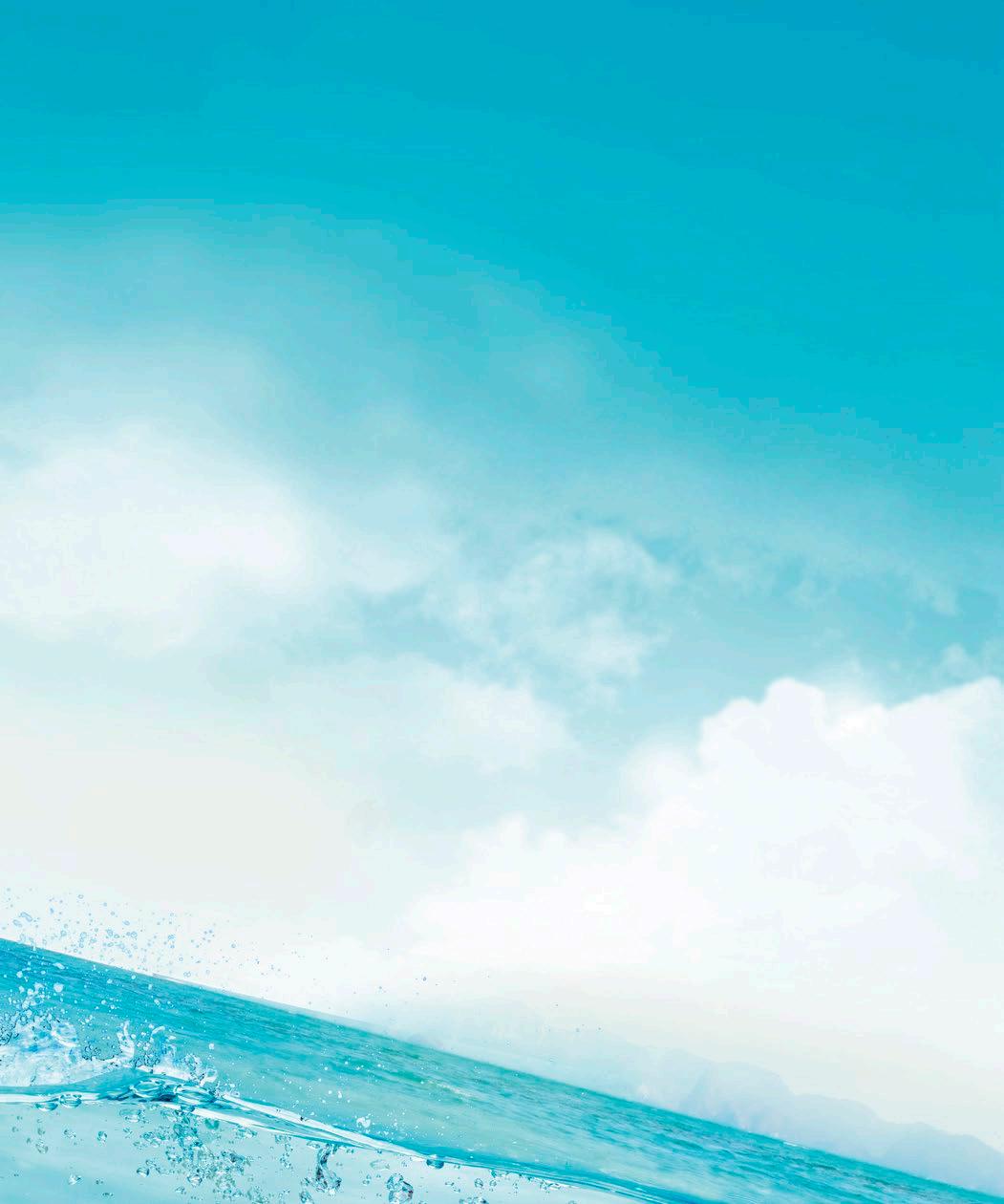
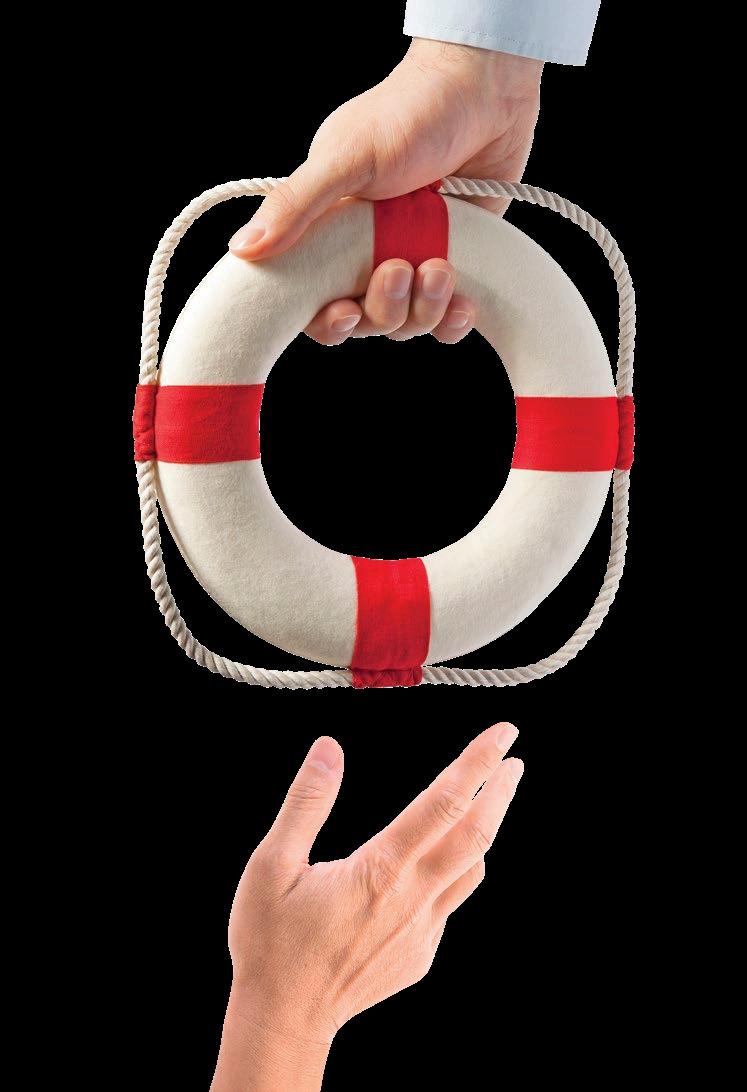
Hepatitis C
Approximately 14 million Europeans are infected.
THE GOOD NEWS
Now there is a cure.
HOW IT HAPPENED
In 2013 a new class of anti-viral drugs became available.
IT WAS THE EARLY 1990S, and
Leigh-Anne Maxwell had no idea why, for years, she’d felt so awful; neither did her doctors. They’d tested for mononucleosis, anemia, and other obvious causes. Nothing. She was exhausted. She was nauseated. Active for most of her life, the 62-year-old enjoyed exploring the woods on Mayne Island in British Columbia, where she lives.
No one connected her symptoms to the emergency surgery she’d undergone years before. It wasn’t until she tried giving blood that she finally got a diagnosis. The Red Cross had begun testing donors for the hepatitis C virus in 1990 and notified her she could no longer be a donor. She was infected.
although some will clear the infection on their own, about 70 to 85 per cent of those infected go on to develop chronic infections, “Which puts them at risk for all sorts of long-term complications associated with liver disease, primarily liver cirrhosis, liver cancer, and end-stage liver disease.”
While most people with the virus can be asymptomatic for many years, this wasn’t so for Leigh-Anne. And, the only treatment available offered just a 50 per cent success rate, and Leigh-Anne wasn’t a candidate.

Then, in 2013, newer drugs became available that were “nothing short of revolutionary,” says Mehta. But they were costly, and only worked against certain strains. Again, Leigh-Anne wasn’t a candidate. Then, in January 2017, she was offered a chance to try a brand new medication, Zepatier.
“Within a week there was a profound difference,” Leigh-Anne says. She now has the energy to do all the things she’s been missing.

Because hepatitis C is transmitted by blood, she knew immediately that the transfusion that had saved her life had infected her.
As Shruti Mehta, an epidemiologist with Johns Hopkins in Baltimore, Maryland, explains,
Today there are treatments for all strains of hepatitis C, and costs are coming down. But because the disease can hide in someone’s body for years, one of the biggest remaining challenges is finding the people who are in need of the treatment.
Cardiovascular Disease
Strokes and heart attacks account for 3.9 million deaths each year in Europe.
THE GOOD NEWS
Eighty per cent of early deaths are preventable.
HOW IT HAPPENED Lifestyle changes and better treatments have greatly reduced the number of premature deaths from heart attack and stroke.
ALTHOUGH THIS CONTINUES to be the top killer of men and women, up to 80 per cent of premature deaths due to heart disease and stroke are preventable, says the World Health Organisation (WHO). Finland offers a great example.
“Coronary heart disease mortality in working aged population (from 35 to 74) in Finland has declined by more than 80 per cent, from the top figures in the early 1970s to 2015,” says Dr. Veikko Salomaa, research professor emeritus of Finland’s National Institute for Health and Welfare.
“Until the mid-1980s almost all of the mortality reduction was explained by declines in the levels of three major risk factors: blood cholesterol, smoking, and blood pressure.”
Since then, says Professor Salomaa, Finland has seen an even greater improvement in survival,

thanks to advances in the treatment of cardiovascular disease.
Stroke treatment, too, has made great leaps. Quick treatment is still important to survival, and to limit damage to the brain. But a newer treatment called Solitaire, a device that’s designed to trap and remove a brain clot, can extend the window for treatment and make treatment for patients safer overall.
With Solitaire, stroke can be treated effectively as late as eight hours after onset. And in a very small but dramatic study, injecting stem cells into the brains of stroke victims allowed about 39 per cent to recover meaningful function as long as three years after suffering strokes.

Along with treatment, lifestyle changes have helped prevent countless deaths from heart disease and stroke.
An international study published in The Lancet confirmed that just 150 minutes of moderate physical activity a week decreases your heart risk by about 20 per cent. And the more active you are, the better your heart.
Eating healthily and lowering stress is important too. A 2014 study found it decreased heart disease risk by as much as 22 per cent.
Aira Kuronen of Lappeenranta, Finland, now 65, believes work stress almost killed her. She knew her heart disease risk was high. Her mother had died of a heart attack at 51. Aira led a healthy lifestyle, but, in her career she struggled with “busy schedules, unpredictability, difficult and challenging tasks.” She didn’t realise that it could be affecting her health until the summer of 2000.
“I was alone in the garden when I collapsed due to intense pain in my whole body.” Aira recalls. She rested up, and put it out of her mind.
It was about six months before she told her doctor about her tiredness and pain. He sent her for a stress test at the local hospital. “The supervising doctor interrupted the exercise test. He informed me that I had one or more clots in my coronary artery and asked if I was ready for an operation.”
Cancer
There are more than 3.7 million new cases of cancer each year in Europe.
THE GOOD NEWS Even with advanced cancers, people are enjoying longer survival times.
HOW IT HAPPENED Newer immunotherapy drugs and very old drugs can sometimes help.

The doctor ordered an immediate angioplasty, Aira went home the following day but she needed a second angioplasty six months later, and three more after that.
Today, she’s retired and her heart is under control thanks to medication and a tension-free lifestyle.
THE MOST PROMISING news in cancer treatment today is immunotherapy, which encourages the body’s immune system to rally its own forces against disease. And the newest advance in this field is CAR T. In the lab, a person’s own t-cells (a type of white blood cell) are re-engineered into impressive cancerfighting machines. The first such therapy was approved in the US in August 2017 (the European Medicines Agency is expected to approve the drug this year) to fight acute lymphoblastic leukemia in children and young adults. In a clinical trial, 83 per cent of those receiving CAR T therapy experienced remission within three months. It’s also being used to treat certain non-Hodgkins lymphoma patients.
Several other immunotherapy drugs are currently being used against cancer, sometimes


with dramatic results. But most immunotherapies only work for a small percentage of people. Usually, a biopsy of the tumour is required to find out whether the patient is a good candidate and for which immunotherapy. But now, a new blood test, called a liquid biopsy, is being studied by researchers to determine whether, by looking for DNA markers in an individual’s blood, they can quickly and easily determine which immunotherapy will help which patients.
Liquid biopsies might also be the future of early detection of cancer, according to an August 2017 paper in Science Translational Medicine. Already, they’re used to detect genetic changes linked to melanoma and lung cancer, and may help detect cancer recurrence.
A January 2018 paper shows that such tests can screen for certain
cancers, including those of the ovary, liver, stomach, pancreas, and esophagus.
One very different type of immunotherapy is a vaccine for lung cancer called CIMAvax. It has significantly increased survival times in patients in Cuba, where it was developed, and is now being tested in clinical trials in the US. What makes CIMAvax unique is that unlike most immunotherapies, which are only effective against very specific cancer sub-types, CIMAvax suppresses a “growth factor” called EGF in the patient’s body, and numerous different types of cancers require EGF in order to proliferate.
“The possibility is that this vaccine would be useful in a large number of cancers,” says Dr. Kelvin Lee, professor and chair of the immunology department at Roswell. Among those cancers are breast, pancreatic, colon, and head and neck. Already, he says, Cuban researchers are “exploring whether the vaccine might also be effective in treating prostate cancer.”
Another piece of good news involves a very old, very available drug. A low-dose aspirin a day might help keep certain cancers away, including colon, liver, and pancreatic. But you should check with your physician before taking it on a regular basis.

Colon Cancer
According to WHO, colon cancer is the second most common cancer in Europe (with 447,000 new cases reported in 2012) and the most deadly.
THE GOOD NEWS
Many more people are surviving today.
HOW IT HAPPENED More widespread screening allows doctors to catch it early.
THE MOST COMMON screening, the fecal test, couldn’t be simpler: your physician sends you a test kit and you send it back with a sample. If the test detects blood in the stool, a colonoscopy can locate and remove growths in the colon or rectum, and samples sent to a lab will determine whether or not they are cancerous.
In some countries, colonoscopy is becoming the preferred method of screening because it’s more accurate, and growths can be removed during screening. “There’s very good data in Germany that colonoscopic screening is working,” says Professor Dr. Joachim F Erckenbrecht, a gastroenterologist from Dusseldorf. “It reduces mortality and the rate of new cancer.”
Breast Cancer
There are approximately 500,000 new cases each year.
THE GOOD NEWS Twentytwo per cent of breast cancers discovered early will not need treatment. Survival times are greatly improved.
HOW IT HAPPENED Genetic testing now allows doctors to pinpoint which treatment will work best for which cancer.
ABOUT ONE IN EIGHT European women will get breast cancer, and 2012 saw half a million new cases. But a breast cancer is no longer a death sentence. A good portion of breast cancers don’t actually need treatment at all.

Most small (under two centimeters) tumours will never grow large enough to lead to death, according to a study in the October 2016 issue of The New England Journal of Medicine.
Improved treatment is responsible for at least two-thirds of the reduction in breast cancer deaths from 1975 to 2012, and a good deal of credit goes to the discovery that one treatment doesn’t fit all.

And more widespread screening could more than double the rate of cancer survival.
Using the right treatment for an individual’s cancer subtype both saves lives and prolongs the survival times for as many as 80 per cent of women.
Living Transplants
Too few people donate organs after their death to keep up with the need.
THE GOOD NEWS
From 2004 to 2013, living EU donations increased 86 per cent.
HOW IT HAPPENED
More people understand that most of us can live with just one kidney; live donations of livers are even lower risk.
FARRA AND GEORGE Rosko’s baby girl, Talia, was slowly dying. Born in 2015 without a functioning gall bladder, bile had backed up into her liver, causing cirrhosis. Surgeons had run out of options, and she was put on the waiting list for a liver. But finding a match among donated organs is difficult. Talia was likely to go into liver failure at any time.
When Talia’s mum needed to return to work in order to maintain the family’s health insurance, the Roskos searched for a nanny who could care for a then nine-month-old baby with a feeding tube. They found the perfect person in 22-year-old Kiersten Miles. And, over the next months, Kiersten fell in love with her little charge.
Without telling anyone, Kiersten made the important decision to get tested to see whether she might be a donor match.
Most transplanted organs must come from deceased donors, but

kidneys and livers can also come from donors who are alive, which vastly increases the number of transplantable organs available.
There are, of course, risks. Although people generally do fine with a single kidney, the donor might eventually suffer a loss of function in the remaining kidney. The liver, by contrast, has amazing powers of regeneration. If a portion is removed, it can grow back to full size within just two months. The portion transplanted also grows to normal size in the recipient. Donors typically recover completely without suffering any permanent damage.
A healthy, athletic young woman, Kiersten was thrilled when doctors told her she was a match. In January 2017, Talia and Kiersten underwent the delicate dual operations to transfer a part of Kiersten’s liver to the baby. Today, both are doing fine.

WHAT WAS ONCE a
death sentence is now often curable. And tomorrow? With ongoing research, each passing year brings better news.
EQUITY RELEASE
readersdigest.co.uk/release
Do you want to release the money tied up in your home?
Be sure to read our trusted guide
Your home could be the biggest asset you own. Increasing numbers of UK homeowners over 55 are turning to equity release in order to take advantage of their property wealth without having to move or downsize.
For equity release information you can trust, request your free copy of the Reader’s Digest Equity Release Guide.
readersdigest.co.uk/release






















To request your FREE guide and instant calculations:
0800 029 1233
This is a Lifetime Mortgage. To understand the features and risks, ask for a Personalised Illustration. Reader’s Digest Equity Release is a trading style of Responsible Life Limited. Only if your case completes will Responsible Life Limited charge an advice fee, currently £1,295.


Sweet Talk
We’re hearing more and more about how unhealthy sugar is. Still need convincing? Here are some surprising but sound reasons to kick the sticky stuff…
SUGAR MAKES YOUR GUMS BLEED.
We all know that sweet treats can cause cavities, but how many of us realise that a high-sugar diet can also lead to gum inflammation and increase our risk of gum disease? This was the finding of a 2014 study in the American Journal of Clinical Nutrition.
SUGAR HARMS YOUR HEART.
Harvard University researchers studied thousands of American adults over 15 years and found that people who got a quarter or more of their daily calories from sugar were more likely to die from heart disease in that time than those whose diets contained less than ten per cent of added sugar a day. Sugar-sweetened


Susannah Hickling is twice winner of the Guild of Health Writers
Best Consumer Magazine Health Feature
drinks, fruit drinks and dairy desserts were among the worst culprits.
IT’S AS BAD FOR YOUR LIVER AS BOOZE. Fructose, a sugar that occurs naturally in fruit, is processed in the liver. This is leading to a rise in nonalcoholic fatty liver disease (NAFLD), which can cause liver failure and cirrhosis and may even necessitate a liver transplant. A sugar belly— think beer belly but caused by an excess of the sweet stuff—is a telltale sign of NAFLD.
FRUCTOSE COULD BE WORSE THAN SALT FOR YOUR BLOOD PRESSURE. A high-fructose diet can send your blood pressure beyond the recommended upper limit of 120/80, according to a study in the Journal of the American Society of Nephrology in 2010. And in a review of research in 2014 in the BMJ Open Heart, experts argued that it could be more damaging to heart health than salt.
SUGAR CAN CAUSE ASTHMA.
Scientists who analysed data from 146,990 American adults found that people who quaffed at least two sugar-sweetened drinks—such as fizzy drinks, juices and sports drinks—a day were more likely to have problems with their breathing.
IT CAN MAKE YOU FEEL DOWN.
Before you reach for a tub of icecream when you’re feeling a bit low, consider this: Columbia University Medical Centre researchers found that post-menopausal women who ate a diet high in added sugars and refined grains were more likely to succumb to depression. On the other hand, those who ate more dietary fibre, fruit and veg, and whole grains were at lower risk.

CANCER CELLS LOVE SUGAR. Just as our bodies want sugar for energy, cancer cells thrive on it too. New research from the University of Texas at Dallas shows a strong association between sugar and squamous cell carcinoma, which accounts for a quarter of lung cancers. Other squamous cell cancers—head, neck, oesophageal and cervical—also absorb a lot of sugar.
SUGAR MIGHT CAUSE DEMENTIA.
Researchers from the University of Bath recently found a molecular link between diets high in sugar and early Alzheimer’s. They discovered that glycation—a reaction in which glucose affects cells—damages an enzyme that’s involved in reducing abnormal protein build-up in the brain, which is a feature of this type of dementia.
Nail It!
Want to get your feet into the open air now that the warmer weather’s coming but embarrassed about your unsightly, crumbly nails? Here are five key facts you should know about toenail infections.

Fact 1: Fungus spread from athlete’s foot is often to blame. It migrates from the outer layer of the skin (often between the toes) to the keratin of the nails and, voilà, you have a fungal nail infection, causing your nails to thicken, and go yellow and brittle.
Fact 2: Foot fungus loves sweaty shoes. The warm, moist environment is a perfect breeding ground for infections. Try to get your feet out in the open air as much as possible and keep them clean and dry. Always wear cotton socks and change them daily.
Fact 3: Infected nails are hard to cure. In fact, toenail fungus—
onychomycosis—is a chronic infection. Start off with creams from a pharmacist, though tablets are more effective for serious cases. The infection can sometimes take up to a year to shift.
Fact 4: If your nasty nails are caused by athlete’s foot, use an antifungal cream on your skin. To avoid a fungal skin infection spreading to your nails, treat it as soon as possible.
Fact 5: Good foot care can help prevent fungal toenail infections. This is the best excuse in the world to give yourself a good pedicure. Keep your toenails short, dry and clean, and make sure you use different clippers for infected nails. Don’t clip your cuticles, as this damages the nail’s protective barrier, making it easier for fungi to find a way in.
 Jonathan Hancock
Jonathan Hancock
Ask The Expert
Former World Memory Champion Jonathan Hancock now teaches other people to improve their powers of recall
How did you become a memory expert? As a teenager, I taught myself a technique for memorising playing cards and got into the Guinness Book of Records. I found it worked for everything—numbers, words, places—and I became World Memory Champion in 1994. I’ve written books and as a teacher, I now train kids to have a really good memory.
Why is it important to have a good memory? There’s so much information to deal with, but if you use your memory properly, you become more efficient and organised. You make better decisions and you’re safer—you remember passwords, for example. It also helps you to be more confident with names and faces.
How easy is it to improve your recall? Memory changes as you get older but it’s really easy to get better if you help yourself. Keep physically fit,
healthy and alert, and make an active decision to improve it.
What are your quick tips for remembering everyday info? The best techniques are based on pictures. For example, for a shopping list containing coffee, carrots, bin liners and salad, picture a hot cup of coffee with a carrot bobbing inside it, which you then tip into a rubbish bag made of lettuce leaves. For a PIN number, use words with the same number of letters as each digit, so that for 3215 it’s “sit on a camel”.
What do people need to do to maintain their memory skills? They need to commit as they would to physical exercise. Set yourself a daily task and learn a little bit more every day.
Visit memorypower.org for Jonathan’s online course
The Real God Delusion
This month, Max Pemberton discovers that not all delusions need to be “cured”
Being God can’t be easy. “It’s not,” Mr Lewis assured me. “It’s a lot of pressure. I mean it’s not something you’d want if you had a family.” He looked at me. “Of course, I’m very blessed. I’ve got a whole host of angels to help me out, though the stress does get to me sometimes,” he added, wistfully.
When you work in mental health you get accustomed to slightly bizarre conversations like this. “It’s because of the stress that I had to come in here. It’s been nice to get away from all the responsibility that being the Creator of the Universe brings.”
Of course, Mr Lewis was not in hospital as a respite from being God. If God does exist, I find it hard to

Max is a hospital doctor, author and columnist. He currently works full time in mental health for the NHS. His latest book is a self-help guide to using CBT to stop smoking
believe that he’d be an elderly man in a tracksuit and trainers with a West Country accent on a psychiatric ward.
Mr Lewis has been mentally ill since he was 18. He’s now in his late sixties. From the mountain of notes that have accumulated from his various admissions, it seems that when he was younger, his illness manifested itself in hallucinations and paranoid thoughts. But as the years went on, his psychosis mellowed and now for the past few years, he’s been steadfastly convinced that he is God. Usually he potters along with his life, gently perplexed at the fact that he still lives on a council estate, rather than somewhere more divinely appropriate. A few months ago the situation deteriorated when he thought that the packet-soup in Tesco’s contained lost souls and he went about dutifully opening them and emptying the contents on the floor. Apparently the security guards found this a little strange and so he

was brought in by the police. Since he had been on the ward, he’d got markedly better. He was much more settled and his thoughts seemed less disordered. He’d been started back on medication that he’d obviously stopped taking before being admitted. There was one problem: he still thought he was God. The medication didn’t seem to be stopping his delusion. And, unbelievably, my consultant, Dr Whitfield, thought he was ready for discharge. “But he’s not cured,” I said, as Dr Whitfield suggested that we discharged him later that week.
Dr Whitfield looked at me. “Why would I take away his delusion? That’s all he’s got.” It dawned on me what he meant. Mr Lewis, free from
his delusion, is just a sad, bumbling old man, with no family to look after him. Being God is all he has. He’s had a lonely life, dogged with mental illness. Who in their right mind would take away his one pleasure, his raison d’être? It doesn’t harm anyone, and it makes him happy. Later that day I told Mr Lewis of our plans to discharge him.
“Oh, yes, it’s time for me to get back to my duties,” he said. He leaned over and patted me on the leg: “You’ve done very well. You might be in line for a promotion to archangel now.” And he toddled off to start packing.
His world, where he is in charge and everyone knows and loves him, was intact. He might be deluded, but perhaps after all, he is blessed.
The Doctor Is In
Dr Max PembertonQ: I’m long overdue a visit to my GP. Although a few health concerns are troubling me, I’m too nervous to make the actual appointment.
-Alfie, DoncasterA: First of all, this is really common. It’s called “Fear Of Finding Out” and happens when we put off those small niggling health concerns hoping that they’ll go away rather than confronting them. Lots of people do this, even me. About a year ago I noticed a mark on my cheek. It was no bigger than a grain of rice and very faint but even so, I worried. I have a family history of skin cancer. I should get that checked out, I thought. The days turned into weeks. Reader, it took six months before I eventually saw a GP, who immediately referred me to a dermatologist. Thankfully it was nothing, but why on earth did I wait? In hindsight, what a stupid thing to do. If it had been cancer, six months could be the difference between sitting here writing this and not being
here at all. And I’m a doctor, surely I should know better?
Research has shown that FOFO is a major barrier preventing people from seeking medical help. The coping mechanism at play here is denial. This is one of the defence mechanisms the mind uses to cope with stressful situations. In the long term it can result in big problems. People can feel overwhelmed because they’ll have stored up a number of complaints while GPs only have time to properly discuss one.
Write down your concerns before seeing your doctor. If there’s more than one, write them all down and give the list to your doctor as soon as you walk in. They’ll know which problem should be prioritised. Don’t Google and try to selfdiagnose—I’ve seen lots of people falsely reassured or unnecessarily worried, when in fact there was no need.

Got a health question for our resident doctor? Email it to askdrmax@readersdigest. co.uk




The Cardioace® range has been developed by Vitabiotics’ nutritional experts based on extensive research on the role of nutrients in normal heart health.
Cardioace® Original provides comprehensive daily nutritional support including thiamin which contributes to normal heart function plus vitamins B6, B12 and folate which contribute to normal homocysteine metabolism
Cardioace® Plus provides the benefits of the Original formula plus even greater nutritional support with 1.3g of Plant Sterols scientifically proven to help maintain normal blood cholesterol levels1, as well as Omega-3 fish oils.
Cardioace® Max provides all the benefits of Cardioace® Plus, with an additional capsule of premium quality Red Krill Oil, a superior, easily absorbed source of Omega-3 DHA and EPA fatty acids, which contribute to normal heart function2 .
with
which contributes to normal
Empty Promises
BY CHARLOTTE HILTON ANDERSENCALCIUM SUPPLEMENTS
“A recent analysis performed by researchers at Johns Hopkins Medicine, Maryland, US, suggests that although a diet high in calciumrich foods appears protective, taking calcium in the form of supplements
Some allegedly healthy habits may not be so helpful after all. Here are six you can stop right now
may be associated with an increased risk of plaque build-up in the arteries. Bottom line: Eat calciumrich foods, such as dairy products and leafy greens, and skip the pills.”
ANDREW D. ATIEMO, MD, FACC, a cardiologist in Flagstaff, Arizona

ORGANIC JUICING
“Juicing has an undeserved health halo. Sure, you can drink your vitamins and minerals, but you also get a lot of sugar. The worst aspect of juicing is that it strips fruits and vegetables of their fibre, which mediates blood sugar response, contributes to satiety, and promotes bowel regularity. Just eat the produce.”
EMILY BRAATEN, MS, RD, LD, a registered dietitian in Washington, DC
DAILY MULTIVITAMINS
“People in the US spend about $6 billion per year on vitamins. Virtually all of that money is wasted since there’s growing evidence that these additions to our diet are not effective in preventing chronic disease, and may be harmful if taken in large doses. Foods contain trace elements and fibre that supplements don’t have, so try to maintain a healthy diet and eat your fruits, vegetables, and dairy products rather than taking supplements.”
STEVEN J. HAUSMAN, PHD, former research scientist for the National Institutes of Health and president of Hausman Technology Presentations
WASHING YOUR FACE TWICE A DAY
“This is standard skin-care advice, but it doesn’t work for everyone. If you have very oily skin, then yes, you can probably wash your face twice a day. If you have dry skin, however,
washing your face twice daily may dry it out even more. People should keep in mind that there is such a thing as over-washing your face, and twice a day isn’t the magic number for everyone. The one time you should definitely wash it, however, is after a workout.”
ALAN J. PARKS, MD, dermatologist and cofounder of DermWarehouse
ANTIBACTERIAL SOAP
“Using antibacterial soaps may increase the risk of bacteria’s resistance to certain ingredients in those types of soap. The best way to clean your hands is with regular soap and water, making sure to clean in between your fingers.”
ROB DANOFF, DO, osteopathic family physician and programme director of the Family Practice/Emergency Medicine Residency programs at Aria-Jefferson Health
STATIONARY STRETCHES
“Static stretching before exercise was once thought to be important for preventing injury and increasing performance. However, new research has proven it doesn’t decrease injury, and it may actually decrease muscle force. Dynamic stretching, in which you stretch muscles through controlled movements, is a good alternative to loosen the body before exercise.”
NARESH C. RAO, DO, sports medicine specialist at Sports Medicine at Chelsea
Caring For Body And Soul
Do you often have a “lump in your throat” or “butterflies in your tummy”? Jo Carlowe explains why mental pain can sometimes become physical
It’s been decades since I first studied psychology at university, but I still remember the graffiti that appeared in the ladies’ toilets a week before my finals.
“Exams are nature’s laxative,” was the adage scrawled across the cubicle door.
That it was written in a psychology department lavatory seemed apt, for the problem described was not solely physical but psychological.
OUR BODIES ACT AS BAROMETERS FOR OUR EMOTIONAL STATES.
In this fast-moving world, it’s easy to lose sight of this, yet it’s ingrained in our language. We get “butterflies in

Jo Carlowe is a psychology and health journalist. She writes for numerous newspapers, magazines and specialist journals. Visit jocarlowe.com for more
the tummy” when nervous, a “lump in the throat” when sad, and, if stressed, we have the “weight of the world on our shoulders.”
Already a mainstay of Eastern medicine, the idea of a mind-body connection was pioneered in the West in the 1930s by Austrian psychoanalyst, Wilhelm Reich. Reich believed pain in the body reflected tension in the mind. Unexpressed fear might manifest as a headache; withheld rage as neck pain, and repressed sadness as tension in the throat.
The latter makes me think of my grandmother. Long before I was born, she suffered the tragedy of a stillborn baby. Discharged from hospital, she visited her GP complaining of a throat obstruction. A few checks revealed there was nothing clinically wrong, and she was told to “pull herself together.” Such was the era.
Her story brings me back to Reich.
His notion that repressed feelings could lead to tension in the throat, seems spot on—my grandma was literally so “choked up with grief,” she could barely swallow.
At the time, Reich’s body-mind theory was revolutionary. Unfortunately, his other ideas were more controversial. He invented a box in which people sat and absorbed universal energy, and a rain-making device, immortalised in Kate Bush’s song “Cloudbusting.”
Dubbed a quack, Wilhelm died in a US penitentiary. Yet his body-mind theories have credence. Many less eccentric therapists believe muscle tension and chronic pain mark a block in the body that occurs when we struggle to express ourselves emotionally. For example, we might store stress in our shoulders so they ride up to our ears. The jaw region is another contender, with clenching and teeth grinding leading to headaches.
Anxiety can get held in the diaphragm, constricting the chest so the lungs don’t fully expand, resulting in shallow breathing; or else held in the gut and stomach causing bloating, cramps and poor digestion.
That our emotions evoke a physical response is well established through conventional science. When we’re under pressure our
nervous system instructs our bodies to release stress hormones including adrenaline and cortisol. These produce physical changes to help us cope with threats—the “flight-orfight” response. Our respiratory system is also affected so we breathe harder and quicker to distribute oxygen-rich blood around our bodies; and our muscles tense up to protect us from injury and pain.
More often than not we aren’t really in danger. But being late for a meeting or arguing with a loved-one can also prompt these reactions. As can worry and fear.
Panic attacks, characterised by palpitations, sweating, and breathlessness, are really anxiety attacks, yet they often get mistaken for heart attacks. It’s a stark example of how we tend to leap to physical
rather than mental explanations for bodily discomfort.
Body psychotherapists focus on the interactions between body and mind by combining traditional talking cures with mindful techniques including breathing exercises and meditation.
“There seems to be more interest and openness to body-oriented therapy in recent years,” notes body-
“ Our body is intricately linked to our mind and psyche and ultimately there is no separation”
therapy specialist, chartered consultant clinical psychologist, Dr Claudia Herbert, of The Oxford Development Centre.
“Our body is intricately linked to our mind and psyche and ultimately there is no separation. All experiences set off a complex interplay of neurochemical, cellular and muscular-skeletal processes which find their expression in emotions, body sensations, mental processes and behaviour, and all take place in the one, same body system.”
Research into body-oriented therapy is limited, but of the studies
that exist, the results are encouraging. Last year, Canadian experts tested it on patients who visited their doctors with “medically unexplained symptoms.” By making participants aware of the link between body and mind, their psychosomatic complaints diminished.
Scientists have also reported good outcomes in the use of body therapy for pain reduction following surgery. And trials have taken place to see if body-oriented techniques can help schizophrenic patients recover their sense of body-mind unity.
Results are mixed, although intervention does seem to help patients become more expressive and better able to control repetitive movements such as compulsively rocking themselves.
Over time, more evidence will likely emerge to support the idea that fostering a better body-mind connection can benefit us all.
So next time you experience a cramp or twinge—consider taking a moment to reflect on your emotional response.
What is your mood in that moment? Are financial, work or relationship issues causing you to stress? Are you feeling angry about something or towards someone? Are you feeling hurt or sad? Will a pill rid you of that vice-like headache, stiff shoulders, or dicky tummy—or is it time to give your body a say?
QUIZ: WHAT IS YOUR BODY TRYING TO TELL YOU?
1. Stand up. What are your shoulders doing?
A: They’re hunched forward
B: They’re pulled right back
C: They’re neutral
2. Think of a milestone such as retirement, or a big birthday. How does your body respond?
A: My head is drooped forward and I feel achy
B: My neck is stiff and I’m clenching my muscles
C: Nothing is aching or stiff
3. How do your arms feel?
A: Weak or tired
B: Stiff or painful
C: No problems to report
4. Imagine walking into a room to confront your biggest fear. Which best describes your stance?
A: My arms are crossed
B: My chest is puffed out
C: I’m taking deep, slow breaths
Mostly A’s
By hunching, you’re trying to protect yourself from losing control. Stand with your feet parallel, with relaxed knees. Relax your body from the top downwards. Then slowly bend forward until your fingers touch the floor. Breathe and hold, before slowly rolling yourself up.
5. How does your back feel?
A: My upper back is painful
B: My lower back aches
C: I’m not experiencing back pain
6. Focus on your breathing. Which description best applies:
A: My breathing is shallow and rapid
B: I can’t focus on my breathing
C: It’s easy to take long, deep breaths
7. When stressed which of these are you prone to?
A: Stomach cramps, teeth grinding, diarrhoea, heart palpitations
B: A stiff jaw, headaches, outbreaks of acne, tight muscles
C: None of the above
8. Think of a time when something bad happened. Did you?
A: Lose your appetite
B: Experience an increase in your appetite
C: There was no impact on my appetite
ANSWERS:
Mostly B’s
Pulling back our shoulders is a way of holding back feelings. An outer show of bravado can cover up insecurity. Your tense stance might be a way of warding off intimacy. Take deep belly breaths to help relax the diaphragm which in turn can release unexpressed emotions.
Mostly C’s
You’re not anxious at the moment. Perhaps you’ve found ways to cope when everything gets on top of you. How you go about this may be down to communication with friends, or mindful techniques such as breathing exercises or yoga.
Anthropologist, writer and broadcaster
Dr Alice Roberts is currently Professor of Public Engagement in Science at the University of Birmingham
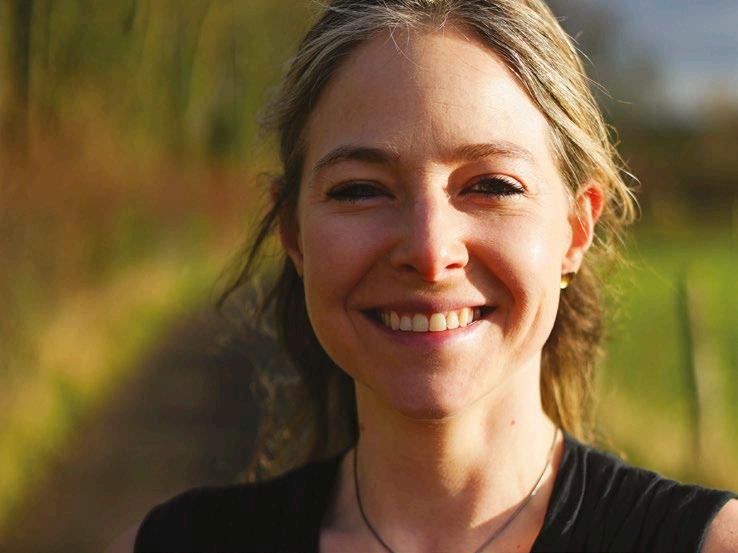
IF I RULED THE WORLD Dr Alice Roberts
Society would be more peaceful. We are sentient, clever creatures. We don’t need to be fighting like medieval feudal states—I’d insist on unilateral disarmament. The argument that we’re biologically programmed to fight is an excuse that ignores the fact that humans are fully capable of understanding the effect of their actions. There is cause for tentative optimism though; as Steven Pinker writes in The Better
Angels of our Nature, violence has declined and with that knowledge, “The past seems less innocent; the present less sinister.”
I’d try to tackle the big diseases. We’re spending a lot of money on researching rare diseases when we still have common ones killing millions. Malaria kills 3,000 children every day and TB infects a quarter of the world’s population. 1.7 million
people died of TB—a vaccinepreventable illness—last year.
I’d champion education for women around the world. If anyone is concerned about our rising population and the subsequent strain on the world’s food supply, they should be lobbying governments to give more to women’s education. We know that the higher the level of a woman’s education, the fewer children she’s likely to have.
We’d grab the opportunities technology has given us. There’s a lot of talk about the negative aspects of technology and how we’re enslaved to our screens, but we should look positively at how it can work to free up choices. I’d like people to work flexibly. No one needs to go to an office nine to five to reply to emails. A lot of email correspondence is unnecessary and the rest can often be done at home or on the move. Technology should help us to balance all our roles in life.
I’d champion equality. We’ve come a long way in the UK but we’ve still got frustratingly far to go. As a woman, a female scientist and a professor, equality for women is a burning issue for me. Only 20 per cent of science professors in the UK are women. Things are better for me than they were for my mother, but if all the top earners at the BBC are men and the women presenters on Radio 4’s Today
programme are being paid significantly less than their male colleagues then how can we be said to be equal?
We would not sacrifice diversity for short-term yield. We need to understand that the monoculture of intensive agriculture has railroaded itself into devastation of our natural world. Birds and insects are disappearing so rapidly that many species are heading to oblivion. We can’t have pockets of land devoted solely to farming. We need to diversify and create natural habitats. I’d like a label on food that shows which produce came from farms that are striving to look after our wildlife. Then consumers could get on board.
I’d ban plastic straws and make refilling plastic bottles common practice. Remember when you could go to The Body Shop and refill your shampoo and gels? Someone should be brave and start that service again. I’m sure in the current climate, in which we’re all aware of the environmental danger of plastic, it would be a popular move.
Lego would be less painful to tread on. Simple. As told to Caroline Hutton
Tamed: Ten Species That Changed Our World by Alice Roberts is out now (Windmill Paperback, £9.99)
From Our Archive
NOVEMBER 1999
The Spark She Can’t Explain
BY LAWRENCE ELLIOTTMeryl Streep, a timeless household name, is embodied here, in the November 1999 issue of Reader’s Digest, for her then upcoming film, Music of the Heart. We delve into her fellow actors’ and directors’ thoughts on where she gets that inimitable acting talent
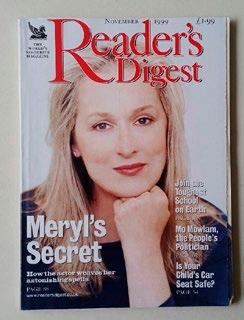

How does she do it? How in an industry abounding in gifted performers does Meryl Streep stand in ‘a category unto herself’, as Dustin Hoffman, her costar in Kramer vs Kramer, put it.
It’s a question many have asked and Streep herself is no help. She has no method, she will tell you. ‘I don’t know how it works,’ she said once. ‘I don’t know how other people do it.
I’ve seen Robert De Niro writing lots of things in the margins of his script, but I don’t know what he’s writing.’
Joseph Papp, the New York theatre producer who gave Streep her first professional role, suggested an answer. ‘There are only a few people around I would call pure actors,’ he said in an interview with Newsweek. ‘Meryl is one. She takes tremendous risks, both physical and emotional.’ ” “


“
‘There are certain actors who would never play a negative role because they fear that the audience would not like them. But Meryl doesn’t care, and she violates her classic beauty constantly.’
Cher, who starred in Silkwood , has another theory. She calls her ‘an acting machine in the same sense that a shark is a killing machine; that’s what she was born to be.’ ”
“In her second year at college, Streep was given the lead in Strindberg’s Miss Julie —the first serious play she had ever acted in. ‘How do you know how to do that?’ her friends asked, impressed.
‘I didn’t know,’ she now says.
‘And I still don’t. It was just there.’
‘It’ survived three years at the Yale School of Drama, from which she graduated with a Master of Fine Arts degree and an incipient ulcer.

The whole time she kept swinging between the joy of creating a character and a lingering doubt that the theatre could be a life for the serious person she wanted to be. How could an actor contribute something significant to the world?
And so, in the spring of 1975, while her classmates scurried from audition to audition, she thought about becoming a lawyer and applied to take the law entrance examination. But she had to perform the night before, overslept and took this as a sign that she didn’t belong in law school.
In a span of 16 months she had played eight stage roles to glowing
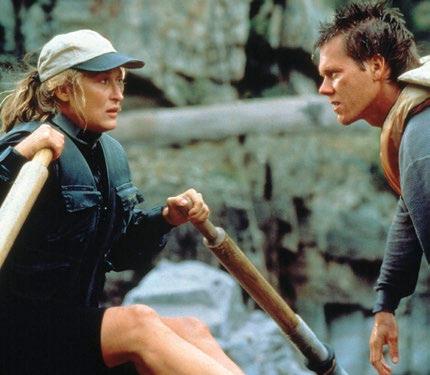
reviews. Increasingly, though, her attention was turning to Hollywood.
Robert Brustein was dean at the Yale school of Drama when Streep was a student. He, too, has a theory about the source of her acting gift. ‘The secret of how she does it is in herself, in her great compassion,’ he reflected recently. ‘Her entire career, every one of her performances, is animated by this inner spark, this humanity. That’s how she is able to identify with her characters; that’s how she feels their feelings and becomes so astonishingly believable in their skins.’ ”
“Asked about the fulfilment that comes from her profession, Streep says that it comes from seeing actors on stage bringing characters to full life who would otherwise have lain inert on the printed page.
(Left to right)
Kramer Vs Kramer with Hoffman, Silkwood with Cher, The River Runs Wild with Bacon
That vivid sense of reality is strikingly characteristic of the women Streep has created in 27 films. All of them inhabit another planet from the assembly line of hookers and sex objects that is the typical Hollywood fare. They are often sexy, but their sexuality is driven by a complicated and often contradictory intelligence. They can be difficult, vulnerable, lonely and also side-splittingly funny.”
“ ‘Given the media’s lust for film gossip, she has been linked romantically with a number of leading men. All ridiculous stories,’ Streep says. But her fellow actors do seem to fall under the spell of her acting talent. ‘Whoever is playing the lover falls in love with her,’ notes Mike Nichols, the director. ‘And whoever is playing the villain is frightened of her.’ ”
“Meryl Streep herself understands the power of great acting, for she has felt it from the earliest days of her career. ‘I would leave the theatre with my senses sharpened,’ she remembers, ‘like being outside after rain. Everything was more alive.’ ”
It’s a feeling she’s given to millions of film lovers.
Young and old living side by side is improving the lives of everyone
At Home Together
BY LISA FITTERMAN
Student Sores Duman lives in an apartment next door to Marty Weulink, at a seniors’ residence in Deventer, Holland
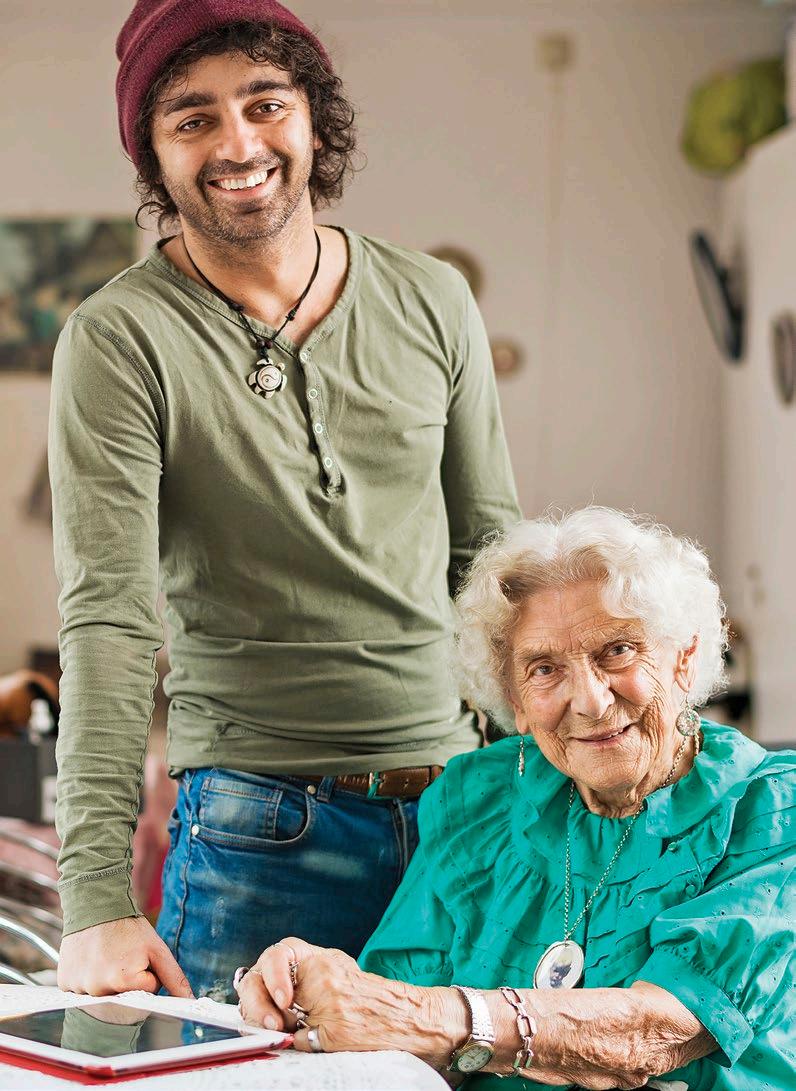

TAIMI TASKINEN SETTLED IN HER WHEELCHAIR, preparing for a day that promised to be different from all the others in her ten years living at the Rudolf Seniors’ Home in Helsinki. During breakfast in the dining room that morning in January 2016, residents were told that several young people were moving in as part of a pilot project by the city.
At 82, confined to the wheelchair since a stroke paralysed her left side, Taimi couldn’t imagine what she’d have in common with a youngster who wasn’t family. Her reverie was interrupted when a young man with dark hair and a tentative smile appeared in her doorway.
“Hi! I’m your new neighbour,” the young man said. “My name’s Jona, short for Jonatan. Mind if I come in?”
“Please,” she replied, at once curious and wary.
“I’ll make coffee,” he announced. “Why don’t you tell me some more about yourself?”
Startling herself a bit, she did. She spoke of growing up in a mid-size lakeside town in eastern Finland and of her husband who died in 1970, leaving her to raise four kids. Of toiling as a cleaning lady before getting a job in a factory; of the terrible death of a son—her second eldest—on his 45th birthday back in 2002. Of her pleasant, uneventful life in the residence; of her love of drawing and painting, hobbies she’d picked up after the stroke.
“Thank God I’m right-handed!” she said, nodding to the left one resting on her lap, curled into a claw.
In turn, Jonatan, now 20, told Taimi he’d been born in Tel Aviv of an Israeli father and Finnish mother and had been living in Helsinki with his mum and brother until they moved.
“I couldn’t go with them because I’m in the middle of training to be a pastry chef,” Jonatan explained. “I needed to find somewhere to live, practically immediately.”
“
With high cost housing and health care spending cuts, intergenerational homes are helping to fill the gap ”
It wasn’t easy. Helsinki is one of the most expensive cities in the world. Then he heard about a new program
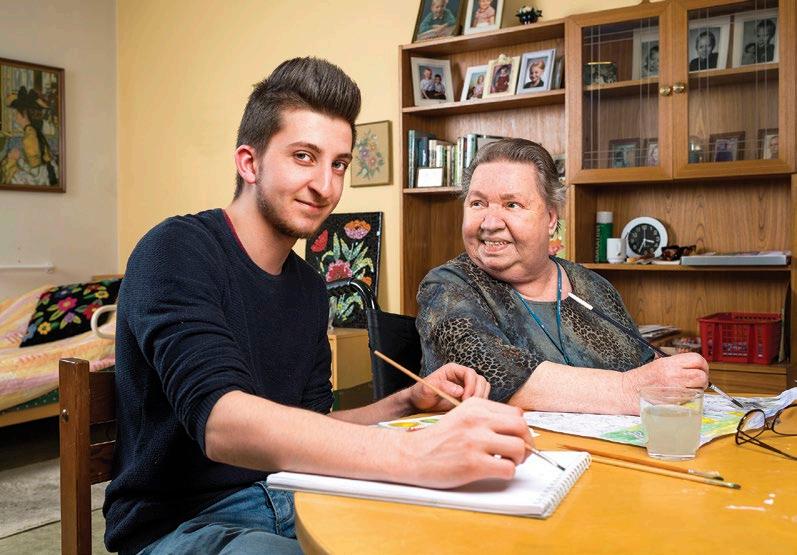
At Rudolf Seniors’ residence in Helsinki, friends and housemates
Jonatan and Taimi have a shared passion for painting—and cinnamon buns
called “Oman Muotoinen Koti,” or “The House that Fits.”
“It’s the most genius idea, youngsters and older people living together,” he continued. “We can help each other!”
And so began a friendship between the elderly woman who’d spent ten years watching seasons pass outside her window and the young man who brought the outside in.
WITH HOUSING COSTS climbing out of reach and with governments cutting healthcare spending,
intergenerational retirement homes in various forms are starting to spring up to help fill the gap.
One of the first people to have that “genius idea” was Gea Sijpkes, director of Humanitas, a low-rise, yellow brick seniors’ residence in Deventer, a city of fewer than 100,000 in the heart of the Netherlands.
Back in December 2012, Gea was looking for a cost-effective way to both enhance the residents’ lives and fill rooms empty due to fewer government subsidies to fill them. She was well aware of studies in the
PHOTO BY JUHO KUVAEuropean Union, Canada and the US that found evidence linking isolation and loneliness to physical illness and cognitive decline. A 2014 report by the National Seniors Council in Canada, for example, found that up to 44 per cent of seniors living in residential care had been diagnosed with depression, while men over the age of 80 had the highest suicide rate of all age groups.
with younger people, from fighting off dementia to regulating blood pressure, and it struck her that she was constantly reading about students struggling to make ends meet. She thought, why not marry the two?
When she proposed it to the residence’s board members, they thought she’d gone mad. “To them, the idea of students, with their sex, drugs and rock ‘n’ roll, living among seniors, was crazy,” she said.
“ I used to feel sorry for the elderly because they aren’t able to do a lot.
Now I see what they can do ”
SORES DUMAN, Student
“Social isolation isn’t just an individual issue,” says Tamara Sussman, an associate professor of social work at McGill University in Montreal who was a consultant for the NSC report. “Seniors often don’t have opportunities to show themselves outside of their illnesses and something like this provides an opportunity not only to socialise but to change attitudes and ideas—to pass their experience and knowledge to a new generation.”
Gea already knew that seniors enjoy health benefits when they’re
But Gea persevered, finally persuading the board to agree to one student living in the residence on a trial basis before rejecting the proposal outright. In return for free room and board, the student would have to be a “good neighbour” and interact with the residents for at least 30 hours each month, from serving meals to helping with computers or just opening a bottle of wine—a seemingly simple task unless you have arthritic fingers.
“If it doesn’t work, I’ll kick the student out myself,” Gea promised.
It did work—and the program has been going strong ever since. No more than six students live in Humanitas at a time with the 160 elderly residents. New ones are screened first by their peers and then by Gea. These young people gain more than free accommodation, according to Sores Duman, 27, a communications student at the HAN University of Applied Sciences in Arnhem. He’s been at Humanitas
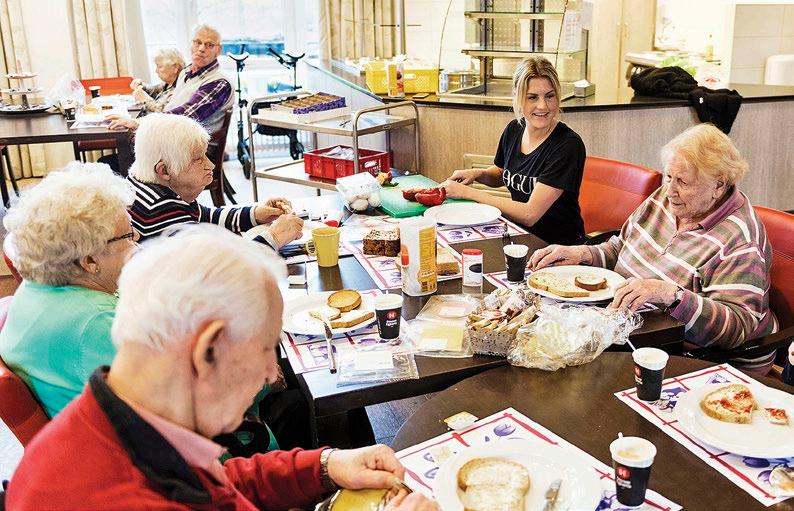
since March 2016, in a studio apartment next door to 92-year-old Marty Weulink.
“We’re all friends with something to offer, be it the wisdom of experience or technical know-how,” Sores says.
Marty is at once practical and sentimental. “Sores helps me with my iPad so I can contact my family,” she says. “When he stops by we talk, eat and drink and tell lots of stories. I’m not sure if I’ve taught him anything but I consider him my grandson!”
Sores laughs. “Marty has taught me how she experienced the Second World War,” he says. “Living here has taught me how to be more patient because everything slows down when
you walk in here. I used to feel sorry for the elderly because they aren’t able to do a lot of things. Now, I look at them and see what they can do.”
WHEN MIKI MIELONEN, a project manager in Helsinki’s youth department, heard of the Humanitas program, he thought, why not here? For him, youth homelessness was the immediate problem. The numbers told the story: in 2015, more than 1,000 people between the ages of 18 to 25 were without a permanent home in the city, drifting from one couch to another, trying to study or work. Why not take some of the empty apartments in retirement
Student Anneloes Olthof shares lunch with other residents at Humanitas in The Netherlandshomes and charge a small rent to young people in return for them spending time with the seniors?
It was a win-win, he said. The young people would pay modest rent and in turn, they would bring their vitality and different perspectives to seniors who could be marginalised by their health conditions and living situations. There would be no hard and fast rules but rather an undertaking that the young people
young people deal with things such as finding a senior unconscious, or dead? What about parties, loud music and smoking?
“Let’s try it—just a few students at first who are interested in bridging that gap,” Miki suggested. “We have nothing to lose.”
“ I’m more open. Jona has inspired me to get out of my room and talk to people, young and old ”
TAIMI TASKINEN, Senior
spend time with their neighbours, no matter if it was over a cup of coffee or an outing in a nearby park.
And Rudolf House—a series of concrete, low-rise buildings in the east end of the city—was the perfect place to start because the physical structure, with lots of stairs and long hallways, was difficult for some seniors to navigate, thus leaving a number of apartments vacant.
At first, his colleagues, too, were skeptical. Wasn’t such a programme asking for trouble? How would the
In November 2015 a Facebook post resulted in 312 responses. A panel of experts whittled down the applicants to 22 people who went through indepth interviews and wrote short essays about why they wanted— and needed—to live in a seniors’ residence. By December, three of them, including Jonatan, were chosen.
BACK IN TAIMI Taskinen’s room in Rudolf House, she opens her sketchbook. Leafing through the pages, she considers studies she has done of a barn from various perspectives, simple black and white sketches that bring the wooden structure to life.
Jonatan and Taimi have sat together countless times, talking and drawing side by side as if they’ve known each other forever. On her wall is his drawing of a sensuous woman in early 20th century evening dress. And besides the barn studies, Taimi’s paintings include birds taking flight, black shadows against a blue sky.
“I’m more open,” she said. “Jona has inspired me to get out of my room and talk to people, young and old.”


n Domiciliary Care
n Live In Care
n Befriending Service
n Cleaning and Support
My Homecare provide care and support near you, so people can continue to live in their own home. From short visits to 24 hours a day we can help you or your loved one, remain living comfortable and safe. For more information and for your Local Care Manager please contact:03300 415 485 – info@myhomecare.co.uk

POETS' Corners

We take a trip to the corners of Britain that have inspired some of our greatest poetic minds
BY ANNA WALKER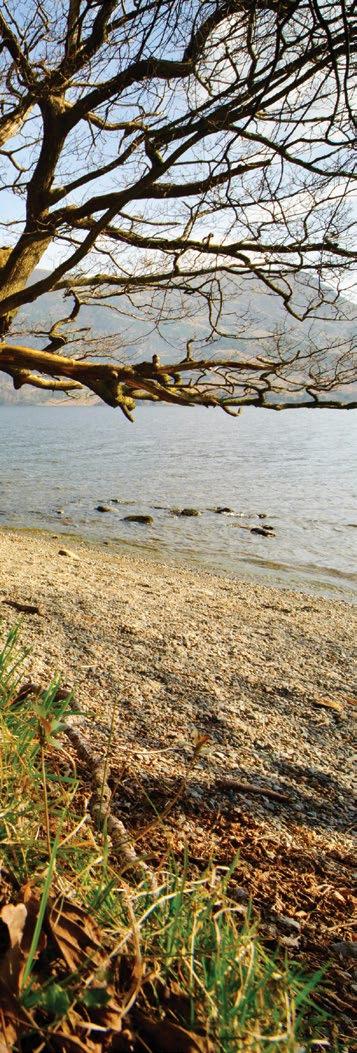
ULLSWATER THE LAKE DISTRICT
“I Wander’d Lonely As A Cloud”
William Wordsworth

William Wordsworth is synonymous with the Lake District. Inspired by the region’s rolling hills and swooping valleys, the work of this Romantic poet is incredibly evocative of summer days spent by the lakes.
Born in Cockermouth, Wordsworth spent his youth in the Lakes and so beloved was his home turf, that he published Wordsworth’s Guide Through the District of Lakes in 1820. Many credit its publication with the first surge of mass tourism to the region.
His most famous poem, "I Wander'd" was inspired by a walk in the woods behind Gowbarrow Park in Ullswater with his sister Dorothy, where the siblings came across a vibrant belt of daffodils.
Dorothy wrote in her diary of that day, “I never saw daffodils so beautiful. Some rested their heads upon stones as on a pillow for weariness and the rest tossed and reeled and danced and seemed as if they laughed with the wind that blew upon them over the lake.”
“ I wander'd lonely as a cloud That floats on high o'er vales and hills, When all at once I saw a crowd, A host of golden daffodils ”
HIGHLANDS SCOTLAND
“High Land” Jackie Kay

Think of poems about Scotland, and the verses of the illustrious Robert Burns are sure to spring to mind, writing with satirical yet sentimental affection for Scotland’s peaks, valleys and characterful countenance.
But beyond the beauty of the lochs and charm of the glens, today’s national poet of Scotland, Jackie Kay,
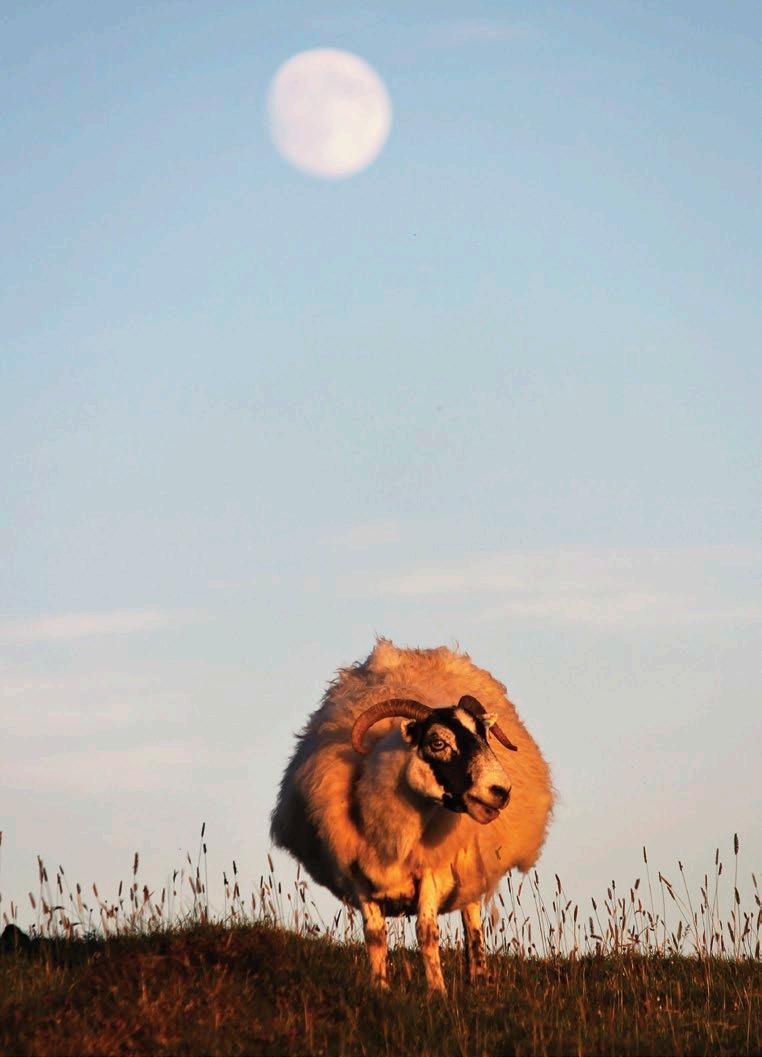
finds beauty in some more unlikely places.
Her short poem, “High Lands” pays heed to the more forgotten corners of Scotland, and the quiet moments of intimacy that gain more power by dint of happening in these forgotten spaces.
As Makar of Scotland, Kay feels great responsibility to these outlying Scottish places.
As she explained to The Guardian in 2016, the year she became the Makar, “Often big cities get all of the attention, but I would like to address the people of the islands and the peninsula.”
“ All I remember in the highland nightthe sheep loose outside, the full moon smoking in the sky –was that you led me and I led you. ”
“ The pond was calm the sky was new your voice was soft your lies were true… We sat there and the light shone through the leaves and we admired the view. ”

CLAPTON POND LONDON
“On Clapton Pond at Dawn”
Kate Tempest

Winner of the Ted Hughes Award, Kate Tempest often draws inspiration from some of Britain’s more overlooked beauty spots.
In “On Clapton Pond at Dawn”, a tender moment is beautifully facilitated by this small spot of Hackney greenery. The pond itself has been enjoyed by leisure seekers for hundreds of years, a tradition that has continued thanks to great renovation efforts from the Clapton Pond Neighbourhood Action Group in recent years.
Tempest isn’t the first poet to be inspired by the pond. Playwright Harold Pinter wrote some verses in 1977 in memoriam for his English teacher, Joseph Brearley. The wistful verses ended, “I’m at your side, Walking with you from Clapton Pond to Finsbury Park, And on, and on.”
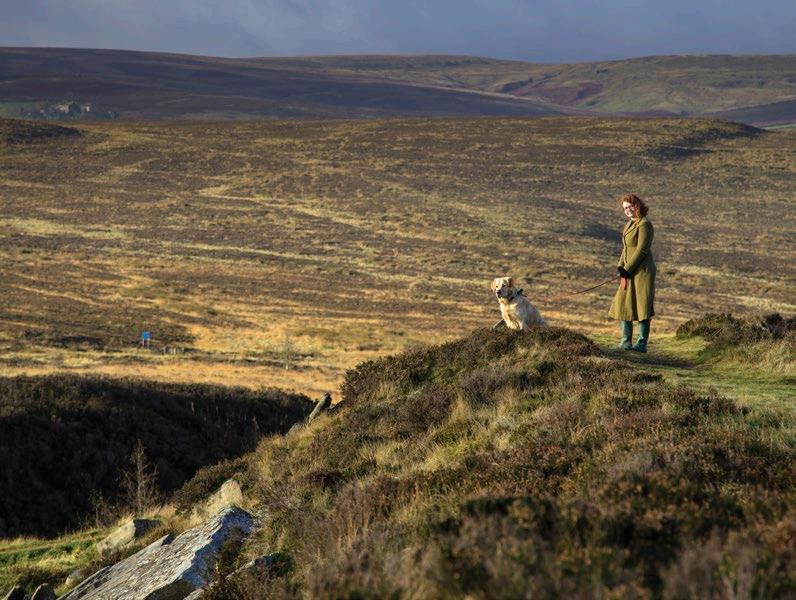
“ But lovelier than corn-fields all waving In emerald, and vermeil, and gold, Are the heights where the north-wind is raving, And the crags where I wandered of old. ”
HAWORTH MOORS
WEST YORKSHIRE
“Loud Without the Wind Was Roaring”Emily Brontë

It’s impossible to separate the passionate writing of Wuthering Heights author Emily Brontë from the gloomy majesty of the moors.
Growing up in Haworth, a small mill town surrounded by countryside, a shy, young Emily was fascinated by the austere beauty of the moors.
In a memoir of her beloved sister, who died of tuberculosis when she was just 30, Charlotte Brontë wrote: “My sister loved the moors. Flowers brighter than the rose bloomed in the blackest of the heath for her; out of a sullen hollow in a livid hillside her mind could make an Eden.”
Visitors to Haworth can enjoy exploring the parsonage the Brontë siblings called home, as well as rambles around the moors that inspired their writing.

HARROW LONDON
“Ode to Harrow”
Daljit NagraHarrow may strike readers as an unusual subject for a love poem, but Daljit Nagra captures the beauty of the north-west London borough in such arresting language, it’s hard to resist its charms.
Paying homage to the borough that Lord Byron, Winston Churchill and
“

Jawaharlal Nehru have called home, he celebrates market stalls buckling under the weight of plantain or guavas and the cricket games happening alongside Zumba classes.
Few places offer such a glowing vision of multicultural Britain. Why not pay a visit to the Harrow Arts Centre where every night boasts entertainment from the world of theatre, art and music, or experience Headstone Manor and Museum, which charts an impressive 1,200 years of Harrow history.
All shades to the good in my heartfelt Harrow with its Metropolitan Line for the sticks or the city! Look at us side by side and mucking-in for the graft for Harrow's no one's centre - everyone's home! ”

WINCHESTER HAMPSHIRE
“To Autumn”
John KeatsWritten during his stay in the city in 1819, Keats’s ode to the city of Winchester was inspired by his daily walks through Cathedral Close and water meadows to St Cross. By all accounts, his stay was a welcome break from an otherwise troubled life, with bouts of ill health and his
infamously ill-fate, forbidden love for Fanny Brawne.
Reflecting on the city in his letters that same year, the poet described Winchester as “An exceeding pleasant town, enriched with a beautiful cathedral and surrounded by fresh-looking country.”
Visitors to the city can enjoy a charming self-guided walk taking in the sights that inspired the poet, from the city to St Cross. Maps of the route are available from visitwinchester.co.uk/keats-walk.

“ Hedge-crickets sing; and now with treble soft The redbreast whistles from a garden-croft, And gathering swallows twitter in the skies. ”
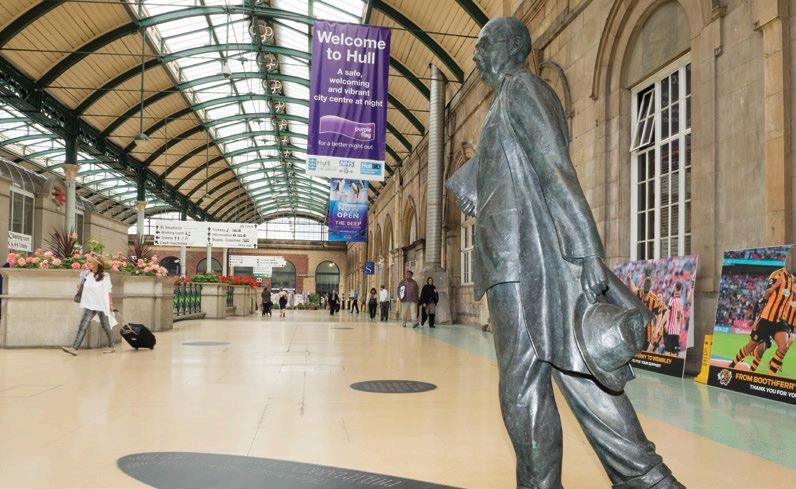
“ Swerving east, from rich industrial shadows
And traffic all night north; swerving through fields
Too thin and thistled to be called meadows ”
HULL EAST YORKSHIRE
“Here”
Philip Larkin

Whether or not Philip Larkin loved the city in which he served as university librarian as much as the city undoubtedly loves him is uncertain.
He accepted the post in 1955 and held it until his death some 30 years later, so there must have been some affection there, despite the disparaging tone of much of his poetry about the city.
Among other names he called Hull “a hole” and “a dump”, although he did also refer to it as his “lonely northern daughter” and, infamously, “very nice and flat for cycling.”
In “Here”, Larkin longs for more pastoral scenes, as Hull is densely hemmed in by a thick, industrial landscape and little greenery.
Visitors to the city can now pay their respects to the poet by visiting a 7ft statue of him in the railway station, designed by Martin Jennings and erected as part of Hull’s year as City of Culture.
Do you have a favourite poem about Britain? Email readersletters@readersdigest.co.uk and share it with us
You’ve got a story to tell.
With Lulu’s publishing tools, you can take the next step and turn your story into a book. Sharing your story has never been easier with Lulu's easy to use publishing, print and selling tools.
But we don’t stop there. Lulu is your one stop shop for all things Indie Publishing!
Global distribution to all major online book retailers including Amazon
Open access to our print API (learn more at: developers.lulu.com)
RDJUNE
eCommerce integrations with Shopify (learn more at xpress.lulu.com/shopify)
To sweeten the deal, Lulu is offering a voucher for 10% off any print product! Just use the code RDJUNE at Lulu.com to find your next inspirational story or order some copies of your own masterpiece!
Use code RDJUNE for 10% off all print products. One use per customer. Cannot be combined with other offers. Expires 31 December 2018.
Indie Publishing Since 2002 • Lulu.com
After thousands of entries—and months of voting—we can finally reveal the winners of our short-story competition
WINNERS
Now in its eigth year, our 100-word-story competition continues to grow in popularity. The entries have flooded in during the past few months but while we’ve enjoyed reading every story, only a few can come out on top! You, our readers, voted to whittle the shortlist down to the ultimate winners—revealed overleaf. The finalists will also be published in an anthology, thanks to our sponsor Lulu

Since 2002, Lulu.com has powered the knowledge sharing economy as the leader in open publishing, empowering creators of all kinds—individuals, publishers, educators, and enterprises—to publish and sell while enabling buyers to discover new knowledge. Powered by a global print-on-demand network and distribution system, and a social content discovery engine, Lulu helps creators make and monetise content in a variety of formats, including physical books and eBooks. Lulu is proud to partner with Reader's Digest to offer burgeoning authors the chance to get their content seen through the 100-word-story competition. Lulu strives to redefine the future for all publishers and provide creators with even more freedom.
Winner
MONKEYS WITH MONEY AND GUNS
by Matt Soden, ChelmsfordShaving the chimp and getting it into a suit was one thing, but getting it elected? Madness. Gullible, yes. The people weren’t stupid…were they? Sure, he looked like a businessman and he had even learned to talk, but what he knew about running a country you could write on the outside edge of a dollar bill—plus the animalistic urges remained. Less fiscal, more fist-full.
Let the people decide! Oh, I didn’t think…The world waited to see how this monkey business would end, as he sat beating his chest, staring at the big red button on his desk.
by Noah Russell, Kent Runner-upRunner-up
CONSIDERING THE WEATHER
Two boys lay in the grass, considering the weather. “The sun is very strong,” said one to the other. But under the tree, inamongst the roots, it was cooler. The bells of the church rang out, the sound rushing through the soil, sending bone-quivering quakes down their spines.
St Mary’s stood tall in its fertile grounds, the deep, green blades surrounding it appearing like an algae-covered lagoon, spattered with engraved, jutting rocks; the central spired building, a great flint island. In the yews, blackbirds hopped from branch to twig. The boys’ headstones cast arching shadows across where they lay.
ENCROACHMENT
by Penny Blackburn, Tyne and WearHe presses the piano key, frowns. The soft, muffled sound does not match the crystal sharp note in his head. Not yet 30, his hearing has aged beyond him.
Normal conversation has become impossible and he socialises rarely now, to hide it. He rages at the silence that encroaches further each day, feels a spasm of pain when he thinks of the music that is lost to him.
He rests his head on the piano surface, feels the note’s vibration. This is what will be left when his world falls silent. Someone calls him: ‘Ludwig! Ludwig!’
He does not hear.

THE JUDGES SAID:
“We were really impressed by the sheer ambition and scope of Matt’s story. Literature has always played an important part in voicing some of our deepest fears and concerns as human beings in politically turbulent times, and this piece echoes the tradition with great force and pithiness.
Discerning commentary is definitely Matt’s forte and we look forward to seeing more of it in the future.”
MATT SAID:
“I had no idea what I was going to write, I just wanted to start with a strong opening line and so the chimp in the suit came first. Then it was just a case of finding a big but…and what could be bigger than getting it elected? It just kind of flowed from there.
I’m beyond happy to have won and can’t wait to see my story illustrated and in print in Reader’s Digest.”
Winner
GAME OF SCONES
by Quinn Williams, 11, EssexI sat among my arch enemies: biscuits, cakes and worst of all—eclairs. I’m a scone (for those of you who don’t know what a scone is, it is a crumbly thing that posh British people eat with jam and cream while holding a cup of tea and going, “ahhh.”) It was almost time. The big moment—the afternoon tea. We sat on the tables, people started filing in. The eclairs were instantly snagged by the children—classic manouvere there. The adults nibbled on…biscuits? This wasn’t right. After 40 sad minutes, I was thrown away. No one likes scones.
THE STORM
Layla Farmer, 10, Porlock Runner-up
This day, when the storm awakens, the black cat rises out of the sea. With foam shaping in its jaws, it slashes its talons at the raging waters, waves forming and hitting the land like a bullet.
Fishermen’s ships cascade into the depths of the water, never to be seen again. The young lads at the sea-shore yell and dive for cover, but it is too late.
Waves crash over, pulling them into the blue world below, but they escape just in time, for the black cat pounces onto the pier. Boats scatter, and the black cat settles to rest.
Runner-up
WHY CATS AND DOGS AREN’T FRIENDS
by Fiona Stewart, 10, SurreySome years ago, though you may not believe it, cats and dogs were best friends. However, one day Kitty (a cat) suggested that they play Scrabble since they were all lazily lying around. Everyone agreed.
Usually, animals play games that are in their own language, but on this occasion, they decided to play with an English version instead. Dogs learn commands from humans and because of this the dogs knew more English, so they won and the cats lost.
They left, no longer friends but now worst enemies, all because of one game. And that is why cats hate dogs.
THE JUDGES SAID:
“We loved the sense of fun in Quinn’s story and his delightful flair for creating such a distinct (and unusual) character.
There’s a real variety of tones at play here: drama, humour, tragedy, nostalgia: it’s an impressive feat to unleash them all within just 100 words!
Quinn has a real talent for comedy, and we hope he writes more in the future.”
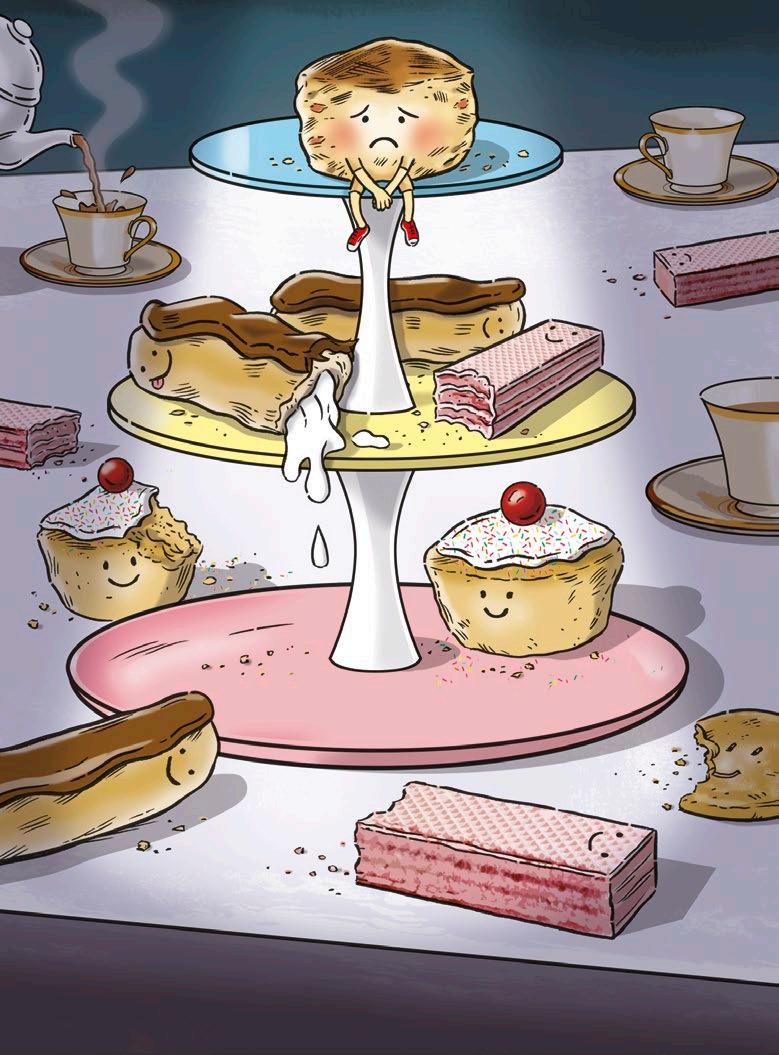
QUINN SAID:
“
My ambition is to become an author, so I feel very proud and privileged to have won!
I enjoyed reading the other shortlisters and thought I had some stiff competition. I was inspired to write Game of Scones when the 2Cellos’ version of Game of Thrones came on and I’d had a scone for breakfast (not something I do every day). The idea sprung into my head and Game of Scones was born!”
Winner
THE THREADED HEART
by Aaysha Ahmad, 15, BuckinghamshireYour stitches come undone, so you pick up a needle and begin sewing with your heartstrings. Honey as adhesive, silk as tape, your slits bind together, until fresh planes of skin begin emerging. Bit by bit. Layer by layer. And moment by moment, you’re healing.
Heartbreaks are just surgery. Grazes are just stories. Somehow you have managed to turn destruction into a delicate piece of art. You bleed with a smile and then paint with the red, as the phantasmagoria you romantically call life repeats itself: your stitches come undone again. But your heart can only offer so much string.
Runner-up
THE AISLE
by Catherine Kerr, 17, OmaghThe woman walked slowly down the aisle. Up ahead, she could see the man she loved, looking down at his hands, thinking. Her own hands were wrapped around flowers: red roses. Pretty. She smiled. All around her were people, and in the background, she could hear soft music playing. A piano, humming through the air. A love song. She reached her fiancé at last and looked deep into his kind, loving eyes…“Baked beans for tea?” He asked, holding up a Heinz tin.
“Sure,” she replied, placing the flowers in the shopping trolley. Together, they walked slowly down the aisle.
Runner-up
COLOUR BLIND
by Evie Mclean, 16, ShropshireOnce, a girl told policemen the Indian neighbours had stones thrown through their windows. She defended the boy with dreadlocks when others tried to cut his hair. She got punched for stopping a bully removing a girl’s hijab. When people have no issue with another’s skin colour, or the style of their clothes, are they colour blind or are they living in a world where everything around them is as multicoloured as multicultural? When she came out, her parents disowned her. But those she had stood by stood by her. It didn’t matter that she was white, and they weren’t.
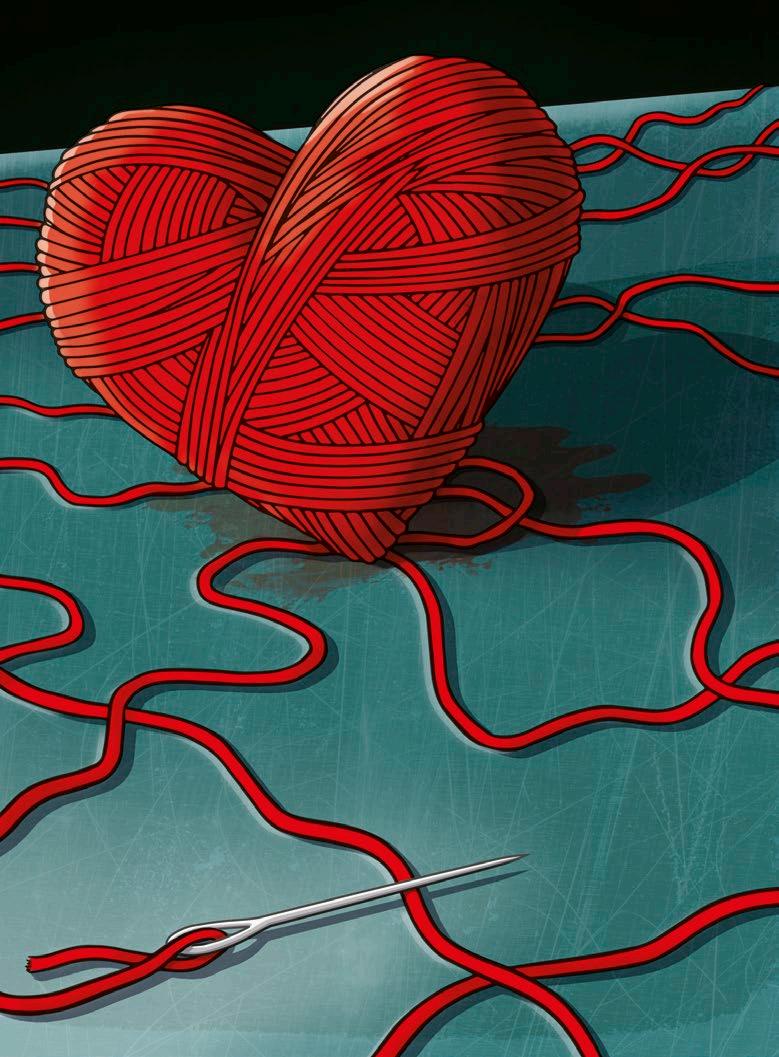
THE JUDGES SAID:
“There’s something incredibly tactile and visceral about Aaysha’s standout story. She manages to capture the perpetual process of looking for love, having your heart broken and healing again—a journey we all go through— with both delicate poeticism and manual-like pragmatism. We were blown away by this 15-year-old’s wisdom and deliberation, and hope she continues writing moving, soul-searching prose.”
AAYSHA SAID:
“I am absolutely delighted that this many people took my story to heart! The word ‘heal’ has overwhelmingly positive connotations, so I sought to illustrate its uglier side—the raw, honest truth. I’m glad people saw the message and realised that healing isn’t always accomplished with just silk and thread.”
Britons freed from Timeshare misery
ENJOYING THE SUN and sea of a holiday abroad should be one of life’s great pleasures. Therefore the idea of being able to guarantee a place at your favourite destination has great appeal. Unfortunately, for many timeshare owners that dream of reserving your own special spot appears to be turning into the holiday millstone from hell.
An increasing number of reports of contracts that can’t be broken are now coming to light daily. Mr & Mrs Millar, a couple who have encountered such problems had this to say: ‘We have not used it (their timeshare) much because we cannot get what we want, and now not only do we have to pay maintenance fees but also a charge for each point that we use, so in effect paying twice’.
Of the 600,000 timeshare owners in Great Britain, thousands find themselves in a similar situation.
However, the good news is that there is now a way out of the timeshare trap. Following a change in legislation, a specialist firm called Timeshare Compensation achieved an unprecedented success rate in breaking onerous contracts that were set to run for years, even after the demise of the policyholder. For some claimants, the experience has proved even more worthwhile with the knowledge that they

qualify for significant compensation under misselling laws.
Jodi Beard, a spokesperson for Timeshare Compensation said: “Frequently, it is not until an owner sees exorbitant hikes in maintenance fees, poor availability or attempts to exit that they understand how one-sided the contract is. In addition, a new company can take over and increase fees or devalue your entitlement by means of a spurious points exchange scheme.”


For too long owners have been at the mercy of unscrupulous management companies intent on maximising income with no regard to the distress and hardship they
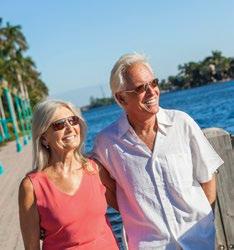




Another customer, Mr Harris, who signed up to the service had this to say:
‘I can say that the experience with you has been very professional.
I have been told that our claim has been accepted and we have received £14,000 in compensation. I would recommend your services to other timeshare owners.’
The reality is that today, timeshare ownership can quickly turn from a dream into a nightmare. To avoid the pitfalls, the best





advice is to seek expert professional help. Timeshare Compensation have a dedicated team that are ready and waiting to take your call. They are perfectly positioned to achieve redress for any unhappy timeshare owner. Testimony to their success can be found in their recent 204 page free reviews’ guide. Discovering whether you are eligible for a claim is simply a matter of calling their freephone number where you will be asked a series of questions to help evaluate your claim and the potential level of compensation. Claims may also be made even after timeshare ownership has ceased.
To obtain a free reviews’ guide
FREEPHONE 0800 066 3034.


a mexico holiday club owner has received £21,160 in compensation thanks to our help.
mexico holiday club owner has received £21,160 in compensation thanks to our help.


Were you mis-sold?
Were you mis-sold?
Have your management fees increased way beyond the rate of inflation?
Have your management fees increased way beyond the rate of inflation?
Were you told that your purchase was an investment?
Were you told that your purchase was an investment?
We decided to exit and claim because when we wanted to book a holiday through our resort we struggled to find quality accommodation. You have exceeded my expectations with the timescale. You made the process look simpler than I expected it to be. My overall experience has been really positive. I would recommend you to any of my friends and family. – Mrs Gratrick
decided to exit and claim because when we wanted to book a holiday through our resort we struggled to find quality accommodation. You have exceeded my expectations with the timescale. You made the process look simpler than I expected it to be. My overall experience has been really positive. I would recommend you to any of my friends and family.


Were you originally told that exchanges were easily obtainable but since found out that was untrue?
Were you originally told that exchanges were easily obtainable but since found out that was untrue?


Was it explained that your family could become liable to take over the contract if something happened to you?
Was it explained that your family could become liable to take over the contract if something happened to you?
Did you sign a purchase agreement that could possibly be illegal?
Did you sign a purchase agreement that could possibly be illegal?
Were promises made to you, that you later found to be untrue?
Were promises made to you, that you later found to be untrue?









Were you forced into upgrading your timeshare?
Were you forced into upgrading your timeshare?
Did you buy your timeshare on finance?
Did you buy your timeshare on finance?
Were you later charged hidden fees?

Were you later charged hidden fees? Timeshare owners have been awarded compensation of the full purchase price, plus maintenance costs, plus legal fees running into thousands of pounds.
Timeshare owners have been awarded compensation of the full purchase price, plus maintenance costs, plus legal fees running into thousands of pounds.

















Many timeshare owners are unaware that they NOW could be entitled to LARGE amounts of compensation from resorts due to a recent court ruling made in early 2016. Understandably, resorts are highly unlikely to give this information to timeshare owners. Since early 2016 more and more owners are having their contracts deemed null and void, due to Illegal purchase agreements. At Timeshare Compensation, our in-house legal team are here to help with your enquiry.

Featuring a religious leader, a style icon, and a pair of star-crossed lovers, we present some world-famous ...
Balcony SCENES
BY CORNELIA KUMFERTNO BALCONY IN THE WORLD has borne more Popes than the Vatican’s Loggia delle Benedizioni. Every new Pope since the 17th century has appeared before the public on the central balcony of St Peter’s Basilica. The Pope also gives his “Urbi et Orbi” blessing from here at Christmas and Easter, giving the balcony its name, which translates as “Loggia of the Blessings.”


MISS PIGGY AND KERMIT THE FROG may be The Muppet Show’s best-known characters, but don’t forget Statler and Waldorf, the two curmudgeonly old men who call out acerbically humorous remarks from the puppet world’s most famous balcony.
THE BALCONY OF THE AMBASSADOR HOTEL in New York sprang to prominence when Marilyn Monroe, 28, was photographed there. Keen to take her career to new heights, the style icon wanted the world to see that there was more to her than the “dumb blonde” of her earlier movies.

THE CAST-IRON BALCONIES of New Orleans were nearly lost for good in the early 20th century. Plans to beautify the city included the removal of the verandas, which had mostly been made by black craftsmen. Fortunately, this idea didn’t find favour with everyone, and many of the balconies were allowed to stay. They remain an intrinsic part of the city’s image.

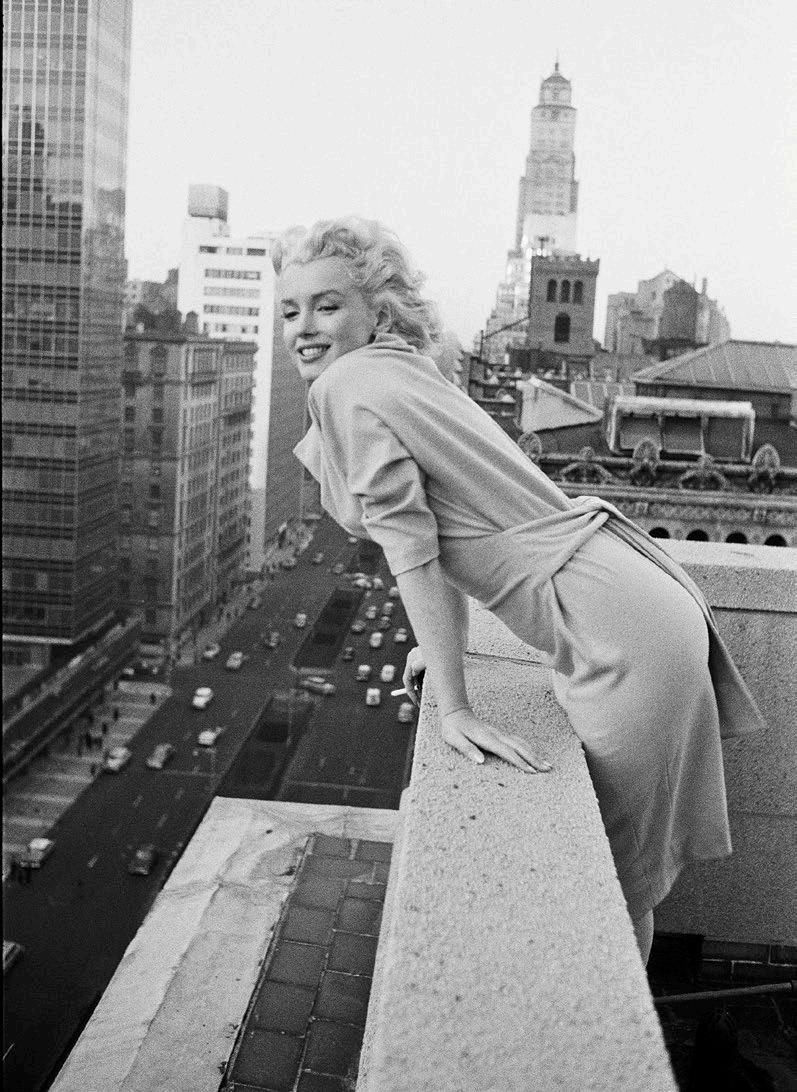

IF YOU WANT TO ADMIRE the royal box of Milan’s La Scala from the inside, you will either need to book a guided tour of the famous opera house or hope for an invitation from the Italian President. The opulent theatre balcony is reserved for leading lights from the world of politics and foreign dignitaries.

ONE OF THE MOST romantic balconies is actually a sarcophagus! In the early 20th century, the people of Verona, Italy, were so tired of telling the flocks of tourists that the balcony in Shakespeare’s Romeo and Juliet didn’t exist that they cobbled one together from an old coffin.
A TENDER KISS that captured the public’s imagination. Kate Middleton and Prince William tied the knot in 2011. Like William’s parents Prince Charles and Lady Di before them, the newlyweds appeared on the balcony of Buckingham Palace after their wedding service.
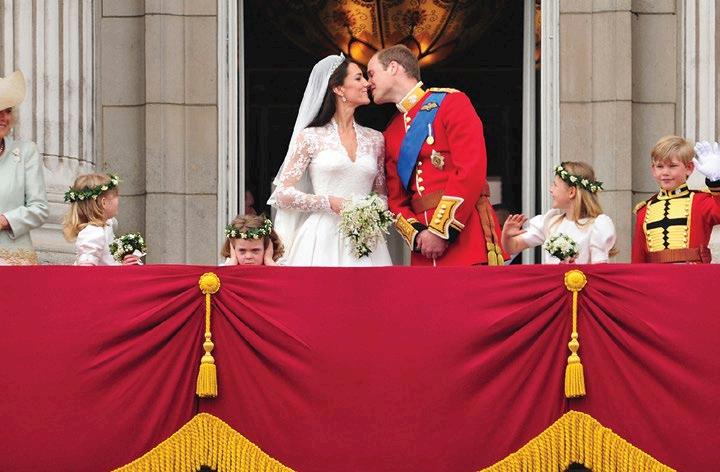

Day 1: Depart UK
Day 1: Depart UK


22-DAY AWARD-WINNING TOUR
THE WONDERS OF
THE WONDERS OF 22-DAY AWARD-WINNING TOUR
Fly with Qantas / Emirates from your most convenient airport: London Heathrow, Manchester, Birmingham, Newcastle or Glasgow.
Fly with Qantas / Emirates from your most convenient airport: London Heathrow, Manchester, Birmingham, Newcastle or Glasgow.
Days 2-4: Singapore
Days 2-4: Singapore
Enjoy a city tour including Marina Bay and the fabulous orchid gardens. As an alternative, you may choose to stop in Dubai at no extra cost.
Enjoy a city tour including Marina Bay and the fabulous orchid gardens. As an alternative, you may choose to stop in Dubai at no extra cost.
Days 5-7: Melbourne
Days 5-7: Melbourne
Visit Captain Cook’s cottage, Victoria Markets, Federation Square and the MCG. Enjoy two Freedom Days in Melbourne. Perhaps take an optional excursion to explore the Great Ocean Road, or take a trip to view the Fairy Penguin Parade.
Visit Captain Cook’s cottage, Victoria Markets, Federation Square and the MCG. Enjoy two Freedom Days in Melbourne. Perhaps take an optional excursion to explore the Great Ocean Road, or take a trip to view the Fairy Penguin Parade.
Service Rating:
Service Rating: 498 reviews 99.6%
Days 8-9: Adelaide
Days 8-9: Adelaide
We take a sightseeing tour of the city’s historic buildings and attractive parks and gardens. Our Freedom Day gives us an opportunity to tour the famous wine region of the Barossa Valley, or possibly visit Kangaroo Island.
We take a sightseeing tour of the city’s historic buildings and attractive parks and gardens. Our Freedom Day gives us an opportunity to tour the famous wine region of the Barossa Valley, or possibly visit Kangaroo Island.
Day 10: The Ghan
Day 10: The Ghan
Experience one of the world’s most iconic rail journeys. Covering 1,555 kilometres, we pass golden wheat fields, vast sheep stations, rugged mountain ranges, salt lakes and the contrasting landscapes of the fiery red earth and the cobalt blue skies. Whilst on board, all our meals are included as are a wide selection of alcoholic and nonalcoholic drinks.
Experience one of the world’s most iconic rail journeys. Covering 1,555 kilometres, we pass golden wheat fields, vast sheep stations, rugged mountain ranges, salt lakes and the contrasting landscapes of the fiery red earth and the cobalt blue skies. Whilst on board, all our meals are included as are a wide selection of alcoholic and nonalcoholic drinks.
Days 11-12: Alice Springs
Days 11-12: Alice Springs
Visit the Royal Flying Doctor Service, the School of the Air, and the Old Telegraph Station. Take an optional hot air balloon trip
Visit the Royal Flying Doctor Service, the School of the Air, and the Old Telegraph Station. Take an optional hot air balloon trip
INCLUDED WITH DISTANT JOURNEYS
INCLUDED WITH DISTANT JOURNEYS
+ All scheduled flights
+ All scheduled flights
+ A choice of UK airports
+ A choice of UK airports
+ A choice of stopovers
+ A choice of stopovers
+ Four star accommodation
+ Four star accommodation
+ All breakfasts worth £349 PP
+ All breakfasts worth £349 PP
+ Local tour managers & guides
+ Local tour managers & guides
+ All-inclusive on The Ghan
+ All-inclusive on The Ghan
+ Five city sightseeing tours
+ Five city sightseeing tours
+ Tour of Uluru
+ Tour of Uluru
NEW ZEALAND
23 DAYS FROM £3,995PP
12
+ Great Barrier Reef
+ Great Barrier Reef
+ Sydney lunch cruise
+ Sydney lunch cruise
+ Flexible stopover options
+ Flexible stopover options
+ No surcharge guarantee
+ No surcharge guarantee
+ 100% ATOL protection
+ 100% ATOL protection
INDIA
SOUTH AFRICA
Terms
£198
18
12 DAYS FROM £2,195PP
18 DAYS FROM £3,295PP
and is subject to the availability of flights and accommodation.



FROM ONLY £4,995 PER PERSON

over the outback landscapes or an excursion to the Western MacDonnell Ranges.
over the outback landscapes or an excursion to the Western MacDonnell Ranges.
Day 13: Uluru (Ayers Rock)
Day 13: Uluru (Ayers Rock)
We enjoy a refreshing glass of sparkling wine and witness the changing colours as the sun sets over Uluru.
We enjoy a refreshing glass of sparkling wine and witness the changing colours as the sun sets over Uluru.
Days 14-17: Cairns & The Great Barrier Reef
Days 14-17: Cairns & The Great Barrier Reef
Snorkel in the sheltered coral lagoon and view the reef from the semi-submersible reef viewer or underwater observatory. Lunch is included. Optional tours in Cairns include a scenic railway journey to Kuranda, and a day trip to the Daintree Rainforest.
Snorkel in the sheltered coral lagoon and view the reef from the semi-submersible reef viewer or underwater observatory. Lunch is included. Optional tours in Cairns include a scenic railway journey to Kuranda, and a day trip to the Daintree Rainforest.
Days 18-21: Sydney
Days 18-21: Sydney
A morning’s tour includes the beautiful waterside suburb of Bondi. We continue to Hyde Park and the Royal Botanical Gardens. The tour finale is a fabulous luncheon cruise with amazing views of the Opera House and Harbour Bridge. Why not visit the spectacular World
A morning’s tour includes the beautiful waterside suburb of Bondi. We continue to Hyde Park and the Royal Botanical Gardens. The tour finale is a fabulous luncheon cruise with amazing views of the Opera House and Harbour Bridge. Why not visit the spectacular World
Heritage listed Blue Mountains? They are a perfect example of native Australian bushland, with gum trees and deep gorges stretching as far as the eye can see.
Heritage listed Blue Mountains? They are a perfect example of native Australian bushland, with gum trees and deep gorges stretching as far as the eye can see.
Day 22: Arrive UK
Day 22: Arrive UK
We arrive into your chosen airport; London Heathrow, Manchester, Birmingham, Newcastle or Glasgow.
We arrive into your chosen airport; London Heathrow, Manchester, Birmingham, Newcastle or Glasgow.
Book by 30th June 2018 and enjoy a two night homebound stopover for only £99 per person (£198 for singles). Stopover choices are Hong Kong, Singapore, Bangkok or Dubai and include return transfers and four star accommodation with breakfast.
Book by 30th June 2018 and enjoy a two night homebound stopover for only £99 per person (£198 for singles). Stopover choices are Hong Kong, Singapore, Bangkok or Dubai and include return transfers and four star accommodation with breakfast.
BOOK BY 30 JUNE 2018 £492
£99 RETURN STOPOVER
*This tour has a slightly altered itinerary.
*This tour has a slightly altered itinerary.
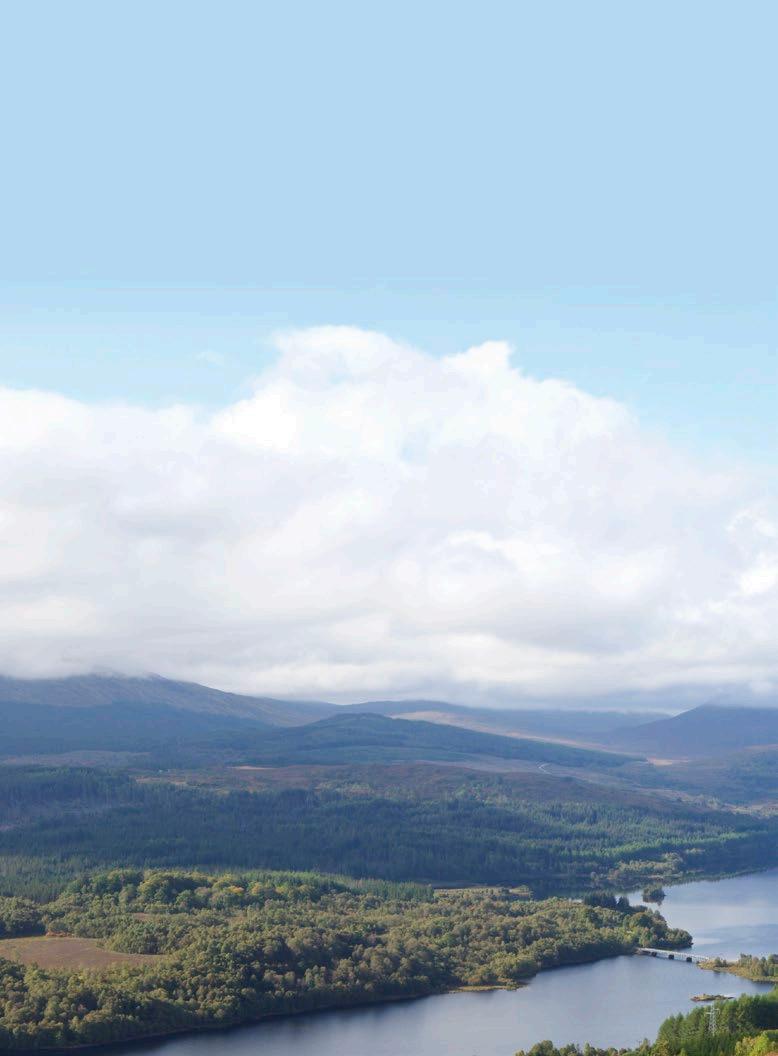
My Great Escape:
Highland Heaven
Sue Davina Watt from Fife discovers the enviable beauty of sunny west Scotland
Since moving to Scotland in 1975, I’ve been told many times that there’s no better place to be than the west of Scotland on a good day. My husband Ian and I recently experienced this during a short break in Fort Augustus.
We stayed in a beautiful cottage called Ardgay, situated adjacent to the canal. Recently decorated, and situated close to the local shops and restaurants, it provided everything we needed.

Each day we took an energising walk or jog along the towpath beside the Caledonian Canal. The early morning fog usually cleared to give
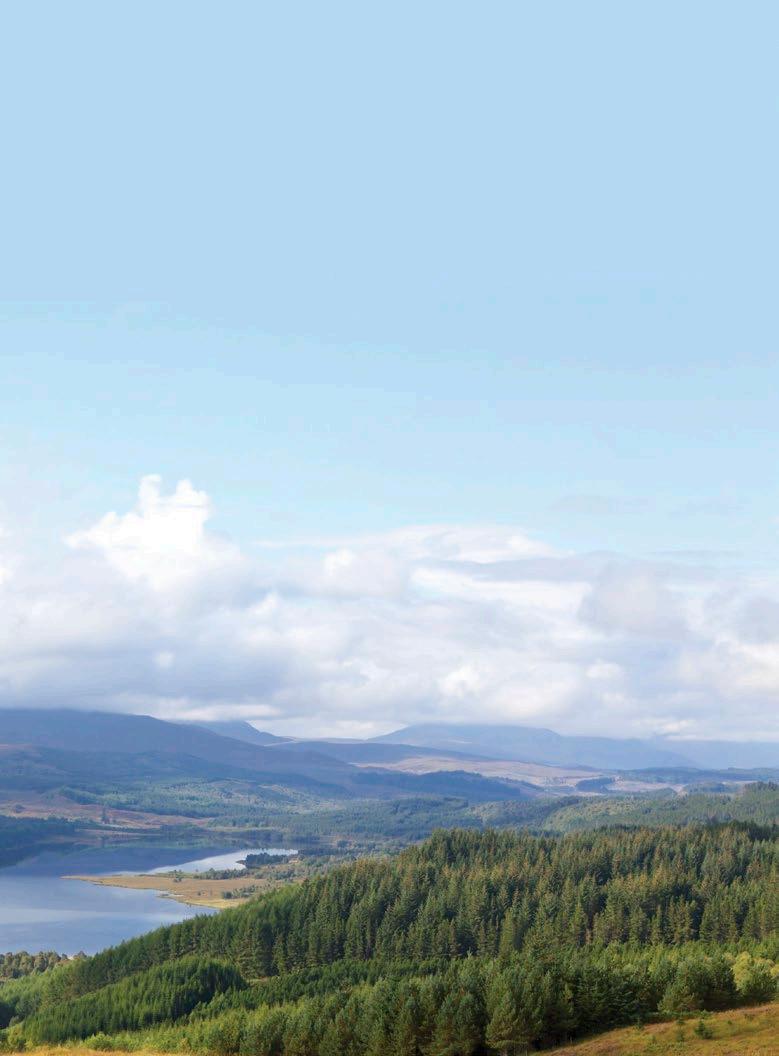
brighter weather; an unblemished blue sky, warm sunshine, and not a breath of wind.
On several evenings, we sat by the lock gates where the canal enters Fort Augustus. Armed with piping hot fish and chips from the local chippy, we watched the cruisers passing through as they journeyed to or from Loch Ness. The gates themselves were fitted with coloured background lights which shone through the water as darkness fell— the canal cascading over the lights in an emerald-green waterfall.
On the final day of our holiday we drove up to Kyle of Lochalsh, travelling past Loch Garry (pictured), Loch Loyne, and Loch Cluanie on our journey. The weather remained idyllic and we gasped in delight at the gallery of picturesque scenes that were revealed behind every corner.
A mirror image of the surrounding mountain peaks was displayed in

each loch along the way and tourists were practically abandoning their cars to enjoy the amazing views.
Our road trip came to a close at Cluanie Inn where we enjoyed a traditional treat of hot chocolates and shortbread, and were rewarded with the sight of a passing Scottish stag sporting impressive antlers—a perfect end to our day.
Tell us about your favourite holiday (send a photo too) and if we print it we’ll pay £50. Email excerpts@readersdigest.co.uk
SAFARIS: A WALK ON THE WILD SIDE
FOR FIRST-TIMERS: CLASSIC SOUTH AFRICA
Safari virgin? Combine Cape Town, the Winelands and the Garden Route with some wildlife-watching. Malariafree, affordable Amakhala Game Reserve boasts four-star lodges and all the Big Five: lions, leopards, elephants, rhino and buffalo (bestofsouthafricatravel.com).
FOR GENEALOGISTS:
GORILLA-TREKKING IN RWANDA
Few experiences rival locking eyes with our distant relatives, and that spine-tingling flash of shared intelligence. Enjoy it in Rwanda’s Volcanoes National Park, courtesy of guided, gorilla-tracking hikes up stunning forested mountainside (expertafrica.com).
FOR ROYALISTS: ESCAPIST NAMIBIA
Rumoured to be hosting Harry and Meghan’s honeymoon, all-rounder Namibia blends wilderness—the massive, duned Namib Desert, the eerily-empty Skeleton Coast—with good infrastructure and its lush,


animal-packed Etosha National Park (timbuktutravel.com).
FOR BUDGET-WATCHERS: TWO-COUNTRY TOUR
Small-group tours offer a way to economise. Starting at Victoria Falls, Acacia’s comfy camping-based Southern African Safari promises Botswanan park game drives, walks with rhinos and time in re-energised Zimbabwe from around £1,050 (acacia-africa.com).
FOR DRAMA-LOVERS: DOUBLE UP IN KENYA
See two Kenyan animal migrations during one trip between July and September. First, watch wildebeest tensely cross the Mara River—and predators pounce—then spy humpback whales whooshing up the coast (hemingways-collection.com).
by Richard MellorTravel app of the month
SIX TRAVEL, FREE, IOS
Tantalised by a curated, Instagram-style feed based on personal preference—or searching via filters—users can book hotels, experiences and itineraries with a mere tap.









Save up to £600
on ten best selling guided tours pp


EXPERIENCE MUSICAL BLISS


Enjoy a toe-tapping tour of America’s most famed musical meccas: New Orleans, Memphis, and Nashville on the “America’s Music Cities” tour. Or, if the elegance of Quebec City and the thundering Niagara Falls, sounds unmissable, join “Best of Eastern Canada” tour.
DELVE INTO THE PAST
If history and heritage inspires you to travel, jump into the the story of America’s founding fathers from New York to Pennsylvania, Virginia, and Washington D.C. on the “Heritage of America” tour. Meanwhile, in Central and Eastern Europe, Collette will introduce you to an array of Europe’s historic and culturally-rich cities throughout Germany, the Czech Republic, Austria, Hungary, and Poland.

TRAVEL FAR AND WIDE
How about venturing further afield with the “Exploring Australia” or “Exploring New Zealand” tours? Diverse landscapes and cultures await as we bring out the best of this incredible continent.
AND SO MUCH MORE...
Also eligible are
California Coast
• Sunny Portugal
• Splendid Sicilia.

• Pacific Northwest & California
• Magnificent Cities of Central & Eastern Europe



Take advantage of SALE prices and save up to £600!
Plus, Reader’s Digest subscribers receive an additional five per cent o ALL tours. If you want to find out more about any of the ten best seller tours visit readersdigestguidedtours.co.uk or call 0800 804 8373 to speak to a travel advisor.




Rebuilding RWANDA
Despite the devastation of the genocide in 1994, when Tamara Hinson visited Rwanda, she found a country determined to rebuild

I’m sitting on a sundrenched patio, sipping what might just be the world’s best salted caramel milkshake. At a nearby table, a young woman with freshlymanicured nails taps away at her laptop, while her friend snaps a couple of selfies, then orders another espresso. But the setting isn’t Manhattan, Paris or London. It’s Kigali, the capital of Rwanda—a country shattered by by genocide in 1994.

When I visit, I discover one of the greenest, cleanest countries I’ve come across. There’s not a scrap of litter, and the city is filled with huge, leafy parks. I feel perfectly safe wandering along its wide, tree-lined boulevards well after sunset, although it’s hardly surprising—in 2017, the World Economic Forum voted Rwanda the world’s ninthsafest country and Africa’s safest.
Visitor numbers are rising, and tourists are venturing further afield. Years ago, the majority made a beeline to the gorilla-filled Volcanoes National Park, but these days, growing numbers are discovering Rwanda’s other treasures. They’re soaking up the arts scene in Kigali, spotting the Big Five in Akagera National Park or relaxing on the tea plantations near the protected Nyungwe forest.
My first observation is that the entire nation seems obsessed with bettering itself. At a Kigali supermarket, I find shelves filled with self-help books (more memorable titles include 100 Tricks To Appear Smart and So The B*****d Broke Your Heart: Now What?). And I’ve never seen kids skip to school so enthusiastically. I suspect that for locals of a certain age, this passion for self-improvement has its roots in Rwanda’s darkest days. One afternoon, my taxi driver, Pete, casually tells me he was just a boy when the genocide happened. He
“Refugees fled to countries colonised by the British, returning with a new-found love of cricket”
walked hundreds of miles to escape the killings, passing through Burundi and Tanzania. During the journey he saw feral dogs sniffing at corpses piled by the roadside. He missed out on a huge chunk of his education.
Like many young Rwandans, he’s determined to make up for lost time, and is studying hard in the hope of attending college abroad.
The relatively recent popularity of cricket is also tied to the country’s post-genocide recovery. Before 1994, Rwanda was a Francophone country. There was little interest in cricket.
During the genocide, refugees fled to nearby countries colonised by the British, returning with a new-found love of the sport. Eric Dusingizimana
Previous; View of Kigali from the North, colourful fabrics and woven goods displayed in a Kigali shop front in Rwanda
Clockwise L-R; Eric Dusingizimana, captain of Rwanda’s cricket team; inside the cricket grounds; a jungle in Nyungwe National Park, a boy diving into Lake Kivu; tea brands fund cricketing initiatives; a man on bicycle transporting a tin can; the genocide memorial
Next: A smiling group of elementary school children proudly wear their school uniform, Kigali







is the captain of the national cricket team. In 2016, to raise money for a new cricket ground, he broke the Guinness World Record for the longest individual batting session. He began batting at 8am (Tony Blair threw one of the many balls he deflected) and set a new record two days later.
I meet Eric at the old cricket ground, on the site of a college. Students sit on the grass, killing time before lessons. Before the genocide, this was home to the École Technique Officielle, a school run by catholic priests. It was also where UN peacekeepers set up camp, which is why thousands of Tutsis sought refuge at the site. When, on April 11 1994, the UN pulled out without warning, the Hutu militia waiting outside the gates stormed in, killing 2,000 Tutsis in a matter of hours.
For Eric, who studied civil engineering at university, the construction of a new cricket ground
wasn’t just about providing Rwanda’s cricketers with better facilities. It’s a symbol of the country’s recovery from genocide. On a guided tour of the site, Eric shows me the club house, with its beautiful curved roof. “It’s been designed to mimic the trajectory of a bouncing cricket ball,” he explains. The pitch is surrounded by raised, grassy banks and Eric tells me locals love to come and sit here, soaking up the spectacular views over Rwanda’s green hills. My favourite bit is the ground’s Yorkshire Tea Bar— the tea brand which purchases 15 per cent of Rwanda’s total tea production and finances various cricketing initiatives in the country.
As much as I’d love to join the locals sprawled on the grassy slopes, I’ve got a bus to catch. I’m heading to Lake Kivu, an enormous rift valley, freshwater lake which straddles the border between Rwanda and The Congo. It takes around four hours to get there by road. A private taxi

transfer would cost me around £150, but I choose the cheaper option—a £4 trip on a local bus.
My taxi driver pulls into Kigali’s dusty bus station, and it’s chaos— a tangled mess of belching, revving minibuses sagging low under the weight of their cargo, whether it’s the passengers shoe-horned inside, or the household appliances and sacks of fruit strapped onto roofs. Locals swarm around my taxi, banging on the windows. They’re ticket sellers, and my driver tells me to hand one of the men 4,000 Rwandan Francs— roughly £3.30. I pass some crumpled notes out the window and seconds later, the ticket seller reappears and passes me a bus ticket, printed with my name. He then swings my bags onto his shoulder and leads me to a nearby bus, where he shows me to my seat, piles my bags onto my lap and disappears into the crowd with a wave. Seconds later, I’m on my way to Lake Kivu.
“My driver was just a boy when the genocide happened. Like many, he’s determined to make up for lost time”
As we head up into the hills surrounding Kigali, the traffic thins and the trees thicken. The driver cranks up the radio and passengers sing along in Kinyarwanda, Rwanda’s national language. I try to resist the temptation to nod off but fail, and I’m woken when the Rwandan woman sitting next to me taps me and indicates I should catch 40 winks on her shoulder rather than doing my best impression of a nodding dog. But to doze off would be to miss Rwanda’s best bits. We chug through dusty villages filled with rainbow-


hued wooden houses, past fields of sugar cane and small towns where every other business seems to be a bicycle repair shop. It’s hardly surprising. As a keen cyclist I go everywhere by bike, and I’m rather proud of my ability to pedal home carrying a week’s shopping. But I’ve got nothing on Rwanda’s cyclists, who easily load up their bikes with everything from armchairs to huge bales of hay.
The other cargo of choice seems to be chunks of sugar cane the length of telephone poles, tucked under the arms of cyclists who still somehow manage to steer and brake. Others have dozens of plastic water tanks strapped to their back.
At one point, during an uphill traffic jam, I notice some cyclists perilously close to the back of a lorry grinding slowly up a hill. On closer inspection, I notice that they’re all clinging to the rear bumper of the
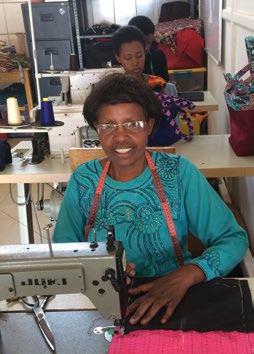
lorry as it slowly splutters up the steep incline. I’ve got the utmost respect for them, but can’t imagine adopting this approach on my weekly shop any time soon.
More organised chaos awaits in Gisenyi, a town on the banks of Lake Kivu. I’ve obviously got my helpless tourist look perfected, because it’s not long before a local comes to my rescue—in this case, an armed security guard outside a bank who asks me if I need help. I explain, in English, that I’m trying to get to a nearby hotel but he replies in Kinyarwanda and it’s clear he doesn’t understand. He disappears inside, only to reappear with the bank manager, who tells me he knows of my hotel and that he’ll be able to arrange for a taxi to come and collect me. Two minutes later a taxi arrives and I’m en route. I spend the rest of the day sprawled on a sunlounger on a palm-fringed beach at
Dangerous uphill hitchhiking in Rwanda; the Nyamirambo Women’s Centrethe beautiful Lake Kivu Serena Hotel. Back in Kigali, I finish my trip with a spot of retail therapy. Firstly at Go Kigali, a boutique inside the Kigali Marriott (the brand’s first SubSaharan property), where a string of gallery-style shops sells everything from paintings to colourful homeware—I settle for a coaster made from fabric-covered beer bottle caps.
My final and favourite stop is Nyamirambo Women’s Centre, an NGO launched by 18 Rwandan women in 2007. The aim of the project is to empower women by providing them with training, education and a source of income. It’s expanded to fill several buildings. There’s a library of donated books for local women learning to read and write, and in the beautiful boutique, shelves heaving with colourful children’s clothes, stuffed toys made from brightly-printed fabric and woven bowls in eye-wateringly bright hues. Next door, local women clatter away at sewing machines. Nadége, the sales manager, tells me that visitors can now sign up for cookery classes, site tours and craft workshops. This centre is one of several businesses set up to help empower Rwandans. Another favourite is Kigali-based Question Coffee, where coffee is made with beans grown on cooperatives run predominantly by female growers. Sadly, I’ve got a flight to catch.
As I head to the airport, moto-taxis (Rwanda’s main form of transport— there’s even an Uber-esque app for them) buzz past, local kids sashay down the streets in shirt-and-trouser combos sewn from colourfully printed swathes of kitenge (printed cotton fabric), and women catwalk to work in beautiful sarong-like mishanana. Suddenly, the onesie I’d pack to wear on the flight back to London looks rather boring.

Travel Tips
LODGING:
The Radisson Blu Hotel and Convention Center, Kigali, from £193 for a double room (radissonblu.com/en/hotels/ rwanda/kigali)
The Lake Kivu Serena Hotel, Lake Kivu, from £179 per double room (serenahotels.com/serenalakekivu/en/ default.html)
FLIGHTS:
RwandAir flies from London Gatwick to Kigali (via Brussels) three times a week. Return fares start from £374 pp. (01293 874922, RwandAir.com )
PARTNERSHIP PROMOTION

Uncover the unspoilt natural beauty of Bulgaria

Deep dive into Bulgaria’s melting pot of natural beauty, millennium old culture and ancient traditions on a walking holiday designed for single and solo travellers


If you want to surround yourself with sunshine while taking beautiful scenic walks and immersing yourself in uncovered culture then our Bulgarian guided tour is for you. Come and join us on our solo multi-activity adventure, handpicked specifically with the Reader’s Digest audience in mind and suitable for both the experienced and first-time single and solo traveller.
HOLIDAY YOUR WAY
Do you dream of breaking away from everyday life and going on a solo adventure where you can enjoy great food, meet likeminded new friends or simply explore a new place by yourself? Reader’s Digest have proudly partnered with Solos holidays to bring you tailor-made holidays for the solo traveller.
BULGARIAN BLISS
Bulgaria is the perfect place to unwind for the adventurous solo traveller; with spectacular sights to see and multiple walks to be had you’ll never be short of something to do. Our specialised guides will take you round this relatively undiscovered country on foot, by kayak, on horseback and on two wheels!
From waterfalls hidden in the Rhodope mountains to thriving pine forests and the traditional town of Trigrad, our Bulgarian guided tour gives you so much to explore— you’ll be spoilt for choice!
Bulgaria is one of the oldest countries in Europe, dating back to the Roman Empire.
THE TOUR
7 NIGHTS
FROM £1109
To name but a few of the trip’s highlight features; you’ll start off your holiday in the beautiful old town of Smolyan where you’ll encounter a medieval monastery and enjoy a welcoming dinner. As the week progresses you’ll be introduced to the Trigrad Gorge and the “Devil’s Throat” cave—a popular attraction for budding photographers. You’ll kayak through the calm, glistening water of the Beglika mountain lake with the help of a professional instructor and you’ll finish in the bustling capital city, Sofia for culture, great food and relaxation after an exciting, adventurous trip.
A solo trip is perfect for so many times of travellers. People wanting to meet new friends, a person whose partner dislikes going abroad or simply a single person wanting to experience new places in a friendly environment. The adventure, excitement and wonderful views will thrill your senses and the best past is you don’t have to lift a finger organising or planning a thing. All aspects of the trip will be prepared for you with the added freedom of being able to relax and explore by yourself as well.
FOR MORE INFOMATION
To find out more, phone 0844 826 8515 or head to readersdigestsolostravel.co.uk to explore our holiday categories (which include UK breaks, discovery tours and golf) and read our latest articles and guides on solo travel.
Pack More Pounds When You Go On Holiday
Planning a trip always comes with its fair share of stress. But it doesn’t have to be that way. Try these simple tips for a holiday without the headache
Passport? Check. Tickets?
Check. Toothbrush? Check.
The list of things we need when we go away can seem endless, and it’s all too easy for something to slip through when packing. That could prove costly if one thing you overlook is travel money.
A little preparation to ensure you’re paying the right way can make a big difference to your holiday spend, from the cost of your hotel to the price you pay for eating out.
AVOID TRAVEL CASH MISTAKES
Leave your currency conversion to the last minute—eg, after you’ve checked in at the airport—and you’ll get the worst possible exchange rate.

Andy Webb is a personal finance journalist and runs the award-winning money blog, Be Clever With Your Cash
Instead, you’re far better off picking it up in advance. Enter your postcode and destination into the comparison website TravelMoney Max.com and you’ll be able to see where you can get the most foreign currency for your pound. You can collect it in person or have it posted to you (though check for extra delivery fees).
Bigger cities, especially London, tend to have the most competitive bureaus de change, often far cheaper than banks and building societies.
If you only remember when it’s too late to do this, then pre-ordering to collect at the airport will give you better rates than just going to the bureau in the departure lounge. Travelex allow you to do this up to four hours before you need to collect.
GET THE RIGHT CARD
With most debit or credit cards you’ll be hit with extra charges when you use them to spend overseas or
withdraw cash. The worst can add 3% and a flat charge of around £1 per transaction.
Instead it’s worth applying for a specialist card which will offer you zero fees for spending. The Halifax Clarity, Barclaycard Platinum Travel and Santander Zero credit cards are among the options available. You do have to pay the balance off in full each month, however, to avoid getting charged interest.
If you prefer a current account, the new smart banks Monzo and Starling also won’t charge you to spend. However, you’ll need to be tech savvy as these banks don’t have branches or even phone lines. Instead, you manage your account completely through an app on your smartphone.
I’d always recommend taking more than one specialist card with you, ideally a Visa and
a Mastercard just in case you face problems using one. This is more likely if you’re going to far flung locations. And keep the spare card in your hotel safe rather than on your person so you still have it if your main card goes missing.
USING CARDS ABROAD
Once you’ve got your specialist card, you might be tempted to use overseas cash machines to withdraw your currency. This can often be even cheaper than preordering before you leave the UK. But do check that there aren’t extra fees for doing this, both by the card provider and the cash machine operator.

Watch out for retailers and restaurants who offer you the chance to pay in pounds as well. Do this and you’ll be converting at a far higher exchange rate than when you pay in the local currency on a feefree card.
My Mum’s Money
SAYING NO TO CONTACTLESS

Though contactless has made it a lot easier for many of us to tap and pay, that convenience could come at a cost.
Research has shown we pay less attention to how much things cost, and sometimes don’t even check the amount being charged, when we’re using contactless.
Then there are security fears too, with a higher potential for fraud. Stolen cards can be used in a spending spree for anything under £30—even after having been reported missing. Meanwhile, contactless cards can in theory be charged by thieves with mobile devices while still in your purse.
My mum for one isn’t a fan. She’s more than happy to spend a little more time entering the PIN at the checkout to avoid all of this. Plus she feels it’s easier to keep track of her spending. However, her banks keep trying to push contactless on her, automatically sending out new replacement cards with the chip.
So my mum made a point of asking her main credit card provider, John Lewis, if she could not have contactless—and they agreed. Other banks may do this too, but you have to ask. It might be a bit of hassle, but it’s worth it if you get peace of mind in exchange.

However, if you do want to use contactless, then my mum has the following advice…
My mum’s money tip:
Always ask for a receipt. This way you can ensure you’ve not overpaid. And double check your bank statement to make sure money hasn’t been fraudulently taken.
You can also do as my dad does, and carry a special wallet blocker, which should stop any sly scammer taking your money without you realising.
Money Site Of The Month
If you’re frustrated by all the food that goes to waste, then these two apps should be of interest— and they could save you money too.
Olio aims to connect you to local people and shops with food they don’t need. It could be surplus ingredients they won’t utilise, items they know they won’t use before the “use by” date or day-old baked goods that can’t be sold. It’s all listed for free—you just need to use the app to let them know you want it and then go and collect it.
You can also list items you want to offer, and the more people who get involved, the more food and drink there is to grab.
Though Olio is primarily an app, you can also use your computer at olioex. com.
Too Good to Go (toogoodtogo.co.uk) meanwhile helps restaurants clear out food at the end of the day by offering it to you at cut prices. Open up the app and you’ll be able to pick from local cafés through to national chains (Yo Sushi and Chopp’d for example) at bargain prices. You then make your order and collect it at the time listed on the app.
There’s no guarantee what you’ll get—it’s about making sure stock that’s not been purchased when the shop closes isn’t thrown away. But the app gives you an idea of what you get for your money.
TAKE A BREAK: STRANGER THAN FICTION
Stephen King suffers from triskaidekaphobia, an irrational fear of the number 13
Mark Twain wasn’t only a revered author: he also invented the elastic-clasp brassiere strap
JRR Tolkien had a reputation as a prankster. He once chased a neighbour down the street while dressed as an axe-wielding Anglo-Saxon warrior
Ernest Hemingway took part in amateur bullfighting competitions during his holidays to Pamplona, Spain
Sir Arthur Conan Doyle was once tricked into believing in fairies
SOURCE: BUZZFEED.COM & LISTVERSE.COM
Chicken Panzanella
If you thought that bread was only for sandwiches—think again. In Tuscany, chunks of torn bread are soaked in tomato juice to make the base of this panzanella salad. It’s not traditional to add chicken, but it bulks out the salad into a summer roast packed with a medley of seasonal flavours
Serves 4
• 4 chicken legs
• 2tbsp olive oil
• 1kg tomatoes, roughly diced
• 2tbsp red wine vinegar
• Ciabatta (about 250g)
• 6tbsp olive oil
• 100g black olives, pitted
• 200g (jarred) roasted red peppers
• 1 small red onion
• 70g basil leaves

Rachel Walker is a food writer for numerous national publications.
Visit rachel-walker.co.uk for more information
1. Preheat the oven to 180°C.
2. Rub the olive oil into the chicken legs, and season with salt. Put them in a roasting tray and roast for 30-40 minutes, until the juices run clear when you pierce the thickest part of the thigh.
3. Meanwhile, tip the tomatoes—and all their juices—the red wine vinegar and olive oil into a mixing bowl, and season with salt and pepper. Roughly tear the ciabatta into large crutons and add them to the mixing bowl. Stir, and allow the crutons to soak up the juices.
4. Prepare the rest of the salad: halve the black olives, cut the roasted peppers lengthways and slice the red onion as thinly as possible. Add everything to the bowl with the chunks of bread. Pick the basil leaves, roughly tear and then stir into the panzanella salad.
5. To serve the salad feasting style, pile the chicken legs onto a platter and heap the panzanella salad into a salad bowl so guests can help themselves. Alternatively, use two forks to strip the chicken from the bone and stir it into the salad right before serving.
 BY TIM & ZOË HILL
BY TIM & ZOË HILL
Drinks Tip…
Chianti is a classic pairing for this Tuscan feast. Alternatively, track down one of the lesser-known Tuscan white wines. Asda is stocking an award-winning Vernaccia di San Gimignano (£7.78)
CARDAMOM & COFFEE SEMIFREDDO
This Italian-style, no-churn ice cream is velvety smooth and deliciously cooling on a summer’s day. The flavours are inspired by the cardamom-spiked coffee served in Turkey and the Middle East, making it a sophisticated end to a meal
1. Line a 1L loaf tin with cling film and chill it in the freezer while you make the semifreddo.
2. Use a knife tip to split open the cardamom. Flick out the black seeds from the pods, and put them in a pestle and mortar—along with 1tbsp of the sugar. Grind it into a powder and tip it into a metal mixing bowl, along with the rest of the sugar and coffee.
3. Add the 4 egg yolks to the flavoured sugar. Put the bowl over a pan of simmering water—bain marie style—and whisk for 5 minutes. The mixture should turn from a dark to a light coffee-colour and thicken so that the whisk leaves a trail behind it.
4. In a separate mixing bowl, beat the egg whites into stiff peaks. Next, whisk the cream, and fold it in with the egg whites. Introduce the coffee-flavoured custard to the mixture bit by bit, using a metal spoon. When combined, tip mixture into the loaf tin, and freeze for at least 4 hours.
5. To serve, plunge the loaf tin into a sink of warm water for 5 seconds. Gently tug at the clingfilm, and lift the semifreddo block out of the tin. Cut into slices.
• 100g caster sugar
• 10-12 cardamom pods
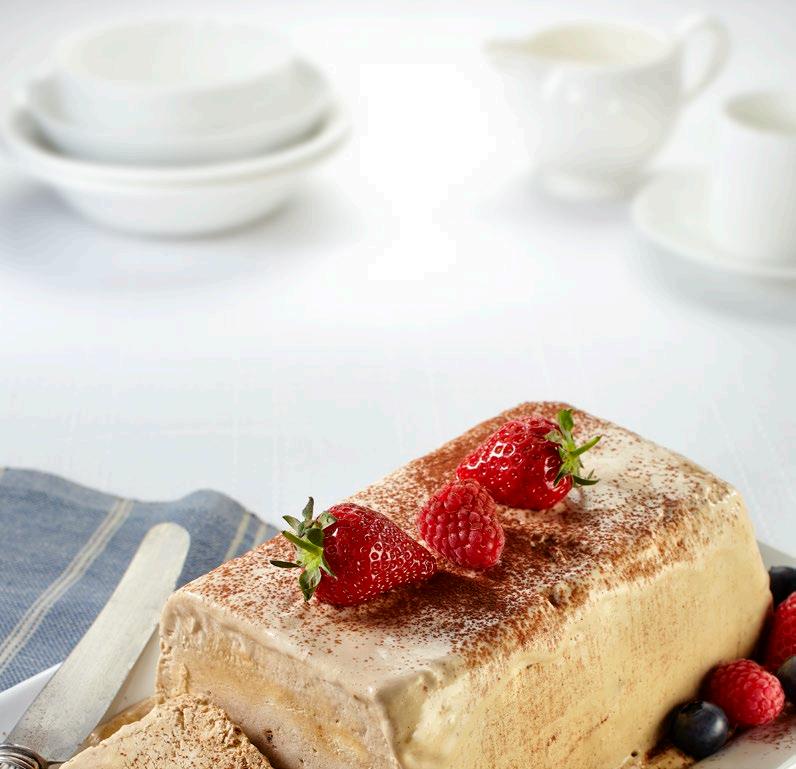
• 2tbsp instant coffee
• 4 eggs, separated
• 400ml cream














Designed to make your life easier when stairs start to become too much, a Stiltz domestic lift will easily fit into any home.
Often chosen as an alternative to cumbersome and unattractive stairlifts, a Stiltz Lift will transport 2 people comfortably so you can transform your life without moving home.
A Stiltz lift is packed with sensors to keep everyone safe, it also plugs straight into a domestic socket, runs very quietly and uses less energy than a toaster!
UNIQUE THRU-FLOOR SYSTEM
• Quick and easy to install
• Advanced safety features
• Small footprint
• Battery back up
• Flexible positioning options
• Wheelchair model available
• 12 month ‘no quibble’ guarantee
• Cost-effective and affordable
• Fast-track delivery available
• Install in a day*


Ilookedatmovingcostsandworkedout thataStiltzLiftwouldbecheaper.Thelift hasalreadymadethingsmucheasier. It’s been the best decision. Ms. Turner, Hereford “ “


Back To Nature
Give your interior an update by bringing the outdoors in and embracing textures, forms and colours inspired by the natural world
Looking to freshen up your décor for summer? Take a leaf out of mother nature’s book and introduce organic touches to create a calm space that feels very connected to the great outdoors. The look is easy to recreate and, depending on your property and budget, can be built up as much or as little as you like.
When it comes to selecting a colour palette, stick to shades that have strong associations with nature. Green tones immediately conjure up images of rolling hills and secluded forests and will give any interior scheme an air of tranquility.
To complete the look, pair this with accents of other botanicalinspired colours, such as pinks, purples and yellows to echo spring

Homes and gardens writer and stylist Cassie Pryce specialises in interior trends and discovering new season shopping
flowers. Motifs of flora and fauna— such as fern leaves or butterflies— can also be worked into the look to give a further nod to nature. Why not source some vintage botanical sketches, or try some flower-pressing at home, for something to hang in glass frames and create an interesting, nature-inspired display?
Natural textures including wood, rattan and jute play a key role in bringing a sense of the outdoors in, and it’s these tactile elements that give a room its depth and character. Consider hanging a wood-effect wallpaper on a feature wall for a statement focal point or restoring original floorboards to show off the raw grain of the wood.
Wooden furniture will blend seamlessly into this look and paintwork can be distressed to give pieces a more weathered and rustic finish. To accessorise, look out for woven rugs and baskets and be sure to introduce plenty of greenery in the form of house plants, faux or fresh, to style up the space.

Serene Spot
Holly double bed, £599; Holly bedside table, £179; jute and chenille woven rug, £109; Capri table lamp, £59; bug print bed set, £49.50; supersoft throws, £29.50; linen cushion, £19.50; small hexagonal lantern, £25; fern in grey pot, £25; small cheese plant in ceramic pot, £19.50, all Marks & Spencer
Kitten Kicks
Experience a little ankle-architecture with the surprisingly wearable new trend for highly designed kitten heels
As a rule, I'm not a follower of trends. But every so often a fresh look inspires me, and this is one of them. Enter the quirky, architectural low heel; kitten heels with an arty twist. These tick every box for me. They make a statement. They're wearable. They slot into my wardrobe. They're comfortable. They work equally well with dresses and trousers. And they're transseasonal, so I can get lots of wear out of them.
What's not to love?
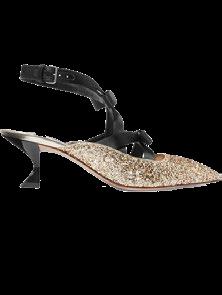
Even if you're not a fan of shouty shoes (and I'm afraid I am), modern architectural kitten-height heels strike just the right balance between subtle and statement. These kitten heels look new to our eyes because we're not used to the unusual shapes (yet). Some look like little sculptures.
Miu Miu, £610Just imagine how well these shoes would update a pair of jeans and a good jumper or t-shirt. Instantly, your outfit looks thoroughly modern, like you made an effort, and didn't just slip on your trusty ballerina flats.

Lisa Lennkh is a banker turned fashion writer, stylist and blogger. Her blog, The Sequinist, focuses on sparkle and statement style for midlife women
As much as I love heels, now I've reached "a certain age", I can't always wear vertiginous ones anymore. But a lower heel isn't just kinder to our backs, knees, and feet… they work exceptionally well with cropped or cuffed jeans, while still looking ladylike with a skirt.
Think of Audrey Hepburn in Breakfast at Tiffany's, the ultimate style icon. What was she wearing? Kitten heels! There's a good reason they're always in favour with the fashion pack; you get an elegant look from the front without the discomfort of a high heel in the back.
Given the sculptural update, kitten heels 2.0 will be a welcome addition to my wardrobe, I'm just having a hard time deciding which ones to choose!
Step Into Structure







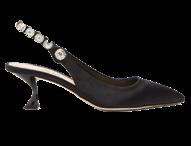
 Mulberry, £435
Jacquemus, £440
Mango, £69.99
Loewe, £625
Loewe, £790
Zara, £79.99
Roger Vivier, £420
Gucci, £805
Mulberry, £435
Jacquemus, £440
Mango, £69.99
Loewe, £625
Loewe, £790
Zara, £79.99
Roger Vivier, £420
Gucci, £805
The Rise of J-Beauty
Korea has long dominated the skincare industry, but there's a new beauty behemoth on the rise, explains our beauty editor, Jenessa Williams
Serious beauty fans will well know the success of Korean beauty. Quirky and innovative, we’ve been blowing our anti-ageing budgets on their peels, masks and serums for years. But as we warm to a more natural way of living, it appears that Korea may have a competitor.
Based on principles of calm and serenity, Japan is focused on natural beauty. With the highest per capita spend on cosmetics in the world, there's plenty to learn from.

With an emphasis on cleansing, Japanese beauty experts are evangelical about making your removal routine last just as long as the application. Ditch exfoliators and opt for gels—they're just as effective but far gentler. Infused with rosemary, ginko and aloe vera, Cure’s Natural Gel sells a bottle every 12 seconds.
Shisedio’s Waso Fresh Jelly Lotion is also a favourite. A watery, parabenfree formula, it achieves a wonderfully dewy effect, perfect for those who suffer from dry skin and visible pores.
It’s not all about the skincare either—J-Beauty is seeing some huge names rise within the realm of make-up. Decorté is known across Japan for its elegant lipsticks, and the collagen-infused mascaras created by Fairydrops are ideal for getting the doll-like lashes coveted in the eastern market. Used sparingly, they can achieve the effects of a professional lash lift, without the salon time. Arigatou!
Hero Products
Cure Natural Gel, £23 for 250ml
Fairydrops Scandal Queen Waterproof Mascara, for 7ml
Shiseido WASO Fresh Jelly Lotion, £24 for 150ml






L’AMANT DOUBLE
A young woman discovers that her lover is concealing a crucial aspect of his identity in this racy French thriller
Director François Ozon sure likes to keep us on our toes; as a follow up to his last film—the clean-cut, black and white historical drama, Frantz—he brings us a sex-fuelled sucker punch of a movie, L’Amant Double. A young, mentally troubled woman, Chloé, falls in love with her therapist, Paul. As their relationship progresses and they move in together, strange things begin to happen. Is Paul really who she thinks he is? Is she just getting a bit paranoid? Or is something truly sinister taking shape behind the scenes?
It’s an incredibly twisty, bold and
graphic thriller that seems to follow only one constant: just when you think it couldn’t get any weirder, it always does. And while it falls back on some overfamiliar, psychological horror tropes (Rosemary’s Baby, anyone?), it does so with such wild abandon that you can’t help but let yourself get lured into its nightmarish madness.
But the true delight here is the actress playing Chloé, Marine Vacth. With words rolling gently off her tongue in silky whispers, her messy, boyish haircut and dainty features, she belongs in a Jean-Luc Godard movie from the 1960s. Not for the faint of heart, but if you like your mysteries dressed in bizarre erotica, this one’s for you (you might want to skip food before you watch it though).
COMEDY: BOOK CLUB
Four women spice up their book club with Fifty Shades of Grey, which has an unexpected effect on their own love lives. What could have been a mindnumbingly boring Hollywood comedy is redeemed here by the formidable leading ladies; Diane Keaton is the ditsy widow Diane, Jane Fonda plays the man-eating businesswoman Vivian, Candice Bergen is the no-nonsense judge Sharon, and Mary Steenburgen is the warm-hearted Carol. Together, they support each other through thick and
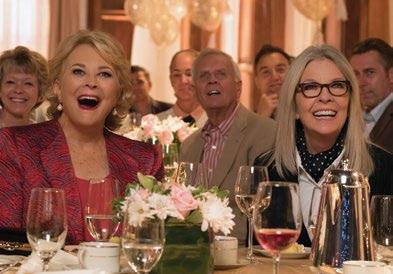
thin, as they all meet or reconnect with the men of their lives with varying results. Expect hearty laughs, witty oneliners and an unpretentiously positive message about love.

DOCUMENTARY: MCQUEEN The story of a boy from an East London council estate who went on to conquer the fashion world. It’s a collection of insightful interviews with those who knew him best, revealing a savagely ambitious, visionary craftsman with a penchant for bawdy jokes and spontaneous shenanigans. With a Greenaway-esque soundtrack and lush costumes filling every frame, it’s one grand affair.
BIOGRAPHY: MY FRIEND DAHMER
A carefully crafted dramatisation of serial killer Jeffrey Dahmer’s early life as a teenager. If you’re familiar with his monstrous murders of the 1970s and 80s, this film will act as a morbidly fascinating prequel, offering a portrait of a deeply troubled young man, struggling with his sexuality, dysfunctional parents and allconsuming loneliness which he tried to supress with alcohol. It’s a worthwhile biopic that’ll make you laugh when you least expect it, have you torn between feelings of sympathy and disgust, and ponder the eternal debate of nature versus nurture.
by Eva Mackevic

THE BRIDGE: SERIES 4 (BBC2)
What is it? The best Scandie crime drama returning for one final run
Where do we join in? With obsessivecompulsive detective Saga Norén (Sofia Helin) in a bad place after her mother’s death, leaving partner/lover Henrik (Thure Lindhardt) to pick up the investigative slack.
Why should I watch it? Creators Hans Rosenfeldt and Camilla Ahlgren are masters of the socially engaged jigsaw puzzle: this series fills in the missing pieces around the fatal stoning of a Danish immigration bigshot.
A VERY ENGLISH SCANDAL (BBC1)
What is it? A three-part adaptation of John Preston’s excellent novel about the Jeremy Thorpe affair, with the newly resurgent Hugh Grant playing Thorpe.
Why should I watch it? If the extraordinary story—Liberal MP from Somerset is accused of plotting a bungled hit on his gay lover—doesn’t grab you, the five-star talent assembled here might. Russell T Davies adapts, the generally dependable Stephen Frears directs, while Ben Whishaw plays Thorpe’s intended victim Norman Scott. Best character? No previews available, but expect Hugh Grant to do something really special with Thorpe’s peculiar mix of high privilege and low cunning.
 by Mike McCahill
by Mike McCahill
WHAT TO STREAM THIS MONTH:
CUNK ON BRITAIN: SERIES 1 (IPLAYER)
A strong month for comedy starts with Charlie Brooker and Diane Morgan’s hilarious send-up of history TV.
FAMALAM: SERIES 1 (IPLAYER) After last year’s funny pilot, this lively, unusually consistent sketch show—featuring Samson Kayo—earns a full four-episode run.
JAMES ACASTER: REPERTOIRE (NETFLIX)
Offbeam stand-up Acaster has always been an original thinker, but these collected specials highlight his superb stagecraft.
ALBUM OF THE MONTH:
GOD’S FAVOURITE CUSTOMER
BY FATHER JOHN MISTYJosh Tillman aka Father John Misty, might be one of the hippest artists around to have on your Spotify right now, but don’t let that put you off giving his latest album a spin. Written in a hotel over a six-week period, God’s Favourite Customer is a melancholic kinship with heartbreak, desperation and the many different faces of love.
First, the record will strike you with FJM’s signature quirky song titles and the cleverly biting lyrics. Then, it’ll seduce you with painstakingly beautiful orchestration, led by splashes of capricious piano chords and effortlessly sumptuous vocal flairs. And finally, it’ll tear your heart right open with unexpected outbursts of gloomy candour, like the gorgeous “Please Don’t Die” in which he sheds his ironic wise man exterior and reveals his aching innards in all their glorious vulnerability.

There’s not a single thing on this album that feels lazy or uncared for. From the quietest tambourine jingle to the most complex melody arrangement, there’s a jawdropping amount of care and deliberation that makes God’s Favourite Customer such a triumph. Trust us, you’ll keep coming back for more.
by Eva MackevicREADER RADAR: CATHERINE TERRY, HOSPITAL RECEPTIONIST
WATCHING: THE CROWN: SERIES 1 AND 2 (NETFLIX)
These two series have been very interesting as they focus on the early years of the Queen’s life and reign.

READING: ALL OF A WINTER’S NIGHT
BY PHIL RICKMAN This spooky crime novel is the latest in the Merrily Watkins series set in the Herefordshire border country. Merrily is a vicar and exorcist.
ONLINE: ANCESTRY.CO.UK
I have had my DNA test results back recently, which I found absolutely fascinating. I have since been working on my family tree.
LISTENING: DODGY BASTARDS BY STEELEYE SPAN
The most recent album by these folk rock legends. Just great to listen to in the car or at home.
June Fiction
Two deliciously snackable summer reads, including a picture of older age and a powerful historical novel
In a Country Garden
by Maeve Haran (Pan, £7.99)Maeve Haran’s latest sees the return of Claudia, Ella, Sal and Laura from her 2014 novel, The Time of Their Lives. Once, they were university friends, swinging their way through the 1960s. Now, they appear to be quite old. So, suggests Claudia, why don’t they set up an “Old Age New Age” commune where they look after each other—and of course have plenty of laughs over bottles of white wine?
At first, it seems as if Haran’s fundamentally celebratory approach to later life might rather uncomfortably recall that letter of complaint Grandpa wrote in The Simpsons (“Dear Advertisers, I am disgusted with the way old people are depicted on television. We are not all vibrant, fun-loving sex maniacs...”). Yet, while the book remains essentially a good-hearted romp, it does sneak in some more thought-provoking stuff as it goes along—about such downsides as illness, loneliness and bossy grown-up children. Haran also makes it clear that looking on the bright side can require effort.

James Walton is a book reviewer and broadcaster, and has written and presented 17 series of the BBC Radio 4 literary quiz
The Write Stuff

In a Country Garden, then, is a novel that its target audience will certainly enjoy—but with just the right amount of grit amid the jolliness.
The Hour of Separation
by Katharine McMahon
(Weindenfeld & Nicolson, £18.99)
Katharine McMahon is a historical novelist who can turn her hand to any period and bring it thrillingly alive. She’s tackled—among other things— the Gunpowder Plot, the French Revolution and the Crimean War. Here, she moves on to the Second World War for very possibly her best and most powerful book so far.

Name the author
At its heart is the cross-Channel relationship between two young women: Christine, from Watford, and the more glamorous Estelle, daughter of a Belgian First World War heroine. The two spend the summer of 1939 on Estelle’s family farm outside Brussels, where their friendship deepens into love. But then the Nazi invasion of Estelle’s homeland takes place and for Christine, back in Britain, the entire war is “reduced to one woman trapped in the petri dish of Belgium”. Happily, the novel itself takes a much wider perspective: providing a brilliant and thoroughly-imagined account not just of Estelle’s resistance activities, but also of the terrifying effect of the German occupation on all aspects of Belgian life. The result is a book that combines individual psychology with world history—and, miraculously enough, is equally good at both. Can you guess the writer from these clues (the fewer you need the better)?
1. A CBE for services to children’s literature, he died a year ago this month, aged 91.
2. Hugh Bonneville has played a character of his called Henry in two hit films.
3. His most famous creation loves marmalade sandwiches.
Answer on p138
Paperbacks
Damaged by Martina Cole (Headline, £7.99).
Britain’s bestselling female crime writer is back with another gripping and sinister tale of a serial killer at large.
The Long Weekend by Adrian Tinniswood (Vintage, £16.99).
The story of an English country house between the wars, told with a winning mixture of solid history and high-class gossip. Beautifully illustrated, too.
Cold Feet: The Lost Years by Carmel Harrington (Hodder, £8.99).
Written with the blessing of the makers of the hugely successful TV show, it reveals what happened to the characters while they were off-screen between 2003 and 2016.
David Bowie by Dylan Jones (Windmill Books, £9.99).
A biography told through interviews with the people who knew him—and widely hailed as definitive.
Munich by Robert Harris (Arrow, £8.99).
Harris once again blends a thriller plot with real events, this time at the 1938 Munich Peace Conference. Highly recommended—including as a Father’s Day present.
RD’S RECOMMENDED READ
Frontline Fatherhood
This Father’s Day, we savour this poignant, funny and perceptive collection of essays exploring the state of being both a father and son
These days, Michael Chabon is well established as one of America’s leading novelists. But, as he explains in the introduction to Pops, back when he was starting out, he received some considered advice from a literary hero of his own about how to have a successful writing career. “Don’t have children,” the great man told him. “That’s it. Do not. You can write great books. Or you can have kids. It’s up to you.”
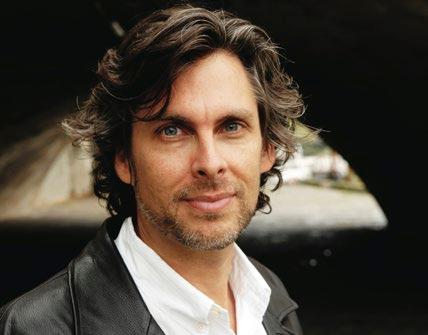
Luckily for both Chabon and us, it was advice he chose to ignore, going on to be a father of four (and to write great books anyway). Luckily for Chabon—because he clearly has no regrets about his decision: “Once
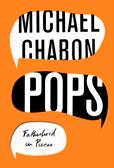
Pops: Fatherhood in Pieces by Michael Chabon is published by Fourth Estate at £10.
they’re written, my books, unlike my children, hold no wonder for me; no mystery resides in them.” Luckily for us—because in the month of Father’s Day, we now have this lovely collection of essays exploring fatherhood from the twin perspectives of being a dad and being a son.
The essays on his children are unfailingly tender, without ever being soppy. They’re also full of that sense of wonder and mystery he mentions in the introduction—not least when he writes with some
significant bafflement about his youngest son’s taste for wildly dandyish clothes. (“What made Abe different was the degree of comfort he felt with being different.”)
Even so, perhaps the best essay of all is the one about his own father, a doctor who, to his awed young son, seemed to know everything—from the genealogies of English kings to every classic movie ever made. A few decades later, though, with Chabon in his fifties, their relationship has inevitably become less central to his life…
At this point, to be honest, being my father’s son is more like a hobby, one of a number of pastimes acquired early, pursued with intensity, laid aside, and only intermittently resumed: origami, cartooning, model-building, being a son. I think of my father at least once every day, try (but fail) to call him once a week, and, as required, afford regular access to his grandchildren. Beyond that, the contours of the job turn vague.
And yet it’s in my capacity as his son that I board a flight to Portland, Oregon, hoping he’s still alive when I get there. The day before yesterday my father fell so ill, so suddenly, that he consented— for the first time that anyone can remember—to being hospitalised. He’s home again for now, but I have been given reason to believe that if I want to see him
Great Literary Dads For Father’s Day
William in Danny, the Champion of the World by Roald Dahl. Although technically a crook, the widowed William is both kindly and a terrific storyteller—always a good sign in Dahl.
Eddard “Ned” Stark in Game of Thrones by George R R Martin. Ned’s world isn’t an easy place to be virtuous in, but he manages it nonetheless. Until, well…let’s not spoil it.
Mr Bennet in Pride and Prejudice by Jane Austen. Like many fathers in a house full of women, Mr B is often bewildered. He’s also far from flawless. Yet he does come through whenever his favourite daughter Lizzie needs him most.
Arthur Weasley in the Harry Potter series by J K Rowling. In the poorbut-noble tradition of Bob Cratchit, Arthur is an ever-loving dad to his seven children—and a much-needed father-substitute for Harry.
Atticus Finch in To Kill a Mockingbird by Harper Lee. Surely the daddy of them all: endlessly wise, decent and generous.
again—and, of course, at the moment, seeing him is all I want to do—I’d better not hesitate. When the plane lands, I take my phone out of airplane mode with a sense of dread, but there’s no fatal text message. I rush from the airport to the apartment.
When I called to say that I would be flying up to see him, my father made the expected but unexpectedly feeble attempt to dismiss my urgency as baseless and my visit as gratuitous, but as soon as I walk into the bedroom, I can tell he is happy to have me there. Although he seems to be out of danger for the time being, he freely acknowledges that he just came very near to death. I lie down beside him on my stepmother’s side of the king-size bed. The flatscreen television on the opposite wall happens to be showing a film I first saw with my father, when I was 11 or 12: Fritz Lang’s Metropolis . Every few minutes my father is racked by spasms of gnarly-sounding coughing that have left his voice a ragged whisper; if he
And the name of the author is…
Michael Bond, the creator of Paddington bear. (And special congratulations if you already knew that Mr Brown’s first name is Henry.)
“I wonder how long it has been since the last time we did this, just lie around in the middle of the afternoon watching a great movie together”
taxes it beyond a sentence or two, whatever he says dissolves into a fit of hacking and gasping for breath. It seems best, therefore, to avoid conversation entirely.
But after a while I find myself thinking about the conversation we aren’t having. I start having it with him in my head…
I wonder how long it has been since the last time we did this, just lie around in the middle of the afternoon watching a great movie together. I decide that the answer is probably something in the neighbourhood of 40 years.
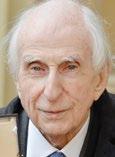
And then, equally unbidden, comes the thought: This is how it will be when he is gone. I will be lying on a bed somewhere, watching some other film that became beloved to me through my father’s own loving intervention, and even though he won’t be there anymore, I will still be watching it with him. I will hear his voice then the way I am hearing it now, in my head.

















THE DANGERS OF DIY FINANCE












Independent financial advice can end up saving you more than it costs, as managing your own money takes time and effort, and the market can be ruthless for the untrained





















In the internet age, financial literacy is an option for anyone. This makes DIY finance – organising your own investments, savings and pension – a tempting prospect. Be warned, however, that a little knowledge is a dangerous thing. Online guidance is not meant to replace professional financial advice, and could do more harm than good. That said, if you’re still tempted to give DIY finance a try, there are a few things to think about before taking the plunge.





Thinking vs feeling



Three heads are better than one







situation, and can support one partner should the other one die. When it comes to DIY finance, however, one partner is typically more involved, creating a risk of confusion should the other be left widowed.

The value of time





Emotional investment patterns are a real danger when managing your own finances. The sunk cost fallacy means you’re unlikely to abandon bad investments quickly enough, while impulsive investments and panic selling are di cult to avoid when there’s a fear of missing out. Professional advisors know how to read the market to make e cient decisions.

For couples, equal knowledge is another consideration. A financial advisor can keep both partners abridged of their financial
FOR MORE INFORMATION

One of the most important considerations is how much you value your time. You’ll save money by not hiring a financial advisor, but you’ll have to put in significant hours researching and managing your finances by yourself. Everyone’s time is worth something, so make sure DIY finance doesn’t end up costing you more than professional advice ever could. ■
Reader’s Digest have partnered with pension and investment experts Flying Colours to help provide you with the most appropriate advice for your circumstances. Flying Colours is committed to making advice more accessible and understandable for UK investors, and CEO Guy Myles answers your general advice questions in his reader newsletter - the Advice Guy @ FlyingColours.
Have a question for Guy? Email: AdviceGuy@flyingcolourswealth.com; or Call 0333 241 9919. To learn more about our pensions experts, please visit Flyingcolourswealth.com.
Books
THAT CHANGED MY LIFE
Sir Antony Beevor is an award-winning military historian. His latest book, Arnhem: The Battle for the Bridges, 1944 is out now, published by Viking
Fathers and Children
BY IVAN TURGENEVI was in the army for five years but it was while spending time at a particularly boring camp in North Wales that I decided, with the innocent arrogance of youth, to become a writer like many of my family before me. This Russian novel provided the perfect lesson on how to write well. Turgenev’s economy of words—while managing to convey mood, smells, tension and even lethargy—is a masterclass.
The Face of Battle
BY JOHN KEEGANJohn Keegan taught military history during
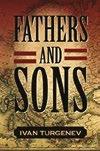

ordinary soldiers’ experience at Agincourt (1415), Waterloo (1815) and The Battle of the Somme (1916). Smoke, confusion, mud and, above all, fear—this was the reality. It had a great influence on my own writing.
Life and Fate
BY VASILY GROSSMAN
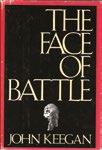
my time at Sandhurst. Some ten years later he published this book and it up-ended all that we were used to reading about warfare. Instead of seeing things from a staff officer’s point of view, Keegan provided a reconstruction of the
Grossman, who spent 1,000 days as a war correspondent during the Second World War, makes a parallel between Nazism and Stalinism in this 1960 novel. The KGB confiscated the manuscripts but a single copy remained hidden in a friend’s dacha. In 1980 it was smuggled out of Russia and published in the West. When I was in Moscow, I came across the notebooks that Grossman kept during that terrible battle. Then, on reading Life and Fate, I was fascinated to see how many of the vivid descriptions were exactly as Grossman had reported in his personal accounts. As told to Caroline Hutton


over 100+ superb products for back pain and an independent lifestyle
Best back help ever - Mrs H, Cumbria
I’ve been using a Backfriend for driving and wouldn’t be without it. It’s given back my joy of driving, which had disappeared in the years I struggled with persistent low back pain.






HOW WRONG CAN I BE - Mr F, Lancs
I purchased one of your Backfriends. When it arrived I thought, this is going to be absolutely useless. How wrong can I be. Before I purchased this I could only drive for about 15 miles. 6 weeks ago I made 2 journeys of over 200 miles each. I cannot thank you enough for making this wonderful device, it has brought back the joys of motoring. Many thanks.
Let’s Get Secure
As more and more companies find themselves in the middle of data breach scandals, it’s important to know how to keep your information secure. Here, Olly Mann offers a few simple steps you can take…
Shops, banks and social media companies have all hit the headlines recently due to data breaches. So, now seems a good time to audit your online privacy. What simple steps can you take to protect your data?
BEEF UP YOUR FACEBOOK SECURITY
Despite the negative publicity, Facebook users can decide how their information is stored. On the desktop version, there’s a little downward arrow, in the top-right corner of the screen. Click that, then

Olly Mann presents Four Thought for BBC Radio 4, and the award-winning podcasts The Modern Mann and Answer Me This!
“Settings,” then “Privacy”—and you’ll find yourself in a zone where you can de-authorise any apps you’ve unknowingly granted access to your social life. You can also, for example, turn off facial recognition, decide whether you’re comfortable for Facebook’s advertisers to target you on the basis of your relationship status, and select which of your posts can be read by people you don’t know.
INSTALL A PRIVATE BROWSER
Chrome’s “Incognito” function prevents your device from storing your search requests. But check the small print: even in Incognito mode, Google themselves track what you’re visiting, and target you with related ads. If you’d rather keep your browsing truly private, the DuckDuckGo Privacy Browser app
(free) features no advertising, and automatically routes you to the most secure version of each website you visit. At the end of a session, tap the “fire” button and your search history goes up in smoke.
USE TWO-FACTOR AUTHENTICATION
Cloud computing is convenient, but if you’ve got oodles of documents and photos up there, consider protecting them with Yubico YubiKey 4 (£39), a USB stick that fits on your key-ring. Affiliated sites including Gmail and Dropbox will then only log you in if you’ve physically docked your key. So, if hackers compromise your passwords, your data still remains off limits.
THINK LIKE A HACKER!
Google yourself. What information have you previously made public that might compromise your security in the future? For example, have you shared you mother’s maiden name, or your dad’s date of birth—common security questions for financial services? Have you posted a photo that reveals the location of your home? Weigh up if you’re keen for all that to be on the public record…


Offer ends 31 May SAVE OVER 50%* Better than
Lasting Powers of Attorney Get your affairs in order
Lasting Powers of Attorney Get your affairs in order Better
There may come a time when you are unable to make decisions for yourself, maybe through illness or injury. If this was to happen, do you know who would make decisions about your care or manage your finances?
It’s important to make your wishes clear in a legal document known as a Lasting Power of Attorney (LPA).
There are two types of LPA - one that covers your health and one that covers your property and wealth.
A Health & Welfare LPA deals with your medical care and can only be used once you become unable to make decisions for yourself.
A Property & Financial Affairs
LPA deals with financial matters, and can be used while you still have full mental capacity, for example if you become frail or immobile.
Mental capacity refers to a person’s ability to make their own decisions. If a person suffers from an illness such as dementia, their ability to make decisions is affected and this is when an LPA is needed.
If you’re married and your partner becomes unable to make decisions, marriage does not give you the authority to make decisions on their behalf - you will only be able to do this if you’re formerly appointed as an
attorney.
Without an LPA, loved ones may not have the final decision on what happens with regards to end-of-life care, and your finances could be frozen while an application to the court is submitted for an attorney to be appointed. Not only can this be extremely costly, but also very time consuming.
Key Retirement have a team of estate-planning specialists who can explain and arrange these documents. They can also offer you a free no-obligation consultation, and recommendation on Wills and Trusts based on your circumstances and legacy objectives.**
To order your FREE guide or speak to one of our experts, please call free on 0808 252 9759 or visit us at www.keyretirement.co.uk
*Normal price £832 (all prices include VAT). Excludes The Office of the Public Guardian registration fee. Products only available in England and Wales. Cannot be combined with any other offer. **No obligation consultation and recommendation on Wills & Trusts based on your circumstances and legacy objectives. Any services you may then choose to instruct will be quoted and charged for.
ARCHIVE
From Our Archive
MARCH 1954
THE NATURAL SUPERIORITY OF MEN
By Jean Pearson“The natural superiority of men is easily recognised by every woman who has spent the best years of her life chasing, snaring, trapping and guarding one of these prize specimens of humanity. She can see it in a thousand ways (and if she can’t, he’ll cheerfully point them out).
Men are tougher. They can overcome incredible weariness to play golf or go fishing.
Men are braver. They do not wince when their women empty mousetraps or spray against cockroaches. They do not fear losing an ear to a fish hook or getting hit by a golf ball.
Men are more frugal. They save money by wearing the same hat for ten years and by not stamping cards.
Men are more objective. They can see your faults much better than you can.
Men are more careful of their health.
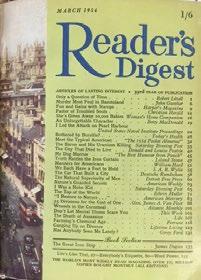
They don’t risk respiratory diseases by cleaning out dusty attics or court colds by washing cement floors in damp basements. When they have a cold they go to bed and never risk a chill by getting up for meals.
Men are more ingenious. They think of dozens of reasons why the carpets shouldn’t be beaten, why washing the car hurts the finish and how the lawn is improved by not mowing it.
Men are more honest. When they are asked to give their honest opinion about a new hat they give it. They also generously give it when not asked.
Men are cleverer. They know how to delegate authority. They let women decide what should be on the shopping list, how the meals should be cooked, how the house should be cleaned, how the children should be disciplined—and then they let them do it.”
You Couldn’t Make It Up
Win £30 for your true, funny stories! Go to readersdigest. co.uk/contact-us or facebook.com/readersdigestuk
MY FRIEND MATT works as a physiotherapist. One afternoon, a man came in with a bad shoulder. Matt assumed it was one of the usual culprits; sports or a DIY mishap.
But when he asked how the gentleman hurt his shoulder, the man replied, “I was walking my dog in a muddy field, and stopped to shake the mud from my shoes unaware I was leaning on an electricity pylon. I was shaking my boots when a lady, in a panic, thought I was being electrocuted and used a huge stick to ‘remove’ me from the pylon.” To say Matt was shocked is an understatement.
CLAIRE KING, HampshireI RECENTLY TOOK MY four-year-old son to the park with his grandparents. It had been raining earlier and the grass was still wet. There’s a short, steep slope we had to walk down and my father slipped and slid all the way to the bottom on his backside.
When he got back on his feet his trousers and jacket were thoroughly smeared with mud and grass stains,
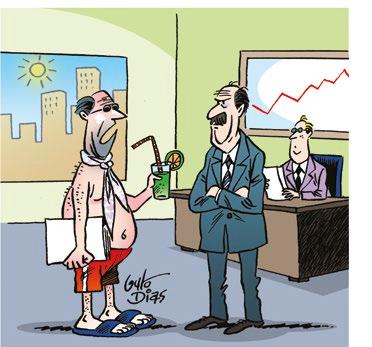
“What do you mean, my summer clothes are not suitable for the office?”
and my little son Peter asked him with polite interest, “Why did you do that, Grandad?”
O’NEILL, NorthumberlandMY SIX-YEAR-OLD grandson Jake always tells me when he learns something new at school that particularly interests him.
Last week he asked me, “Grandma, did you know owls are not turtles?”
It took me a while to figure out
what he meant. It turned out the word was “nocturnal!”
STEPHANIE THOMAS, ClwydWHEN BUYING A NEW shower gel, I always take a quick sniff to check I like the scent. As I can no longer use my arms, my carer kindly opens the bottle and holds it under my nose.
This worked well until a recent trip to the supermarket. I leaned forward to take a good sniff, and much to my surprise a blob of shower gel shot straight up my nose!
My carer had decided to give the bottle a slight squeeze so I could have a stronger smell. Clearly she subscribes to the old adage, "inner cleanliness is next to godliness."
ROSEMARY WRIGHT, SomersetI SENT MY HUSBAND to the supermarket to pick up a few items for me. When he got back I asked if he had managed to get everything on my list.
“Yes,” he replied tentatively, “I found everything apart from the butternut squash. I went up and down the drinks isle three times but they didn’t seem to have any”.
ISABEL AYUBI, NottinghamshireMY FATHER PURCHASED an exercise machine to help him shed some weight. He set it up in his basement but didn’t use it much, so he moved it to the bedroom.
It soon began to gather dust there
too, so he put it in the lounge. A while later I asked how it was going.
“I was right,” he said. “I do get more exercise now. Every time I close the curtains, I have to walk around the machine.” DEMI ROBERTS, Clwyd
I COULDN’T HELP BUT notice that a small boy in my Year One class was not concentrating on anything that I was saying, so I stepped closer in order to have a word with him.
As I approached his table, I overheard him say to the little girl sat opposite him. “You are really beautiful, I can't stop looking at you.”
I realised then why he wasn’t working!
LEONA HEXMAN, DenbighshireI DECIDED TO KEEP my seven-yearold son, Jay, home from school for the day as he had been sick during the night.
About midday, I suddenly heard screams from his bedroom upstairs and rushed up thinking that he must have been sick again.
He looked fine, but he exclaimed, “Netflix stopped working!”
I suppose that counted as an emergency to him!
JEENA SUMMER, LondonI WISH MY MOTHER wouldn’t use autocorrect. I got a message saying, “Your dad and I are going to divorce.”
I called her immediately. It turned out she meant Disneyland.
SALI THOMAS, DenbighshireIt’s never been easier to enjoy the World’s favourite magazine!




YES I want to subscribe to Reader’s Digest Magazine for just £3 for 3 issues (a saving of £8.37 on the shop price of £11.37 based on the cover price of £3.79 per issue). I understand that if I do not wish to continue receiving Reader’s Digest after my first 3 issues I can simply cancel my subscription by contacting customer services. If I do want to continue to subscribe after my first 3 issues I need do nothing and my subscription will automatically be renewed at the low rate of £7.50 for every 3 issues until I decide otherwise.

Word Power
Do you keep your finger on the pulse of world news? If so, recognising these words should be a walk in the park! Test yourself to see how current you are, and then turn the page for answers.
BY EMILY COX & HENRY RATHVON1. amnesty n.—A: treason. B: pardon. C: safe haven.
2. harridan n.—A: brief, wild storm. B: mercenary soldier. C: haggard, old woman.
3. repudiate v.—A: overthrow. B: refuse to accept or support. C: divulge.
4. indict v.—A: point out. B: charge with a crime. C: vote.
5. gentrification n.—A: gender switch. B: uncultured upbringing. C: displacement of the poor by the affluent.
6. sovereignty n.—A: full knowledge. B: supreme power. C: communal state.
7. conflate v.—A: barter or deal. B: ignore. C: confuse or combine into a whole.
8. solipsistic adj.—A: egocentric. B: slick. C: applied to the lips.
9. intransigence n. —A: stubbornness. B: hard travel. C: secret information.
10. subterfuge n. —A: deceptive stratagem. B: underwater dwelling. C: cheap replica.
11. inherent adj. —A: inborn.
B: granted by a will. C: leased for low cost.
12. eponymous adj. —A: unsigned. B: opposite in meaning. C: named for a person.
13. intrepid adj. —A: stumbling. B: unpleasantly hot. C: fearless.
14. sectarian adj. — A: related to a horse. B: of religious factions. C: having six parts.
15. culpable adj. —A: blameworthy. B: likely to happen. C: not competent.
Answers
1. amnesty—[B] pardon. President Obama’s deportation amnesty is a key controversy across the nation.
2. harridan—[C] haggard, old woman. During trial, former Virginia governor Bob McDonnell portrayed his wife as a harridan.
3. repudiate—[B] refuse to accept. After the midterm elections, Senator Paul said, “Tonight is a repudiation of Barack Obama’s policies.”
4. indict—[B] charge with a crime. Darren Wilson was not indicted for the killing of Michael Brown.
5. gentrification—[C] displacement of the poor by the affluent. Spike Lee has denounced the gentrification in neighbourhoods such as Fort Greene.
6. sovereignty—[B] supreme power. Ukraine will not settle its conflicts with Russia until it regains full sovereignty over Crimea.
7. conflate—[C] confuse or combine into a whole.
Newsman Brian Williams doesn’t know what caused him to “conflate one aircraft with another.”
8. solipsistic—[A] highly egocentric. Some view Facebook as a simply solipsistic forum.
9. intransigence—[A] stubbornness. The government shutdown was a display of intransigence, said the Los Angeles Times.
10. subterfuge—[A] deceptive stratagem. Democratic Leader Nancy Pelosi said the Republicans’ intent to sue the president was a “subterfuge.”
11. inherent—[A] inborn. When the Declaration of Independence refers to “unalienable” rights, it is describing the inherent privileges people are entitled to.
12. eponymous—[C] named for a person. Who was the original Oscar behind the eponymous statuette?
13. intrepid—[C] fearless. After “stealing” a block while playing, Prince George was called “very intrepid.”
14. sectarian—[B] of religious factions. The UN has warned of “further sectarian violence” in Iraq.
WORD OF THE DAY*
LETHOLOGICA: inability to recall a word for something
Alternative suggestions:
“The art of fooling people using nonsense logic.”
“The deadly astuteness of Mr Spock.”
15. culpable [A] blameworthy. Oscar Pistorius was found guilty of culpable homicide in South Africa.
VOCABULARY RATINGS
9 & below: Up-to-date
10–12: In the know
13–15: Newshound
Brainteasers
Challenge yourself by solving these puzzles, then check your answers on p154
FOUR-BIDDEN
Place an X or an O in each empty cell of this grid so that there are no four consecutive Xs or Os appearing horizontally, vertically, or diagonally. There’s only one solution. Can you find it?
THE LONG AND THE SHORT OF IT
The current heights of five growing girls—Jane, Juanita, Jasmine, Jin, and Jacqueline—were marked with chalk on a wall, as shown.
Can you figure out which line indicates the height of which girl based on the information that follows?
n Jin is taller than Juanita but shorter than Jane.
n Jacqueline is shorter than Jane and Jasmine but taller than Juanita and Jin.
n Jane is taller than Jasmine.
FAMILY RELATIONS
Carmela receives a text message from an unfamiliar number, so she texts back: “Who is this?”
The strange response: “It’s one of your female relatives. Your mother’s mother is my father’s mother-in-law.” Even assuming that this information is true, it doesn’t help Carmela pinpoint an individual, since there are two relationships it could describe. What are they?
ARITHME-PICK
Place one of the four basic arithmetic operations (+, –, ×, ÷) in each box to make a correct equation. Symbols may be repeated, and you don’t have to use all four. All operations are performed from left to right, ignoring the mathematical order of operations. The result at each step must be a positive whole number. What’s the equation?
MAKE IT WORK
Arrange the whole numbers from 1 to 9 in a three-by-three grid so that all of the following conditions are satisfied:
n The numbers in the right-hand column add up to 7.
n The numbers in the left-hand column add up to 16.
n 3 doesn’t share a row, column, or long diagonal with 1 or 4.
n The numbers in the bottom row add up to 20.
n There is a row that contains only prime numbers.
BRAINTEASERS FOUR-BIDDEN
Brainteasers: Answers
o o o x o x x o
o x x x o o o x
x o o o x x x o
x o o x x x o x
o x x x o x o o
o o o x o o o x
o x o o o x x x
x o o x x x o o
THE LONG AND THE SHORT OF IT
A = Jane. B = Jasmine. C = Jacqueline.
D = Jin. E = Juanita.
FAMILY RELATIONS
Sister or first cousin.
£50 PRIZE QUESTION
Answer published in the July issue
Only one of the sets of five letters below is an anagram of a fiveletter word in the English language. Find the word.
ARITHME-PICK
3 × 6 ÷ 2 + 6 ÷ 5 = 3
The first correct answer we pick in June wins
£50!* Email excerpts@ readersdigest.co.uk
ANSWER TO MAY’S PRIZE QUESTION
MAKE IT WORK
AND THE £50 GOES TO… Sam Pake, Surrey
-Second
Stand-Up
We chatted to the endlessly energetic stand-up comic, Stephen Bailey
WHAT’S THE BEST PART OF YOUR CURRENT SET?
I like all the ad-libbing bits—there’s a lot of talking to the audience and making it relevant to that room. I really like that, it means every show is slightly different.
WHAT INSPIRES YOUR COMEDY?
Anything to do with the North—I had a normal job until I was 28 and I’ve got a lot of those real life situations. People can relate, even if you’ve not worked at a checkout you absolutely have been to a supermarket and you can imagine what the character is like.
DO YOU HAVE ANY FUNNY TALES ABOUT A TIME YOU BOMBED ON STAGE?
I don’t really—touch wood—bomb anymore but in the beginning I was awful. My favourite one was with my comedian friend, Kate. We got wasted by accident and I went on stage so drunk that I fell into the microphone and the stand fell over. I spent four minutes just trying to get the mic up.

WHAT’S YOUR FAVOURITE ONE-LINER?
Oh god, I don’t really do one liners but I do refer to a man’s a***e crack as gay cleavage.
IF YOU WERE A FLY ON THE WALL, WHOSE WALL WOULD YOU BE ON?
Simon Cowell—I find him such a fascinating creature. He’s this millionaire who wears an awful t-shirt and jeans and no one ever manages to style his hair, I’d like to know what’s going on there.
HAVE YOU FOUND ANY PARTS OF THE COUNTRY TO BE FUNNIER THAN OTHERS?
Glasgow, Manchester, Brighton— They were my favourite three because they’re not afraid to let themselves go.
Stephen Bailey brings his show “Our Kid” to the Edinburgh Festival Fringe in August. Visit stephenbaileycomedy.co.uk.
Laugh!
Win £30 for every reader’s joke we publish! Go to readersdigest. co.uk/contact-us or facebook.com/readersdigestuk
YOU CAN ALWAYS tell what the best year of a father’s life was, because they’ll just freeze in that clothing style and ride it out.
COMEDIAN JERRY SEINFELD
DO YOU THINK THAT Thomas the Tank Engine’s name is actually just Thomas Engine, and “the Tank” was a nickname he picked up while he was at university?
“Oh man, here comes Tommy the Tank. Chug ,chug, chug.”
COMEDIAN MICHAEL ROWLAND
IN NURSERY SCHOOL my son had a crush on his nursery teacher, which I think is normal.
I Do, Too!
These hilarious wedding photo-bombers picked their moment perfectly (via sadanduseless.com)
I think just about everybody has a crush on a teacher at some point in their life. For me, it’s my wife’s aerobics teacher.
COMEDIAN BRIAN KILEY
I WANT TO HANG A MAP of all the world in my house, then stick pins into all the locations that I’ve travelled to.
But first, I’m going to have to travel to the top two corners of the world so that the map won’t fall down.
COMEDIAN MITCH HEDBERGJOE ASKED GOD HOW much a penny is worth in heaven.
God replied, “£1,000,000.”
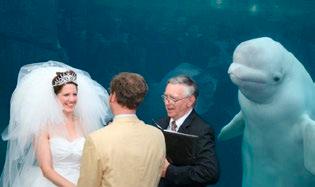
Joe asked, “How long is a minute in heaven?”
God replied, “1,000,000 years.”
Joe asked for a penny.
God said, “Sure, in a minute.”
SEEN ON REDDIT
A MAN WALKS INTO a bar looking frustrated. He explains to the bartender, “I’ve got two horses but I can’t tell them apart. I don’t know if I’m mixing up riding times or feeding them the right foods.” The bartender suggests trimming their tails.
The man says, “That sounds like a good idea, I think I’ll try it.” A few months later, he returns to the bar in worse condition. “I shaved the tail of one of the horses, but it grew back and I can’t tell them apart again!”
The bartender says, “Why don’t you try shaving the mane?”
A few months later the guy is back. “I shaved the mane of one of the horses, but it grew back!”
The bartender yells, “Just measure the dang horses. Perhaps one is slightly taller that the other one?”
The guy storms out of the bar, but

he’s soon back the next day, exclaiming, “It worked, it worked! I measured the horses, and the black one is two inches taller than the white one!”
SEEN ONLINE
I HAVE A POLISH FRIEND who’s a terrific sound technician.
Oh, and I have a Czech one too. Czech one too…
SEEN ON REDDIT
DID YOU HEAR ABOUT those new corduroy pillows?
They’re making headlines.
SEEN ON REDDIT
I’M TRYING TO BECOME a more sensitive lover. I bought a DVD called How to Improve Your Foreplay Technique. It was really good.
I had to fast forward through the boring bit at the beginning though, obviously. I mean, I don’t know why they bothered with that.
COMEDIAN GARY DELANEYWHAT IS AN OPTIMISTIC vampire’s drink of choice?
B positive! PAUL WILLIAMS, Yorkshire

Drunk Tank
People take to Twitter to reveal the consequences of having one too many:
@EllenMLaurie: “I stole a girl’s birthday crown, went to another bar, and made everybody there buy me birthday drinks.”
@AhskidMoore: “My roommate found me passed out on the kitchen floor. The microwave was open and I was clutching three raw hot dogs.”
@Jordan_White_4: “I drunk ordered a taxi and the driver texted me, ‘I’m here for you.’
I replied, ‘OMG that is so sweet of you.’ “
@FoggyDew1310: “I came home at 4am and showed my dad my ID at the front door of the house. I thought it was another bar.”
I READ A STUDY THAT said that owning a dog can make you ten years younger.
My first thought was to rescue two more puppies, but I don’t want to go through menopause again.
COMEDIAN JOAN RIVERSTHE DIETING TERM “hidden calories” always sounds like a Brussels Sprout makes the journey to your stomach, pulls off its face and crows, “I was cake! I was cake the whole time!”
COMEDIAN APARNA NANCHERLAIT’S THE WORLD CUP FINAL, and a man makes his way to his seat right next to the pitch. He sits down, noticing the seat next to him is empty. He leans over and asks his neighbour if someone will be sitting there. “No,” says the neighbour. “The seat is empty.”
“This is incredible,” said the man. “Who in their right mind wouldn’t use a seat like this?”
The neighbour says, “Well, actually, the seat belongs to me. I was supposed to come with my wife, but she passed away. This is the first World Cup Final we haven’t been to together since we got married.”
“Oh, I’m so sorry to hear that. That’s terrible… But couldn’t you find someone else, a friend, relative or even a neighbour to take her seat?” The man shakes his head.
“No,” he says. “They’re all at the funeral.”
SEEN ONLINE
Beat the Cartoonist!

Think of a witty caption for this cartoon—the three best suggestions, along with the cartoonist’s original, will be posted on our website in midJune. If your entry gets the most votes, you’ll win £100. Submit to captions@readersdigest.co.uk or online at readersdigest.co.uk/caption by June 8. We’ll announce the winner in our August issue.
April’s Winner
Our cartoonist crashed and burned this month with his caption: “You’re over training that dog Richard.” He failed to win over the popular vote, and so this month’s crown goes to our reader Paul Gillon, who won this month’s competition with an impressive 53 per cent of the votes. His clever caption: “He’s a dog for all seasons” got you all voting. Congratulations Paul, very well played.
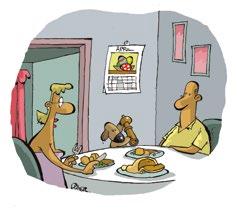

Interview:
Rupert Everett
The actor turned director discusses his biggest passion project

Brian Blessed
The beloved actor, writer and presenter reminisces about his life and career
• FAMILIAR FACES: Meet the man who never forgets a face
• LAS VEGAS: Beyond the strip


